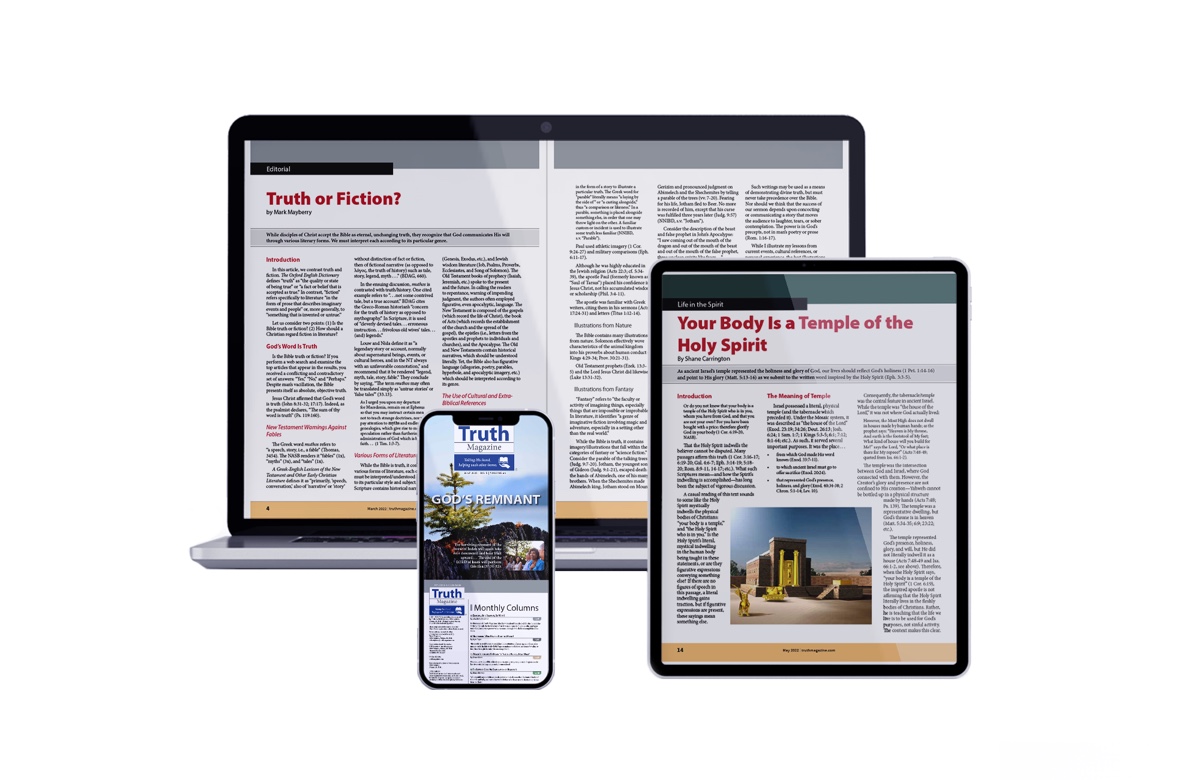
(February, 2024 | No. 2 | Vol. 68)
2/1/2024

Truth Magazine (ISSN 1538-0793) is published once a month by Truth Publications, Inc., 220 S. Marion, Athens, AL 35611. Postage paid at Decatur, AL, and additional mailing offices.
© 2023 Truth Publications, Inc. All Rights Reserved.
Manuscripts should be sent to the editor, Mark Mayberry, at mark@truthpublications.com. Link.
Subscriptions, renewals & other correspondence should be sent to: Truth Magazine, 220 S. Marion, Athens, AL 35611 or by emailing us at subscriptions@truthmagazine.com. Link.
Book orders should be sent to: CEI Bookstore | truthbooks.com | Street Address: 220 S. Marion, Athens, AL 35611 | Phone: (855) 492-6657 | Email: sales@truthbooks.com Link.
Online Website: truthmagazine.com
DISCLAIMER: Books in ads are screened, but an ad does not mean unqualified endorsement. All books should be tested by Scripture. We appreciate readers notifying us if they find some glaring fault in ads.
By Mark Mayberry
Synopsis: Conservative jurists follow an “originalist” approach toward the Constitution in the United States, while liberals view it as a “living” document subject to reinterpretation based on current dogma. Progressive “Christianity” adopts a similar approach toward the Bible. Those who embrace such thinking allow their understanding of Christianity to evolve according contemporary norms.
First, let us define “progressive” and consider its meaning in both the political and religious context.
Merriam-Webster’s Collegiate Dictionary defines the adjective as “(1) of, relating to, or characterized by progress, making use of or interested in new ideas, findings, or opportunities. . . (2) of, relating to, or characterized by progression; (3) moving forward or onward: ADVANCING; (4) increasing in extent or severity, such as a progressive disease. . . (5) often capitalized: of or relating to political Progressives. . .”
Conservative jurists adhere to an “originalist” approach to the Constitution, while liberals view it as a “living” document, subject to continual reinterpretation based upon current dogma. Originalists affirm that the Constitution should be interpreted strictly according to how it would have been understood by the Framers. They believe that the original meaning of constitutional texts can be discerned from the document itself, along with language tools such as dictionaries, grammars, and by consulting other legal documents from which the text might be borrowed.
Originalism stands in stark contrast with the concept that the constitutions should be interpreted as a living document. Political progressives reject the idea that a constitutional system created in the eighteenth century should remain authoritative nearly 250 years later. Living constitutionalists believe that the meaning of the constitutional text changes over time, as social attitudes change, even without the adoption of a formal constitutional amendment pursuant to Article V of the Constitution.
The same basic assumptions impact the discussion of religious progressives.
Who are religious progressives? What is “progressive” Christianity?
In its more advanced forms, Progressive Christianity may be defined as follows:
This is a post-liberal theological movement within Christianity that seeks to reform the faith via the insights of post-modernism and a reclaiming of the truth beyond the verifiable historicity and factuality of the passages in the Bible by affirming the truths within the stories that may not have actually happened. Progressive Christians have a deep belief in the centrality of the instruction to “love one another” within the teachings of Jesus Christ. They focus on promoting values such as compassion, justice, mercy, and tolerance, often through political activism (Bing CoPilot).
The movement claims to be unaffiliated with a political party or ideology, but seeks to foster a deeper understanding of the Christian faith and its role in society. Nevertheless, political and religious progressives usually march in lockstep. Both systems involve a radical reinterpretation of the underlying relevant systems of authority, namely, the U.S. Constitution, and the Holy Bible.
Sometimes, Christians start down this path without realizing where it will end. They have been indoctrinated to oppose pattern theology, traditionalism, perfectionism, and a Pharisaic approach to faith. Instead of recognizing that there is, indeed, a pattern for the work, worship, and organization of the church, and seeking to conform to the biblical standard, they adopt the inclusive language of progressivism, without acknowledging their evolving mindset (at least in the early stages). The progressive mindset inevitably leads to broad-based cultural accommodation, and an increasing tolerance for doctrinal error.
So, in the cultural arena, if a person self-identifies as a “Purple-Headed-Puppy” and their chosen pronouns are “It/That,” I must refer to them accordingly, or be condemned as unloving and judged guilty of having committed a thought/speech crime. In the spiritual arena, if a person manifests an increasing tolerance for doctrinal error, I am at fault for pointing out his digression and warning others about it.
In reflecting on the history of “Progressive” Christianity, consider the impact of this thinking upon churches and institutions associated with the Restoration Movement in the nineteenth and twentieth centuries, and also today.
Advocates of Progressive Christianity adopt the prevailing theology of the broader religious world. In the division that affected the Lord’s church in the 1850s, this led to the adoption of the instrument and the missionary society—which were part and parcel of dominant Protestant culture of the nineteenth century. In the division that affected the church in the 1950s, this resulted in the adoption of an institutional mindset toward the work of evangelism (centralized support through sponsoring churches), edification (church support of educational institutions), and benevolence (church support of benevolent institutions)—which reflected the centralized, hierarchal, top-down-management-style approach that dominated all aspects of society in the mid-twentieth century.
In the twenty-first century, advocates of Progressive Christianity are adopting the practices and preaching associated with contemporary evangelicalism—namely, they echo Calvinistic concepts—emphasizing man’s inability to obey God and focusing exclusively upon divine grace. In later stages, proponents of Progressive Christianity adopt the view that man is perfectible, and redefine the concept of sin. Establishing an earthly paradise (i.e., creating a terrestrial utopia) supersedes the biblical emphasis upon an eternal, celestial home of the soul.
Over time, the leftward drift of progressive mindset becomes ever more pronounced. The sundering of the restoration movement in the nineteenth century initially resulted in a division between the Christian Church (on the left) and Churches of Christ (on the right). However, the leaven of progressive thinking continued to spread, leading the liberal wing of the Disciples movement to ultimately embrace the unitarian/universalist mindset. The sundering of the restoration movement in the twentieth century initially resulted in a division between the institutional churches of Christ (on the left) and non-institutional churches of Christ (on the right). However, the leaven of progressive thinking continued to spread, leading a large segment of the church to embrace the contemporary evangelical model.
Progressive Christianity is difficult to recognize because it uses biblical language, but gives familiar words a whole new meaning. Its proponents flow with societal norms, leading them to remove biblical boundaries on sexuality, gender roles and responsibilities, etc. Proponents also reimagine the church so that it fits in the broader evangelical culture. Progressive Christianity advocates often deny core doctrines of “the faith,” which leads them to promote a “different gospel.” Eventually, they argue that the Bible records what ancient peoples believed about God, rather than being the inspired and authoritative word of God.
Two vital questions come to mind: (1) Can we understand the Bible? (2) Can we understand it alike? God created men and women as creatures of intelligence who can understand His revealed will. Searching for “intelligent” or “intelligence” in the NASB yields twenty-two results in eleven verses. For example, Abigail, who eventually became David’s wife, is described as one who was “intelligent and beautiful in appearance” (1 Sam. 25:2-3). When Job’s friends stopped being silently supportive and became verbally abusive, Zophar rebuked the suffering patriarch—accusing him of being boastful and dishonest, and inferred that if Job disagreed, he was stupid (Job 11:7-12). In response, Job defended himself: “But I have intelligence as well as you; I am not inferior to you. And who does not know such things as these?” (Job 12:3). Contrasting the wise and the foolish, Solomon said, “The mind of the intelligent seeks knowledge, but the mouth of fools feeds on folly” (Prov. 15:14). Daniel and his friends were chosen to serve in Nebuchadnezzar’s court because of their noble lineage, physical appearance, and intellectual abilities (Dan. 1:3-4; 17-20). Jesus commended the thoughtful scribe who (in contrast with his fellows) answered intelligently, by saying, “You are not far from the kingdom of God” (Mark 12:28-34).
What is the common meaning of “intelligence”? Intelligence is a complex and multifaceted concept that can be variously defined. One definition is: “Intelligence is the ability to learn, understand, reason, and solve problems in different domains of knowledge and activity.” This description captures some of the key aspects of intelligence, such as learning from experience, applying knowledge to new situations, and using logic and creativity to overcome challenges. However, it does not specify how intelligence is measured, what factors influence it, or how it varies across individuals, groups, cultures, and species (Bing CoPilot).
What is the biblical meaning of “intelligence?” The Greek word sunetos, derived from suniēmi (to set together, figuratively, to understand), identifies one who is “intelligent” (4908). Arndt defines the word and its root as “pertaining to being able to understand with discernment, intelligent, sagacious, wise, with good sense” (BDAG, 970). Occurring four times in four verses (Matt. 11:25; Luke 10:21; Acts 13:7; 1 Cor. 1:19), it is rendered “clever” (1x), “intelligence” (1x), and “intelligent” (2x) in the NASB.
Arndt says the aforementioned root word means “to have an intelligent grasp of something that challenges one’s thinking or practice, understand, comprehend something” (BDAG, 972). Occurring twenty-seven times in twenty-five verses, it is rendered “gained. . . insight” (1x), “understand” (17x), “understanding” (1x), “understands” (2x), and “understood” (5x) in the NASB. Clearly, God expects us to understand and obey His word.
We commonly use computers to communicate with other humans through email, text messaging, video conferencing, posting to social media platforms, using specialized discussion forums, newsgroups, etc. However, how does one communicate with a computer? That is more challenging!
While modern computing devices possess great processing power, they are not intelligent—at least in comparison with human comprehension. Computers cannot deal with ambiguity, which makes it difficult for them to understand human languages. We communicate in various languages, such as English, German, Spanish, etc. At their most basic level, computers use binary code to communicate internally in machine language. Binary code is a system of representing data using only two digits: 1 and 0. These digits correspond to the electrical signals that computers understand and manipulate. The most common way of communicating with computers is to use programs that are written in some highly structured programing language, but these are often difficult to learn. Command shells are also useful because they provide a rigid grammar (with commands, variables, conditions, etc.) and can be understood by both humans and computers. By using a terminal command shell, a knowledgeable user can give instructions to computers that are 100% unambiguous, which allows the computer to act on them (cf. Bart Busschots, “Taming the Terminal” Podcast).
Sacred Scripture declares that God made man in His own image and likeness: not physically, but intellectually and spiritually—if we are renewed in real knowledge and conform to His righteousness (Gen. 1:27; 5:1; 1 Cor. 11:7; Eph. 4:23-24; Col. 3:10).
God created man in His own image, in the image of God He created him; male and female He created them (Gen. 1:27).
This is the book of the generations of Adam. In the day when God created man, He made him in the likeness of God (Gen. 5:1).
For a man ought not to have his head covered, since he is the image and glory of God; but the woman is the glory of man (1 Cor. 11:7).
And put on the new self, which in the likeness of God has been created in righteousness and holiness of the truth (Eph. 4:23-24).
And have put on the new self who is being renewed to a true knowledge according to the image of the One who created him (Col. 3:10).
Sometimes men and women have difficulty understanding each other. Both are human and share many similarities; however, their differences can make communication difficult. Thus we (jokingly) say: “Men are from Mars while women are from Venus.”
How can God Almighty (who is omniscient, omnipotent, and omnipresent) communicate with mortal man (who is limited in knowledge and power, and whose existence is constrained by time and space)? His comprehension is infinite, while ours is finite. How is the gap to be bridged?
Recall the aforementioned analogy: Computers are binary (i.e., communicating in ones and zeros), while we speak in human languages. Yet, the communication gap can be bridged by using a structured computer language that can be understood by computers and humans.
In like manner, God has communicated with mankind in a manner that we can understand. In creating men and women in His image, God granted us intelligence and the gift of language. God spoke. Inspired apostles and prophets recorded His message. Sacred Scripture contains the communication tools that humans commonly employ—commands, examples, and inferences. The ability to make inferences and draw conclusions is a defining characteristic of higher intelligence. While the blinking command prompt on a computer terminal cannot deal with ambiguity, we handle such challenges every day.
When Paul and Barnabas journeyed to the island of Cyprus on their first missionary journey and reached Salamis, they encountered Sergius Paulus (the proconsul, described as “a man of intelligence [sunetos]”) and Elymas (a corrupt and deceitful magician). The former was submissive, while the latter was subversive; one recognized truth, while the other rejected it (Acts 13:6-12).
Sometimes human wisdom blinds those who are intelligent from recognizing the value of Sacred Scripture (1 Cor. 1:18-31). Recently, Joyce Carol Oates, an American writer who has published fifty-eight novels, a number of plays and novellas, and many volumes of short stories, poetry, and non-fiction, interjected herself into an online discussion of the need for Christians to be concerned with the plight of widows, orphans, and prisoners, by declaring:
The bible, as you call it, is a work of fiction; or rather, an anthology of fictions. It is not ‘the’ bible for much of the world’s population & those who claim it as their own select those verses that appeal to them while ignoring other verses. Fertile ground for hypocrisy.
Spiritual understanding is hidden from those who are defiant and disorderly (Matt. 11:20-24), but open to those who are receptive and obedient: Jesus said, “I praise You, Father, Lord of heaven and earth, that You have hidden these things from the wise and intelligent and have revealed them to infants. Yes, Father, for this way was well-pleasing in Your sight” (Matt. 11:25-30, esp. v. 25-26; cf. Luke 10:21).
Why did Jesus speak in parables? To reveal divine truth to those who were seeking to know God, and to hide truth from those who are not (Matt. 13:10-17). Individuals that Jesus likened to the wayside hear God’s word but do not understand: “When anyone hears the word of the kingdom and does not understand it, the evil one comes and snatches away what has been sown in his heart. This is the one on whom seed was sown beside the road” (vv. 18-19). However, those who possess good and honest hearts will hear and understand: “The one on whom seed was sown on the good soil, this is the man who hears the word and understands it; who indeed bears fruit and brings forth, some a hundredfold, some sixty, and some thirty” (v. 23).
At the end of this long discourse, in which Jesus taught in parables, He said: “Have you understood all these things?” They said to Him, “Yes.” Jesus replied, saying, “Therefore every scribe who has become a disciple of the kingdom of heaven is like a head of a household, who brings out of his treasure things new and old” (Matt. 13:51-52).
On one occasion, the Pharisees and scribes criticized Jesus, saying: “Why do Your disciples break the tradition of the elders? For they do not wash their hands when they eat bread” (Matt. 15:2). After rebuking them for elevating human tradition above divine instruction, Jesus called the crowd to Him and said, “Hear and understand. It is not what enters into the mouth that defiles the man, but what proceeds out of the mouth, this defiles the man” (Matt. 15:10-11).
Matthew 16 begins with another adversarial encounter with the Pharisees and Sadducees, who came up, and testing Jesus, asked Him to show them a sign from heaven. He replied by saying,
When it is evening, you say, “It will be fair weather, for the sky is red.” And in the morning, “There will be a storm today, for the sky is red and threatening.” Do you know how to discern the appearance of the sky, but cannot discern the signs of the times? An evil and adulterous generation seeks after a sign; and a sign will not be given it, except the sign of Jonah (Matt. 16:2-4).
Departing from there, Jesus and His disciples came to the other side of Gennesaret, but they had forgotten to bring bread. Recapping the previous encounter, Jesus said to them, “Watch out and beware of the leaven of the Pharisees and Sadducees” (Matt. 16:6). They misunderstood His statement, assuming that it was connected with their failure to bring provisions on the trip. Jesus, aware of this, said:
You men of little faith, why do you discuss among yourselves that you have no bread? Do you not yet understand or remember the five loaves of the five thousand, and how many baskets full you picked up? Or the seven loaves of the four thousand, and how many large baskets full you picked up? How is it that you do not understand that I did not speak to you concerning bread? But beware of the leaven of the Pharisees and Sadducees (Matt. 16:8-11).
Afterward, they finally put the pieces together: “Then they understood that He did not say to beware of the leaven of bread, but of the teaching of the Pharisees and Sadducees” (Matt. 16:12).
On the mount of transfiguration, Jesus’s face radiated glory, shining like the sun, and His garments became as white as light. Moses and Elijah appeared to them, talking with Him. Afterwards, as they were coming down from the mountain, His disciples asked, “Why then do the scribes say that Elijah must come first?” He answered and said,
Elijah is coming and will restore all things; but I say to you that Elijah already came, and they did not recognize him, but did to him whatever they wished. So also the Son of Man is going to suffer at their hands (Matt. 17:11-12).
Despite knowing the prophecy of Malachi (4:5-6), and having listened to Jesus’s previous discussion of John the Baptist (Matt. 11:7-15), in which He explicitly said, “John himself is Elijah,” they did not comprehend His words. . . until that very moment: “Then the disciples understood that He had spoken to them about John the Baptist” (Matt. 17:13).
May we recognize the dangers associated with adopting a progressive religious mindset. Let us acknowledge the authority of Sacred Scripture and seek to understand and acknowledge God’s divine pattern to our collective and individual activities. While spiritual blindness is characteristic of lost humanity (Rom. 3:11), if men turn to the Lord, they can comprehend and be converted (Rom. 15:21).
False teachers by definition are dishonest—not only with others but also with themselves: “deceiving and being deceived” (2 Tim. 3:13) and are, therefore, “without understanding” (2 Cor. 10:12). In contrast, let us heed the admonition that the aged apostle gave to young Timothy:
You, however, continue in the things you have learned and become convinced of, knowing from whom you have learned them, and that from childhood you have known the sacred writings which are able to give you the wisdom that leads to salvation through faith which is in Christ Jesus. All Scripture is inspired by God and profitable for teaching, for reproof, for correction, for training in righteousness; so that the man of God may be adequate, equipped for every good work (2 Tim. 3:14-17).
If we genuinely seek to know God, so as to find Him and obey His will (Acts 17:22), true knowledge and spiritual understanding is within our grasp (Eph. 5:17).
[The Lord desires] that they would seek God, if perhaps they might grope for Him and find Him, though He is not far from each one of us (Acts 17:27).
So then do not be foolish, but understand what the will of the Lord is (Eph. 5:17).
Arndt, William, et al. A Greek-English Lexicon of the New Testament and Other Early Christian Literature (BDAG). Chicago, IL: University of Chicago Press, 2000.
Merriam-Webster’s Collegiate Dictionary. Springfield, MA: Merriam-Webster, 1996.
Thomas, Robert L. New American Standard Hebrew-Aramaic and Greek Dictionaries: Updated Edition. Anaheim, CA: Foundation Publications, Inc., 1998.
Mark Mayberry has labored with the Adoue Street church of Christ in Alvin, TX, since 1998, where he serves as the evangelist and an elder. The church website is here. His website is here. He can be reached here.





By Kyle Pope
Synopsis: Christians should demonstrate an openness to all who are willing to come to faith in Christ, but far too often, we isolate ourselves to only those with whom we feel comfortable. How can Christians avoid the problem of cliquishness?
A common criticism leveled against congregations by visitors, new members, or even those who have become dissatisfied with their identification with a particular local church is the charge that it practices “cliquishness.” A clique is “a small, exclusive group of friends or associates” (American Heritage Dictionary of the English Language). The word clique is a French word that can refer to a “set,” a “gang,” or “party,” but it is derived from the Old French verb cliquer meaning “to click, make a noise” (The Concise Dictionary of English Etymology). This word is what grammarians call an onomatopoeia—i.e. a word that sounds like what it means. The clicking and noise of a group of people chattering is imitated in the name of the group—it is a clique. This image is still seen in its modern French usage in the fact that a drum or bugle band can be called a clique.
The reason the charge of “cliquishness” is leveled at churches has less to do with the sound the group makes than it does its treatment of others. Those outside of a clique can feel as if they are excluded or unwelcomed into a group that isolates itself. When there are various cliques, competition may develop between people who don’t get along with each other in order to secure the loyalty of others to their clique before another group “gets them.” This kind of social tug-of-war happens regularly among school children, but sadly, far too many congregations of God’s people have fallen victim to the same pettiness that is seen on an elementary school playground.
Scripture doesn’t use any equivalent of the word clique, but it addresses the problem of cliquishness. In rebuking the Corinthians for their divisiveness as one group among them would say “I am of Paul,” while another said, “I am of Apollos” (1 Cor. 1:12), Paul asked “Is Christ divided?” (1 Cor. 1:13). The relationship of those in Christ is to be a unique bond. In the Lord’s church, age, race, social class, nationality, or any of the other things that normally divide people should disappear. In Christ, “There is neither Jew nor Greek, there is neither slave nor free, there is neither male nor female, for you are all one in Christ Jesus” (Gal. 3:28). The Holy Spirit commands Christians not to show “partiality” (NKJV), “personal favoritism” (NASB), or “respect of persons” (Jas. 2:1, KJV), even offering an example of how this could be done toward one who visits an assembly (Jas. 2:2-3). To act with favoritism is to act as “judges with evil thoughts” (Jas. 2:4) and to “commit sin” (Jas. 2:9). Instead, in the church, “there should be no schism in the body,” instead “the members should have the same care for one another” (1 Cor. 12:25). How can Christians avoid the perception of cliquishness?
All of us are naturally drawn to those with whom it is easy for us to talk or to those who share our interests and personalities. In the church, however, our bond must transcend these mere material concerns. There will be plenty of time to get together with friends and talk to those to whom we feel close, but as you visit with your friends or family, ask yourself—“have I spoken to anyone today with whom I have not spoken in a while?” Look around and see who is standing alone. Are there those who don’t seem to fit in? Have you spoken to a visitor or a new member recently? What about that older person? What about the young? Break those generational barriers and go talk to them! Are there those who don’t have someone talking to them? Don’t just take the easy course and talk to the same people you always talk to—reach out and let someone you haven’t spoken to as often know you are interested in him.
I know of a congregation who once had some members request that the elders offer a class in a particular way. The elders did so, but a little differently than had been requested. Dissatisfied with that, the members hosted their own exclusive study (by invitation only) but did not invite any of the elders or their family. That not only showed a lack of respect for the eldership, but it contributed to the perception that the congregation was cliquish. Certainly, few members have homes large enough to host all members of a congregation, but parties, social functions, or even Bible studies that involve some members while excluding others are naturally prone to make some people feel isolated and unwelcomed.
Solomon admonished, “A man who has friends must himself be friendly” (Prov. 18:24, NKJV). The Jewish commentator A. Cohen explains that the Hebrew phrase “must himself be friendly,” is derived from two roots with virtually the same meaning: (1) “to act as companions one to another” or (2) “to break one another” (Socino Books of the Bible: Proverbs, 123). Before the twentieth century, most translators understood this proverb in the first sense—“to be friendly.” Since the translation of the American Standard Version (1901) most modern translations take this in the second sense “a man of many companions may come to ruin” (ESV). Both translations are true to the context and grammar of the passage.
As a preacher, I have tried over the years to avoid any perception that I am cliquish. I usually try to visit with everyone a little bit and avoid talking for long periods of time with any one person or group. If I am not careful, this could leave the unintended impression that I am distant or unapproachable. That’s not what I want to communicate either! When people feel isolated, it may be because others have been cliquish, or it may be because they have been unwilling to be friendly to others. If we act unwilling to talk to others, if we leave the building as soon as the closing prayer is over, if we show no interest in the lives of others, we might well isolate ourselves.
As brothers and sisters in Christ, we must be “kindly affectionate to one another with brotherly love” (Rom. 12:10). If there are ways we have failed to do this in the past, let’s commit ourselves to demonstrate this loving spirit from this day forward.
Kyle Pope preaches for the Vestavia church of Christ in Vestavia Hills, AL. He has written several books published by Truth Publications. Go here for more information. The church website is here. He can be reached here.





By Bette Wolfgang
Synopsis: Elijah, a prophet of God, confronted the evil king Ahab and his wife Jezebel, who worshipped Baal. In challenging the prophets of Baal, he provoked Jezebel’s wrath and fled for his life. However, God strengthened and sustained Elijah—physically, emotionally, and spiritually.
Elijah the Tishbite was a man chosen by God to prophesy for Him during the reign of king Ahab and his wife, Jezebel (daughter of the Sidonian king, Ethbaal). Ahab was seen by God, who knows the hearts of all His human creatures, to be the most evil of all kings of Israel to that time, and Jezebel’s name has become a synonym for the term “super-evil”—an apt description.
Elijah apparently made no excuses and began his exceedingly difficult task. God’s care and grace for His prophet can strengthen our own faith as we consult the story in 1 Kings 17-19. During the drought that Elijah had predicted, God, with His fatherly knowledge, understanding, and concern, provided him with food delivered by ravens and water from a stream, reviving his ability to go to his next assignment: to minister to, and be administered to, by a widow. She had a young son for whom she was caring. What little provisions she had were insufficient, but the three of them were provided for miraculously for many days by God’s gift.
Yet, after some time, her son died, and she (in her own human reaction to such a loss, like many today), blamed Elijah, saying, “Oh man of God, you have come to me to bring my sin to remembrance, and to put my son to death!” Elijah replied, “Bring your son to me,” carried the dead boy to his own room, lay down on him, and prayed, saying, “Oh Lord, my God, I pray thee, let this child’s life return to him”—and the child revived. Elijah took the child to his mother, whose response was to profess her new and sure belief that Elijah, in fact, was a man of God, and that “the word of the Lord in your mouth is the truth” (17:24).
After many days, in the third year of the drought, God spoke to Elijah, saying “Show yourself to Ahab,” and “I will send rain on the earth” (18:1). Obadiah, the trusted servant over the king’s house, was carrying out Ahab’s instructions when he met Elijah. Though expressing fear for his own life, as a believer in God, he did what Elijah told him, despite Obadiah’s terror of Ahab. Obadiah went to Ahab and thus Ahab went to meet Elijah. Ahab accused Elijah of being “the troubler of Israel”—but Elijah identified Ahab as the real troubler of Israel, because Ahab had forsaken the Lord’s commandments and followed Baal.
Elijah told the king to call Israel, the 450 prophets of Baal, and the 400 prophets of the Asherah who ate at Jezebel’s table, to gather at Mt. Carmel. Elijah was obviously testing the power of Baal against the power of Jehovah. The prophets of Baal followed Elijah’s instruction: to call on the name of Baal, which they did for hours. As they continued to fail, Elijah mocked them and Baal’s lack of responsiveness. Elijah called all the Israelites to come and witness his sacrifice. Meanwhile, he continued to make his altar harder and harder to light with fire—even to drowning the whole offering and altar with water, ordering three times the amount of water which filled the trench around the altar and sacrifice on it. He prayed to the Lord God, calling on the name of the Lord, who responded with a conflagration of fire which devoured the entire altar and the sacrifice.
Nothing was left. Elijah’s prayer to God was to thank Him for turning the Israelites’ hearts back to Him with His unsurpassable power. He then instructed the Israelites to seize all the 400 prophets of Baal to be slain at the brook Kishon. Elijah then went to the top of Mt. Carmel, where the sky darkened, and a heavy rain ended the drought. The hand of the Lord was on Elijah, who then outran Ahab back to Jezreel. When Ahab told Jezebel all that had occurred, including the killing of the prophets of Baal, she, in her rage, plotted Elijah’s murder, vowing to make him like one of the prophets of Baal by the next day.
Running for his life, Elijah was depleted of energy and in despair. The physical and emotional effects on the human body caused by severe stressors, both physical and mental, were overwhelming. Fleeing (literally) for his life, Elijah suffered from exhaustion, extreme hunger, sleeplessness, anxiety, and depression. These symptoms involve the body, mind, and will to such an extent that Elijah wished for death. At Beersheba, he left his servant, going alone for another day into the wilderness, praying that the Lord would take his life. The angel of the Lord came to Elijah, touched him, and presented him with food and water. “He went in the strength of those provisions forty days and forty nights to Horeb, the mountain of God” (19:8)—where Moses had also met with God on the mountain.
There God appeared to him in the wind, earthquake, and—though God was not in the wind, earthquake, or fire. When God inquired, “What are you doing here, Elijah?” he replied, “I have been very zealous for the Lord” reporting: “The sons of Israel have forsaken the covenant” and killed the prophets of the Lord. At the very mountain where Moses had spent forty days and forty nights when God gave the tablets of the covenant (Exod. 24:12-18), Elijah now comes dejectedly to report that Israel has broken the covenant. Elijah’s journey from Mount Carmel to Mount Horeb may remind those who read discerningly of the later appearance of Elijah and Moses with the Lord Jesus Christ Himself on another mountain—the Mount of Transfiguration.
Elijah’s claim that he alone remained of those serving the Lord may have been one more symptom of the depression he surely must have felt. Yet, his feelings, which seemed so real to him, were not reality. God revealed that there were 7,000 who had not bowed the knee to Baal—and then commissioned him future tasks to be accomplished in God’s name. God has more for Elijah to do—and Elijah has a new purpose to continue his life! Like Moses, he leaves Mt. Horeb refreshed to lead the nation of Israel, anointing kings and prophets (18:15-19).
The Lord knew Elijah’s heart. Elijah had heeded his heavenly Father’s call and experienced that relationship as His chosen vessel through that time of an evil king and the atrocities of Ahab’s wife, Jezebel. Through Elijah’s work for the Lord, he performed despite real and terrifying dangers.
Elijah also provides for all believers thereafter an example of the zeal and concentrated effort for our Lord to the limits of human ability. Running literally for his life, with severe exhaustion, hunger, sleepless deprivation, and anxiety. In our day, all of those symptoms have been shown to be consistent with severe depression, which can explain why Elijah requested that the Lord take his life.
Since God created all humans, He knew the “treatment” for depression: Sleep, eating to provide the strength needed, and a “vacation” from the stressors he was facing. (This is not to argue that, besides these remedies, those who have access to modern anti-depressants should neglect to take them under medical supervision.)
Elijah loved, respected, and honored his Lord and obeyed His will for him; Elijah’s one purpose was to serve him with obedient faith above all with zeal and bravery, no matter the risks! Jehovah manifested love for Elijah, counteracting his understandable bouts with depression and restoring him to full service, and ultimately providing a “chariot of fire” to take him to heaven in a whirlwind (2 Kings 2:11).
A question for each person who lives arises from this narrative of Elijah’s life: What is my purpose for my life? What is my number one goal?
We will not perform God’s will perfectly, and likely not with as much notable service, historically, as did Elijah. We may have our own demanding responsibilities in our lives, but our service for the Lord must be first in each life in order to be pleasing to God, as Elijah’s was. He and Moses were the only ones present with Jesus in the Transfiguration.
Two women—the widow and the evil queen Jezebel—each had effects on Elijah’s life. The widow grew into full belief about the one true God, while Jezebel became the embodiment of pure evil! As women, our strong belief in the Lord must also be first in our lives, as it was with Elijah. The faithful in Scripture includes both women and men, as we were all created in His image. God requires of us, as His image-bearers, the same faith as Elijah, Moses, and His Son, Jesus! God Himself listened and knew Elijah’s concerns—as He will to all who love and obey Him!
Bette Wolfgang is retired from a thirty-year career as a board-certified psychologist. She and her husband, Steve, worship with the Downers Grove church in the western suburbs of Chicago, IL. She can be reached here.



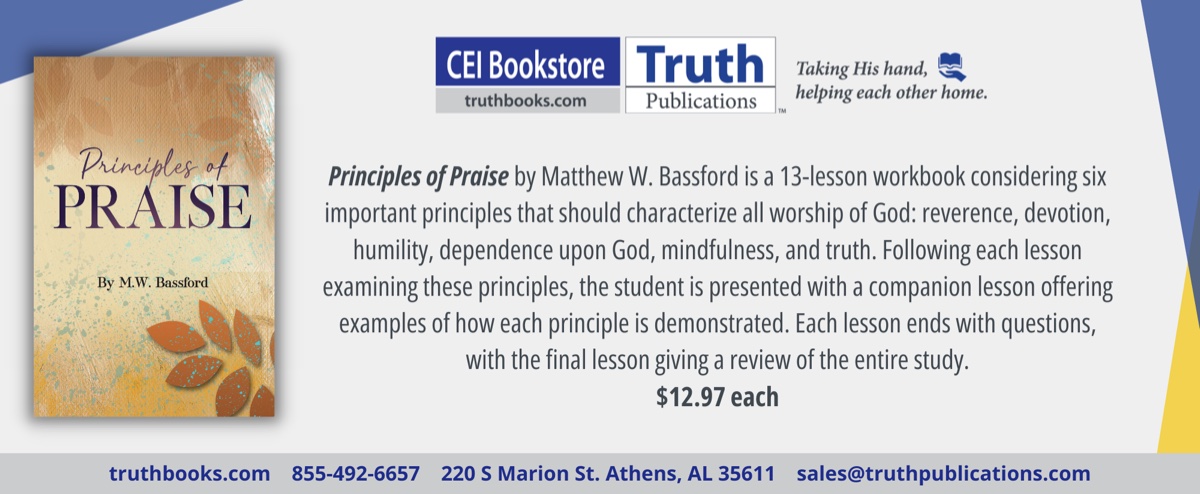

By Bruce Reeves
Synopsis: Only those who believe in, and love Jesus will allow the adversity of trials and loss to refine their faith into the resulting “praise and glory and honor at the revelation of Jesus Christ” (1 Pet. 1:6-9).
Contentment is a highly prized and yet somewhat elusive virtue. Though it comes only from being rightly related to God, people search for it where it cannot be found. They may seek it in possessions, power, prestige, relationships, jobs, or freedom from difficulties. The contentment of Christ is an inward, quiet, gracious frame of spirit, which freely submits to and delights in God’s wisdom.
When John the Baptist was asked about manifesting true repentance, he mentioned contentment with their wages (Luke 3:14). Paul wrote to Timothy regarding the subject of contentment, “If we have food and covering, with these we shall be content” (1 Tim. 6:8). The Hebrew writer encourages us to trust in the Lord’s promises and to be free from the love of money (Heb. 13:5). Again, Paul emphasized that godliness is accompanied by contentment (1 Tim. 6:6). In his commentary, The Epistle to the Philippians, F. B. Meyer commented on this period in Paul’s life:
How different was the great apostle! Though deprived of every comfort, and cast as a lonely man on the shores of the great strange metropolis, with every movement of his hand clanking a fetter, and nothing before him but the lion’s mouth or the sword, he speaks serenely of contentment (Meyer, 242).
Yet we see nothing but joyful contentment and tranquility of the soul. We will notice four principles of contentment in this section of Scripture.
Even while in prison, Paul said, “I rejoiced in the Lord greatly, that now at last you have revived your concern for me; indeed, you were concerned before, but you lacked opportunity” (Phil. 4:10). The apostle had not given up on the Philippians even though before Epaphroditus had arrived with their last gift to him, it had been some time since he had received help from them. Faith in God’s providential care for His children will allay anxiety and lead us on a path of trust in the Lord. He was joyful regarding their love for him.
The term “flourished again” in the King James Version is an excellent translation of the word. It is an agricultural term describing a plant flowering again. Paul is saying that their concern and loving care for him had blossomed or flourished again in the giving of the gift. He does not accuse them of negligence but clarifies that they had “lacked the opportunity” and now had supported him again (Phil. 4:10). It was not time to panic or try to take matters into his own hands. Rather, Paul faithfully labored in Christ’s kingdom for God’s glory. The same providence that would use Paul’s imprisonment to further the gospel would result in the gospel being spread through the Philippians’ support of their brother (Phil. 4:10; cf. 1:12-19). Just as the Lord’s providence can be seen in the lives of Joseph and Esther, it can also be seen in the life of Paul. What a wonderful lesson for us to learn! Don’t panic, but rejoice!
The fulfillment we enjoy in Christ is not based on circumstances. While this sounds counterintuitive, God’s grace brings about a reality that transcends this world. Paul writes, “Not that I speak from want, for I have learned to be content in whatever circumstances I am” (Phil. 4:11). Paul’s rejoicing was not merely over the gift itself, but their godly heart (Phil. 4:17; 1 Tim. 6:6-12). The word “content” in this verse refers to the idea of “self-sufficiency.” Paul refers to a sufficiency that is provided in and by Christ (2 Cor. 9:8; 12:9). The context defines our sufficiency as being reliant on Jesus when Paul writes, “I can do all things through Christ who strengthens me” (Phil. 4:13). The contentment we have in Christ must be learned and the only way to learn it is having to get along with “humble means” (Phil. 4:12). The school of experience teaches us some lasting spiritual truths about being a disciple. It is interesting how foreign Paul’s teaching is from the “health and wealth gospel” that is taught in many denominations today by popular men such as Joel Osteen, T. D. Jakes, and Creflo Dollar.
Paul had learned how to get along with difficult and abasing circumstances. Writing to the Corinthians, who were filled with a competitive and carnal spirit, he said:
For who regards you as superior? What do you have that you did not receive? And if you did receive it, why do you boast as if you had not received it. . . For I think, God has exhibited us apostles last of all, as men condemned to death; because we have become a spectacle to the world both to angels and to men. . . to this present hour, we are both hungry and thirsty, and are poorly clothed, and are roughly treated, and are homeless; and we toil, working with our own hands; when we are reviled, we bless; when we are persecuted, we endure; when we are slandered, we try to conciliate; we have become as the scum of the world, the dregs of all things, even until now (1 Cor. 4:7, 9, 11-13).
“Some do not know how to descend without slipping, slipping into doubt, fear and sin” (Weaver, 233). Only those who believe in, and love Jesus will allow the adversity of trials and loss to refine their faith into the resulting “praise and glory and honor at the revelation of Jesus Christ” (1 Pet. 1:6-9).
Not only must we learn to be content in times of want but also in times of prosperity. The history of Israel declares the need for us to learn to live in dependence on God in times of blessing. This has been a tremendous challenge for Christians living in America. Materialism, a sense of entitlement, and fleshly attitudes can overtake our reliance on the Lord and run against a true sense of faithful trust in God. When we are enjoying an abundance of material blessings, we must keep our focus on the Lord’s will rather than ours. If our circumstances dictate the level of our faith, zeal, and obedience, who is in control of our lives? The world! When our joy, peace, and contentment are grounded in Christ, rather than our external conditions, then and then alone, we will have surrendered ourselves to the purposes of our King. Thus, Paul proclaims, “My God will supply all your needs according to His riches in glory in Christ Jesus. Now to our God and Father be the glory forever and ever. Amen” (Phil. 4:19-20).
“In any and every circumstance I have learned the secret of being filled and going hungry, both of having abundance and suffering need” (Phil. 4:12). We are to be filled with the peace of God regardless of the situation or circumstance in which we may find ourselves as God’s people. The phrase translated as “I am instructed” is from a word that refers to being initiated into religious mysteries only known in the divine realm. Through dependence on Christ in every circumstance, we can come to appreciate God’s unchanging and eternal wisdom. How many people live in luxurious abundance and yet never experience peace and contentment?
The Christian has an eternal foundation in the divine power, adequacy, and sufficiency of Jesus Christ. Paul victoriously proclaims, “I can do all things through Christ who strengthens me” (Phil. 4:13). The phrase “all things” is obviously limited by its context to the spiritual riches of Christ (Phil. 4:19; cf. Eph. 3:16-21). “The strength of His might” enables us to “stand firm against the schemes of the devil” in our battle against the “spiritual forces of wickedness in the heavenly places” (Eph. 6:10-13). When Paul says, “I can do all things through Christ who strengthens me,” it is in the context of having contentment in times of abundance and suffering. “I can do” refers to the spiritual resources we have in our relationship with God. The power of Christ is prevailing, overpowering, and effective (Isa. 40:29-31). We can only say “I can do all things through Christ” when we realize “without Him we can nothing” (John 15:5; 2 Cor. 12:7-10). There is no quick fix or shortcut to contentment. It requires steadfast faith in Christ, sacrificial discipleship, and full assurance of the Lord’s grace and faithfulness (2 Tim. 4:17-18).
Paul expresses appreciation for the Philippians’ gift a second time in verses 14-16, followed again by a clarification in verse 17. Not only were they his fellow-participants in the gospel but also through their gift, they were sharing in his afflictions (Phil. 1:3; 4:14). Their deep concern and support of the apostle had been shared even in his distress and imprisonment. In writing to Timothy, Paul wrote, “Therefore do not be ashamed of the testimony of our Lord or of me His prisoner, but join with me in suffering for the gospel according to the power of God” (2 Tim. 1:8). We will not find contentment in a selfish life, but in a sacrificial spirit. The church at Philippi reflected the attitude and example of Jesus in their support of the preaching of the gospel under fire (Phil. 1:27-29; 2:5-8).
Paul reminds the Philippians that as he was to leave Macedonia, they were the only ones who shared with him in giving and receiving (Phil. 4:15). There is no room for the argument some brethren have made for the sponsoring church arrangement from other congregations through the church at Philippi. Paul clarifies that in the earlier times, Philippi was the only congregation supporting him financially. While Philippi may have been included in the plurality of churches that directly sent funds to Paul later, the time Paul references in the verse under consideration makes it clear that initially the church at Philippi was the only congregation supporting him (2 Cor. 11:8-9; Phil. 4:15). We have no pattern in the New Testament of churches pooling funds together in a sponsoring church arrangement, but of congregations directly sending funds to preachers and teachers. Church history teaches us that the centralization of local church organizationally or financially leads down a devastating path of apostasy. The simple way the church in Philippi joined with Paul in the work of preaching the gospel was through directly sending support to him. There was no sponsoring church or missionary society. The brethren raised the funds and sent it directly to the apostle and God’s people should follow the same pattern today. When brethren become dissatisfied with the pattern of God’s arrangement—small steps in altering the pattern eventually become giant strides in apostasy.
Paul encouraged the Philippians to understand that he was not coveting their gifts, but the fruit of their work in the kingdom (Phil. 4:17). The financial sharing was expressive of their spiritual fellowship in the gospel (Rom. 15:27). The richness of the descriptions of the support of the gospel is quite uplifting. The first expression, “a fragrant aroma,” references the Old Testament allusions to a sacrifice acceptable to God (Gen. 8:20-21; cf. Lev. 1:9, 13, 17). The same expression is used of Christ who “gave Himself up for us, an offering and a sacrifice to God as a fragrant aroma” (Eph. 5:2). The phrase “fragrant aroma” suggests that God is pleased with the persons making the offerings, not merely the sacrifices themselves. Paul saw himself as being “poured out as a drink offering upon the sacrifice and service of your faith” (Phil. 2:17). Living our lives for the Lord is our living sacrifice to God (Rom. 12:1; Heb. 13:15; 1 Pet. 2:5).
Philippians is an epistle that we never tire of studying. The heart of the book is the heart of Jesus Christ in the lives of His people. Having this attitude in our hearts should be our ultimate goal. As we put the mind of Christ into our own hearts, we will have a focused, submissive, spiritual, and joyful mind. Let us hear Paul’s tender encouragement to faithfulness: “Therefore, my beloved brethren whom I long to see, my joy and crown, in this way stand firm in the Lord, my beloved” (Phil. 4:1).
Weaver, Walton. Truth Commentaries: Philippians. Bowling Green: Guardian of Truth Publishing Co., 1996.
Meyer, Frederick Brotherton (F.B.). The Epistle to the Philippians—A Devotional Commentary. London, England: The Religious Tract Society, 1905, 1912.
Bruce Reeves has labored with the Highway 65 church of Christ in Conway, AR, since 2000. He and his wife, Rachel, have one child. The church website is here. He can be reached here.





By Shane Carrington
Synopsis: The perfect sacrifice of Jesus sharpens our focus toward spiritual truths, strengthening us as we fight against trials, temptations, and sin in this world.
One struggle after another seems to be our common lot as we endure this life. We feel the weight of our burdens as we raise children, work to provide, battle health concerns, interact with humans in various arenas, and wrestle with the thoughts inside our own minds. We tend to complain about worldly problems, but we also have deeper, more serious distresses.
In the midst of this, we get distracted from focusing on the sacrifice of Jesus and His love displayed on the cross. We allow lesser considerations to weaken our resolve to serve Him and others. Frankly, like Israel of old, we are blessed so bountifully that our prosperity can be our greatest temptation (Deut. 6:10-12; 1 Tim. 6:9-10). “Fixing our eyes on Jesus” (Heb. 12:2, NASB) helps us to live in hope and peace, no matter what earthly trials we face. His love draws us deeper into service and higher toward heaven as we navigate trials and temptations. His sacrifice forgives us—and strengthens us. That is how Paul wrote from prison, “Rejoice in the Lord always” (Phil. 4:4), and that is how many modern disciples radiate the light of the Lord, even through startling diagnoses and impending death.
Sacrifice gets a lot of attention in the Old Testament. These offerings were never the focal point (Heb. 10:1-4); rather, they were designed to direct attention toward Jesus, the ultimate sacrifice (Heb. 10:5-10), and the eternal hope that He provides.
The book of Hebrews contrasts the Mosaic system with the Gospel of Jesus, declaring to us many important differences. Here are a few:
Shadow versus Substance (Heb. 10:1; cf. Col. 3:16-17)
Sacrifice as Reminder versus Ultimate Redemption (Heb. 10:1-9)
Daily Sacrifices versus Supreme Sacrifice (Heb. 10:10-14)
Preparatory Covenant versus Final Covenant (Heb. 10:8-10)
Tablets of Stone versus Written “Upon Their Heart” (Heb. 10:16; cf. 2 Cor. 3:1-3)
Consequently, relying upon the Old Testament system for a covenantal relationship with God today is like relying upon a temporary measure designed to give way to Jesus and His gospel (Gal. 3:23-29). Jesus has come, so now we move on to His gospel!
As seen in the list above, Jesus provided the perfect sacrifice and covenant. Consider how this blessing strengthens us in this fallen world.
First, people lost in sin do not have the strength to overcome their predicament (Rom. 5:6-11). Through the sacrifice of Jesus, God’s grace is shed upon us. With this in mind, we can understand that the foundation of our justification is “through the offering of the body of Jesus once for all” (Heb. 10:10), who “offered one sacrifice for sins for all time” (Heb. 10:12).
“Therefore, brethren, since we have confidence to enter the holy place by the blood of Jesus, by a new and living way which He inaugurated for us through the veil, that is, His flesh, and since we have a great priest over the house of God, let us draw near with a sincere heart in full assurance of faith, having our hearts sprinkled clean from an evil conscience and our bodies washed with pure water. Let us hold fast the confession of our hope without wavering, for He who promised is faithful” (Heb. 10:19-23).
While there is much to unpack in these verses, consider the following points about our redemption through His blood:
We approach “the holy place” (i.e., heaven [Heb. 4:14-16]) through Jesus’s sacrifice (Heb. 10:19), which is the groundwork of our redemption.
Jesus “inaugurated” the new covenant through “His flesh” (Heb. 10:19-20), that is, by His sacrificial death.
As our “great high priest” (Heb. 10:21), He gives us access to heaven (“let us draw near”). God accepts us, and God hears us, because Jesus gives us the opportunity to approach heaven.
We can approach God with a “sincere heart in full assurance of faith” because “our hearts” were “sprinkled clean from an evil conscience”—a spiritual transformation that occurs when “our bodies (were) washed with pure water” (Heb. 10:22, which is baptism [Acts 22:16; 1 Pet. 3:21]).
As we deal with the problem of our transgressions against God and His law (i.e., sin, [1 John 3:4-5]), Jesus gives us an opportunity that we could not have without Him (Rom. 5:6-11). In this fallen world, where temptation and sin have many strongholds, Jesus equips us to overcome.
Further, we read in Hebrews 4:14-16,
“Therefore, since we have a great high priest who has passed through the heavens, Jesus the Son of God, let us hold fast our confession. For we do not have a high priest who cannot sympathize with our weaknesses, but One who has been tempted in all things as we are, yet without sin. Therefore, let us draw near with confidence to the throne of grace, so that we may receive mercy and find grace to help in time of need” (Heb. 4:14-16).
Temptation and sin are two of the enemy’s primary weapons to assault our faith. We must remember that our earthly trials also contribute to the enemy’s cause in this fight (1 Pet. 5:6-10). We get sick, suffer earthly rejection for our faith, face family problems, lose a job, etc. and these physical crises present us with spiritual conflicts. We need to focus on the sacrifice of Jesus to overcome all temptations and sins!
Jesus provides us with many tools to equip us in this fight, some of which are in Hebrews 10. Making good use of the following blessings strengthens us to live in hope.
Assemble with fellow disciples (Heb. 10:24-25). God put us together in local congregations, and He designed assemblies of worship to help “stimulate one another to love and good deeds.” The focus in these two verses is Christ-like sacrificial love on our part toward others, not their responsibility toward us. Each of us must do his part, regardless of what others do. As we assemble together with a servant spirit, we grow each other to be more like Jesus, cleansed by His sacrifice, and strengthening each other to reflect Him more fully.
Continual “confession of our hope” (Heb. 10:22). Confession is both verbal (Rom. 10:9-10) and actual. “Confession” can also be translated as “profession,” and as followers of Jesus, we should profess, by godly living, what we confess with our mouths to believe. Living in the light of the cross helps us grow in faithful service to Him.
Warnings about weakening (Heb. 10:26-39). God’s grace comes in many forms, one of which is His honesty about what happens if we lack endurance (Heb. 10:36) and shrink back from Him (Heb. 10:38). Living a life where “we go on sinning willfully” (Heb. 10:26), even though we have become Christians, puts us in a grave spiritual condition. The writer uses graphic terms to describe this. In an unrepentant state, we lose access to the redeeming work of Jesus: “there no longer remains a sacrifice for sins” (Heb. 10:26, 29). We subject ourselves to “a terrifying expectation of judgment and the fury of a fire which will consume the adversaries” (Heb. 10:27), in which we will experience the ultimate vengeance of God (Heb. 10:30-31).
God’s grace, manifested in sending His Son as the sacrifice to redeem and transform us, gives us great hope if we focus on His love, example, and words.
We face many harsh realities in this life, and our burdens become difficult to bear. However, the sacrifice of Jesus provides us with access to forgiveness when we sin and proper focus through which He can strengthen us no matter what trials may tempt us. “Let us draw near with a sincere heart in full assurance of faith” (Heb. 10:22) every day and in every way, and He will lead us home.
Shane Carrington has labored with the Southside church of Christ in Sulphur Springs, TX, since 1999. He has two children. The church website is here. He can be reached here.



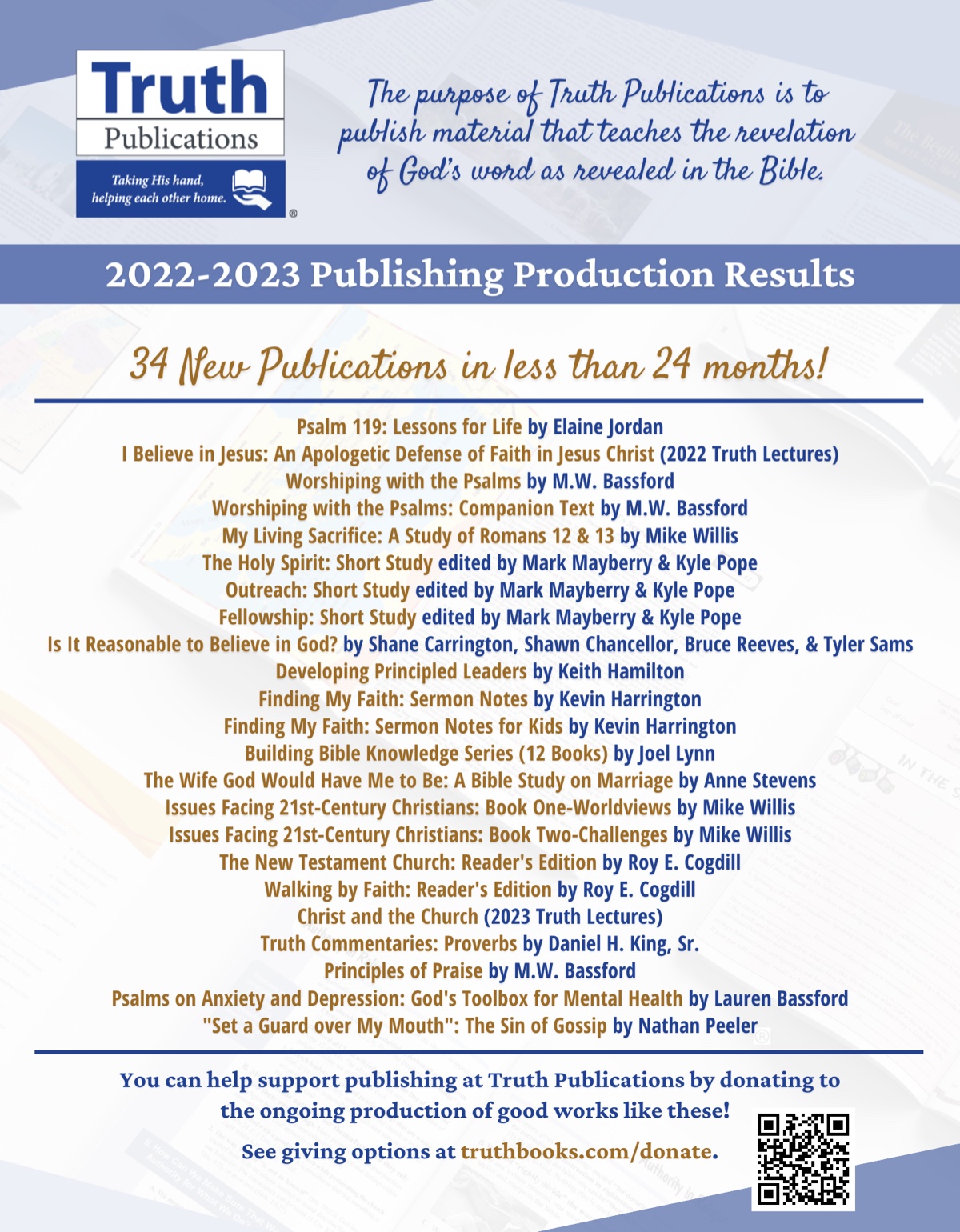


By Bobby L. Graham
Synopsis: In answering a question about instrumental music, brother Graham discusses the difference between personal opinion and biblical doctrine. He emphasizes the clarity of the New Testament teaching: Christians are to sing praises in worship—plucking their heartstrings, not an instrument.
What is your opinion about instrumental music?
Though I think I understand what the questioner has in mind in the phrasing of this question, I want to deal with the matter of opinion as I begin to answer. An opinion means one’s personal judgment or view about something. There are sometimes as many opinions as there are individuals, and no one opinion is necessarily better than the rest. In a free land each person is entitled to an opinion, but people sometimes confuse civil liberty with relationship to God. Entitlement does not work in relationship to God, because His thinking and ways are vastly superior to ours (Isa. 55:8-9). In such matters, we must be content to “think God’s thoughts after Him.” He is God; we are not! He is Master; we are servants! He is the ship’s captain; we are privileged to ride and work on it as underling shipmates!
My opinion concerning the use of instruments in worship to God counts for nothing (2 Cor. 4:5; 10:12). God’s will in the matter counts for everything (1 Cor. 4:6; l Pet. 4:11). My opinion results from studying the Bible, not merely consulting my own preferences. It is Bible-based. We must learn what His will is and submit to it.
Many insist on David’s use of the harp under another covenant as justification for their use of such. Despite his use of the instrument or the encouragement to use such (Ps. 150), the New Testament instructs the Christian to sing and make melody in his heart to the Lord, the heart being the only instrument in acceptable worship (Eph. 5:19; Col. 3:16). David psallo’ed (plucked) his harp, but every Christian must psallo his kardia (heart).The covenant of Moses included carnal ordinances, types/shadows of the real/true coming under the new covenant of Christ (Col. 2:17; Heb. 10:1). To remain with the old covenant is to content oneself with the shadow and to miss the reality. We ask for New Testament authority for the use of mechanical instruments of music in worship to God. Where is that teaching found? If it can be produced, then we should all practice it and stop condemning its use. If it cannot be found, then all should omit its use to please the Lord, which is the very essence of worship. Will you rely on New Testament teaching for your faith and practice?
Other arguments are employed in support of instrumental music in New Testament worship, such as its occurrence in heaven in the Book of Revelation. This approach ignores the figurative/symbolic nature of the language in Revelation, as well as the presence of other things in heaven which have no place in our worship. John heard the sound of many waters, loud thunder, and harpists playing their harps (Rev. 14:1-3). If we justify the harp for this reason, we must also justify the sound like a waterfall (sound effects). Before you know it, we have begun entertaining ourselves, not worshiping God. These have their figurative presence in John’s description of what he heard in order to emphasize the praise being given to God in an environment of reverence for Him.
Like offering animal sacrifices, Sabbath observance, burning of incense, Catholic Mass, baby dedication, washing of feet, and “Christian” rock concerts in worship, instrumental music has no place in New Testament worship. It is a humanly invented practice, what Paul describes as “will worship” (“self-imposed religion” in the NKJB) in Colossians 2:23. From the first-recorded worship of Cain and Abel in Genesis 4, God has never permitted humans to originate their own way of worshiping Him. Only in worship, according to divine prescription and regulation, can God be glorified (Lev. 10:3). There has ever been a distinction between the holy (what God sanctified for our use) and the common (all else, not sanctified by God).
Use of instruments in worship was never part of New Testament churches in the first century or later centuries until Pope Vitalian introduced them in the late 600s. Protestants were much later in introducing them.
John Calvin, who was wrong about grace, election, predestination, and total depravity, got it right on this matter:
Musical instruments in celebrating the praises of God would be no more suitable than the burning of incense, the lighting of lamps, and the restoration of the other shadows of the law. The Papists, therefore, have foolishly borrowed this, as well as many other things from the Jews. Men who are fond of outward pomp may delight in that noise; but the simplicity which God recommends to us by the apostles is far more pleasing to Him.
Alexander Campbell, in his fight against the instrument in worship, wrote in his Millennial Harbinger (Vol. I, No. 1, pp. 581-582):
So to those who have no real devotion or spirituality in them, and whose animal nature flags under the oppression of church service, I think. . . that instrumental music would be not only a desideratum, but an essential prerequisite to fire up their souls to even animal devotion. But I presume, to all spiritually minded Christians, such aids would be as a cowbell in a concert.
J. W. McGarvey said in his Biblical Criticism (p. 116):
And if any man who is a preacher believes that the apostle teaches the use of instrumental music in the church, by enjoining the singing of psalms, he is one of those smatterers in Greek who can believe anything that he wishes to believe. When the wish is father to the thought, correct exegesis is like water on a duck’s back.
Calvin, John. “John Calvin on Musical Instruments in Worship: Commentary on Psalm 33:2.” (1557) Reformed Books Online. Online Version.
Campbell, Alexander. “Instrumental Music.” Millennial Harbinger, September 1851 (pp. 581-2). Online Version.
McGarvey, John William (J.W.). Short Essays in Biblical Criticism. Reprinted from the Christian Standard, 1893-1904; Cincinnati, OH: The Standard Publishing Company, 1910. Online Version.
Bobby L. Graham actively participates in fill-in preaching, Belize trips, teaching an hour each day at Athens Bible School, and in gospel meeting work. He and his wife, Karen, have three children. He can be reached here.



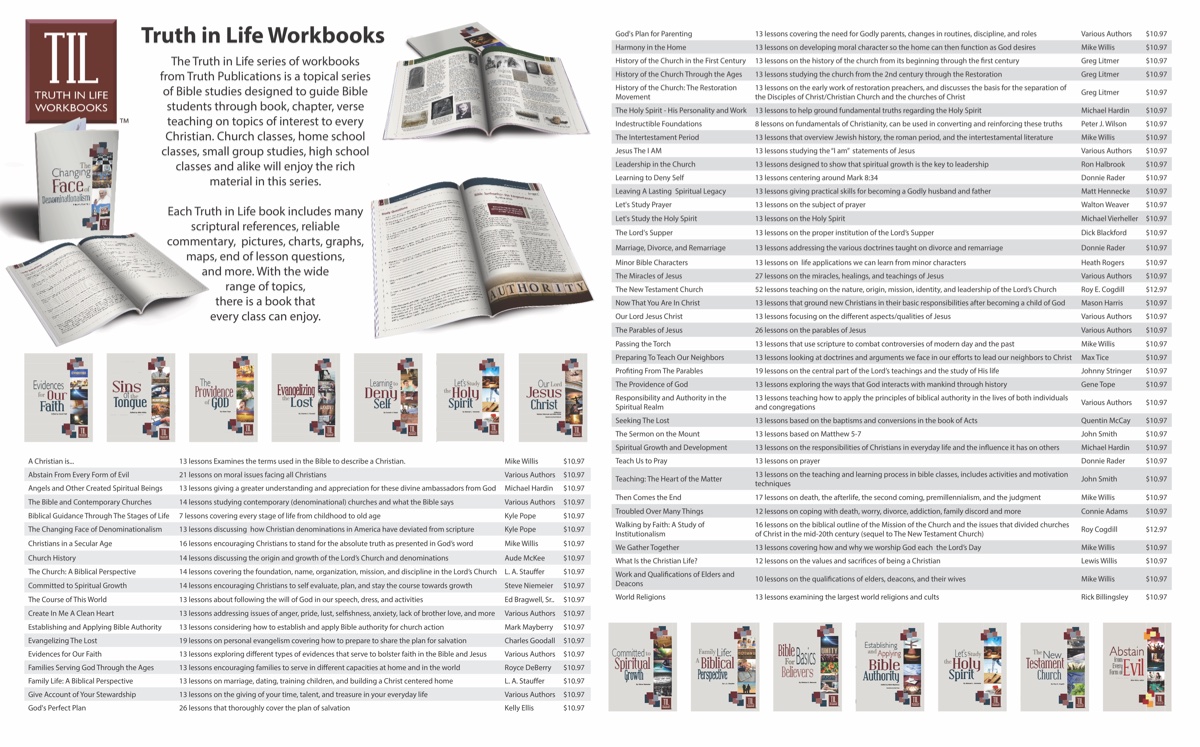


By Barry Britnell
Synopsis: As you walk through the Old City of Jerusalem and visit the Church of the Holy Sepulchre, you think about different things. . . including Barabbas.
For every visitor to the city of Jerusalem, a place that should be on your “must see” list is the Church of the Holy Sepulchre. This church building, the origins of which date back to the fourth century AD, sits on the traditional location of the death, burial, and resurrection of Jesus. Although the purpose of this article is not to debate that question, as there are plenty of arguments to support or deny that claim. With that said, I believe that this building sits in the general location of those events.
I have visited this church building many times. There are several things that go through your mind when you walk through the hallways, go up and down the staircases, and see people from across the globe thinking about Jesus. Among other thoughts, I often think about Barabbas.
In Scripture, I firmly believe that God has given us all the information that we need to know in order to be pleasing to Him. With that being said, I often wonder about parts of the stories that we are not told. Remember, these are real people and these things really happened. These are people with thoughts and feelings and goals and dreams.
In Mark 15, beginning in verse 6, we read:
Now at the feast he used to release for them one prisoner for whom they asked. And among the rebels in prison, who had committed murder in the insurrection, there was a man called Barabbas. And the crowd came up and began to ask Pilate to do as he usually did for them. And he answered them, saying, “Do you want me to release for you the King of the Jews?” For he perceived that it was out of envy that the chief priests had delivered Him up. But the chief priests stirred up the crowd to have him release for them Barabbas instead. And Pilate again said to them, “Then what shall I do with the man you call the King of the Jews?” And they cried out again, “Crucify Him.” And Pilate said to them, “Why? What evil has He done?” But they shouted all the more, “Crucify Him.” So Pilate, wishing to satisfy the crowd, released for them Barabbas, and having scourged Jesus, he delivered Him to be crucified.
We know little about Barabbas. We know that he was in prison. Matthew tells us he was a notorious prisoner. John tells us he was a robber. Luke, and as we read here in Mark, we learn that Barabbas was involved in an insurrection in the city and charged with murder. This was not a good man; rather, he deserved of punishment.
In my mind’s eye, I can envision him laying down in a cold, dark, and damp prison cell, having no idea what fate lies ahead of him. He truly deserved death.
Then, he hears the sounds of the door being unlocked and he is told that he is free.
I wonder what he was told. It is possible that he was told that a man named Jesus would die in his place. If so, he would be the first to directly hear those precious words: “Your sins are being paid by Jesus.”
I wonder what the rest of that day was like for Barabbas. Did he wander out to Golgotha to see the Man who was paying his price? Did he look up at Jesus and understand that He was hanging on the cross in his place? Did he stand there and watch others jeer at the dying Man who was hanging on the cross instead of him? When his family and friends saw him and asked him why he was out of prison, did he tell them about Jesus?
I wonder what the rest of Barabbas’ life was like. Did this experience convince him to change his ways? Did he take the opportunity to tell everyone he could about the Man who paid his price to give him a second chance?
Those are the things about which I wonder. I wonder about those things, not only because I’m curious about Barabbas, but also because I am curious about myself.
Do I realize that I was in the same place as Barabbas? Because of my sins, I was in bondage. Because of my sins, I deserved of death. However, then I was told that Jesus died for me and that I was free.
Do I take the time to mentally wander out to Golgotha and see Jesus suffering on the cross instead of me?
Do I tell everyone that I can about Jesus? Do I share how He paid my price to give me a second chance?
Perhaps we are not told everything about the entire story of Barabbas to satisfy our curiosity. Yet, we are told enough for us to realize that we are just like Barabbas. Just as Jesus died in the place of Barabbas, Jesus has also died for you and me.

Caption #1: The outside of the Church of the Holy Sepulchre, which sits in the Old City of Jerusalem.

Caption #1: The outside of the Church of the Holy Sepulchre, which sits in the Old City of Jerusalem.

Caption #2: The edicule, which is a small building inside the Church of the Holy Sepulchre. Inside the edicule is the traditional location of where Jesus was buried.
Bing CoPilot: The edicule is a small structure within the Church of the Holy Sepulchre that encloses the remains of a cave that has been venerated since at least the fourth century AD as the tomb of Jesus Christ. The edicule is also known as the Aedicule or the Tomb of Christ.
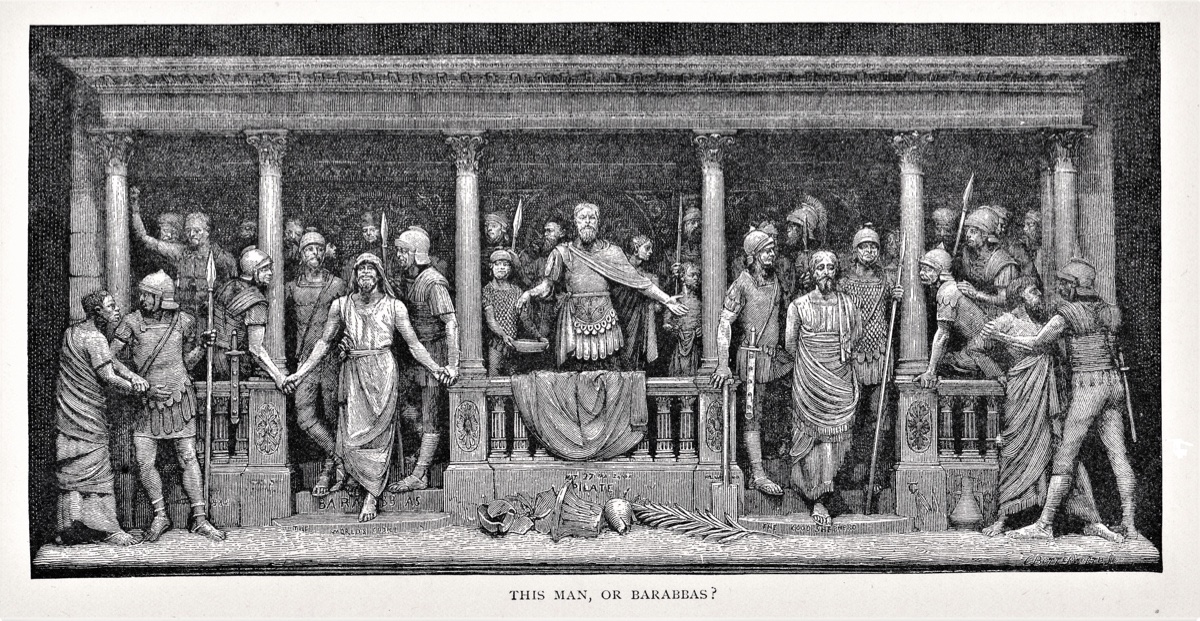
Barry Britnell is the founder of Exploring Bible Lands, LLC and leads Bible Study tours to the land of Israel. He also works with Appian Media to produce biblically sound videos used in teaching others about the Bible. He and his wife, Tabatha, have three children. They live in Athens, AL, and worship with the Capshaw church of Christ. He can be reached here.




By Chris Reeves
Synopsis: With this issue of Truth Magazine, Chris starts a new column that will focus upon “Bible Couples.” Honest characterization is a hallmark of inspired Scripture. Join us as we examine the domestic devotion of faithful disciples, and recoil at the folly of others who occupy the rogues gallery.
For Adam was first formed, then Eve; and Adam was not beguiled, but the woman being beguiled hath fallen into transgression (1 Tim. 2:13-14).
Can you image a more perfect wedding ceremony? You are present there with your future spouse that has been created just for you. You are standing in a beautiful paradise garden and the one doing the wedding ceremony is God himself. How great that must have been. . . marital bliss! Of whom am I speaking? Of course, it is Adam and Eve, the first Bible couple [Note #1]. It all started with them. They are the only couple with the distinction of being the first married couple in all the world.
Then, at some point in the marriage, all goes wrong, and the story takes a bad turn. Such is the marriage of Adam and Eve. They had so much in their favor and then they gave it all away for a moment of sin. Let’s look at the first married couple to see what you can learn that would benefit your marriage today. Where did they go wrong, and how can you avoid the same thing today?
Adam, whose name means “red” or “ruddy,” and Eve, whose name means “life” or “life-giver,” had a wonderful and privileged beginning. No one else in the world could ever say that they were the first man and woman and the first married couple. This is special! When you examine the inspired record, you will find several privileged blessings they enjoyed in their marriage.
First, Adam and Eve were the height and culmination of all that God created. He saved the best for last, as it were.
And God said, Let us make man in our image, after our likeness: and let them have dominion over the fish of the sea, and over the birds of the heavens, and over the cattle, and over all the earth, and over every creeping thing that creeps upon the earth (Gen. 2:26) [Note #2].
Second, Adam and Eve were made in the very image of God [Note #3]. They were made with something that no other part of creation could have had. They had a spirit and a conscience. Adam was a male and Eve was a female. They did not experience any so-called “gender dysphoria.”
And God created man in His own image, in the image of God created He him; male and female created He them (Gen. 2:27).
Third, Adam and Eve were blessed by God with a wonderful purpose in life—to populate the earth with offspring and to take care of God’s creation. They didn’t sit around feeling depressed without purpose, goal, or aim in life.
And God blessed them: and God said unto them, Be fruitful, and multiply, and replenish the earth, and subdue it; and have dominion over the fish of the sea, and over the birds of the heavens, and over every living thing that moves upon the earth (Gen. 2:28).
Fourth, Adam and Eve were given by God all that they needed to live a happy and fulfilled life. The Genesis story is clear how that so much was “given” to them by God and all of it was “very good.” God did not make any junk and Adam and Eve were not living unhappy, unfilled lives of depression.
And God said, Behold, I have given you every herb yielding seed, which is upon the face of all the earth, and every tree, in which is the fruit of a tree yielding seed; to you it shall be for food: and to every beast of the earth, and to every bird of the heavens, and to everything that creeps upon the earth, wherein there is life, I have given every green herb for food: and it was so. And God saw everything that He had made, and, behold, it was very good. And there was evening and there was morning, the sixth day (Gen. 2:29-31).
Fifth, Adam and Eve were a special and direct creation of God with “the breath of life” and a “living soul” in them [Note #4]. They did not simply evolve over long periods of time from lower life forms.
And Jehovah God formed man of the dust of the ground and breathed into his nostrils the breath of life; and man became a living soul (Gen. 2:7).
Sixth, Adam and Eve were given by God a beautiful garden paradise in which to live. It was a “pleasant” and “good” place to live. They didn’t have to worry about where they were going to live after they got married or how they were going to make the rental or mortgage payment.
And Jehovah God planted a garden eastward, in Eden; and there He put the man whom He had formed. And out of the ground made Jehovah God to grow every tree that is pleasant to the sight, and good for food; the tree of life also in the midst of the garden, and the tree of the knowledge of good and evil (Gen. 2:8-9).
Seventh, Adam and Eve were given the responsibility of work to do throughout the day and something profitable to occupy their minds and bodies. They did not have to worry about getting a job or the stress and strain of “making ends meet.”
And Jehovah God took the man and put him into the garden of Eden to dress it and to keep it (Gen. 2:15).
Eighth, Adam and Eve were given a direct communication and revelation from God. God spoke with them and revealed His law to them. They were given guidance on how to live and how not to live. God’s law (command) allowed them to have freedom (“you may freely eat”), but it also gave them a limitation or boundary and consequences for going beyond that boundary. All of these things that God spoke to them were privileges as well.
And Jehovah God commanded the man, saying, Of every tree of the garden thou mayest freely eat: but of the tree of the knowledge of good and evil, thou shalt not eat of it: for in the day that thou eat thereof thou shalt surely die (Gen. 2:16-17).
Ninth, Adam and Eve had each other. Adam did not have to live a single life alone. He was given the privilege of a help or companion suitable for him in the form of a woman (2:18) who was taken from his own side (2:21-22). Adam was given another human being just like him and close to him. He was given someone to whom he could cling so as to become one. God even brought the woman to Adam (2:22) which tells us that Adam’s help and companionship would come in the form of a God-given marriage.
And the man said, This is now bone of my bones, and flesh of my flesh: she shall be called Woman, because she was taken out of Man. Therefore shall a man leave his father and his mother, and shall cleave unto his wife: and they shall be one flesh (Gen. 2:23-24) [Note #5].
Lastly, Adam and Eve had a beautiful, pure, and innocent marriage relationship with no shame. They were naked, but not ashamed [Note #6]. Nakedness for them was not associated with something vulgar as it is so much today. There was no sin or strife present. There were no marital problems between them. They were not divided or at odds with each other. There was no deceit, hypocrisy, or hiding things. All was good. The text says, “They were both naked, the man and his wife, and were not ashamed” (Gen. 2:25).
So why review all the privileges of Adam and Eve? We do this to remind ourselves of all the good that Adam and Eve were given by God before they discarded it for a moment of sin. Before Adam and Eve sinned, what they had was true marital bliss. It was a perfect marriage—a “marriage made in heaven.”
Like Adam and Eve, married couples today still have many privileged blessings from God and they do not need to throw them all away. Don’t discard all the good that God gives you in marriage. Marriage is a privileged and honorable relationship. Don’t lower it or cheapen it with sinful behavior. Don’t give in to the “pleasures of sin for a season” (Heb. 11:25).
Let’s remember what Jesus said about marriage and His quote from Genesis 2:24, when He was tested by the Pharisees about putting away (divorcing) a wife for every cause:
And there came unto Him Pharisees, trying Him, and saying, Is it lawful for a man to put away his wife for every cause? And He answered and said, Have ye not read, that He who made them from the beginning made them male and female, and said, For this cause shall a man leave his father and mother, and shall cleave to his wife; and the two shall become one flesh? So that they are no more two, but one flesh. What therefore God hath joined together, let not man put asunder (Matt. 19:3-6).
Consider what the author of Hebrews wrote:
Let marriage be had in honor among all, and let the bed be undefiled: for fornicators and adulterers God will judge (Heb. 13:4).
We are not told how long Adam and Eve had been married, but at some point in their marriage, they forsook the words of God and listened to the words of the devil. At some point, the honeymoon was over [Note #7].
When couples leave God out and let the devil in, he is going to wreak havoc in the marriage. The devil deceives and lies. He deceived Eve and lied to her, and has similarity deceived countless couples ever since. He is truly “the deceiver of the whole world” (Rev. 12:9). He promises couples things that they should not have and tries to destroy their marriage. Eve admitted that she was beguiled (3:13) and the apostle Paul wrote on two occasions that the devil deceived Eve. Here is one of them:
But I fear, lest by any means, as the serpent beguiled Eve in his craftiness, your minds should be corrupted from the simplicity and the purity that is toward Christ (2 Cor. 11:3).
Let’s take a look at this marriage story again and see how the devil corrupted Eve and her marriage. First, we are told that the devil was subtle [Note #8] and he asked Eve what appears to be an innocent question. He asked Eve, not to help her, but to get her to think about what she was not supposed to have. When someone asks you a question, it is not always for your good. The devil used doubts, distortions and denials on Eve and it worked [Note #9].
Now the serpent was more subtle than any beast of the field which Jehovah God had made. And he said unto the woman, Yea, hath God said, Ye shall not eat of any tree of the garden? (Gen. 3:1).
Second, we are told that the devil lied to Eve [Note #10]. Back in Genesis 2:17, God had told Adam not to eat of the tree of the knowledge of good and evil because, if he did, “you shall surely die.” The devil came along sometime later in Genesis 3:4 and said to Eve, “you surely shall not die.” He added the little word “not” to what God had said, and it caused a big problem. Eve had learned the truth of God’s word from her husband (or God himself) and she was able to repeat that truth, but she still chose to believe a lie.
And the woman said unto the serpent, Of the fruit of the trees of the garden we may eat: but of the fruit of the tree which is in the midst of the garden, God hath said, Ye shall not eat of it, neither shall ye touch it, lest ye die. And the serpent said unto the woman, Ye shall not surely die (Gen. 3:2-4).
Third, we are told that the devil offered Eve something that she was not supposed to have. He got her to thinking about “greener pastures elsewhere.” He wanted her to be dissatisfied and discontent with all the good that God had given her already and desire more—to be as God. In fact, the opposite would be true for Adam and Eve. They would not be like God in one sense. They would now have sin in their life while God would remain holy and without sin.
. . .for God doth know that in the day ye eat thereof, then your eyes shall be opened, and ye shall be as God, knowing good and evil (Gen. 3:5).
The devil wanted Eve to look away from what she had, to what she did not have. He still uses this tactic today in marriage. He wants married couples to look for the “greener grass on the other side” of the fence. He wants them to desire more in their marriage than what God wants—“the other woman (or man),” “the rat race,” “the world,” etc. Rather than improve your marriage situation at home, the devil says it’s easier to just look elsewhere for your gratification. Don’t fall for this old trick. The grass is not greener on the other side. Actually, God wants you to cultivate the grass in your own yard (marriage) and make it greener.
Fourth, the method that the devil used on Eve was the lust of the eye, the lust of the flesh, and the pride of life [Note #11]. He got Eve to look at the fruit of the tree [Note #12] in a way that she should not have done—a lust of the eye. He got her to crave its taste, which she should not have done—a lust of the flesh. He got her to think about what it would do for her—an appeal to her pride. It worked. The more she looked, the more she liked. Instead of resisting the devil and fleeing from him, she stayed to listen and look.
And when the woman saw that the tree was good for food, and that it was a delight to the eyes, and that the tree was to be desired to make one wise, she took of the fruit thereof, and did eat; and she gave also unto her husband with her, and he did eat (Gen. 3:6).
Marriage happiness begins and ends with trusting and obeying God’s word and continuing to do that throughout your married life. Always keep God and His word in your marriage decision-making process. Make sure that both of you are faithful Christians. Read your Bibles daily together and pray to God without ceasing. Be active members of the local church together and assemble regularly with other Christians for worship. Have regular, spiritual talk times together throughout the week with no kids, no phones, no TV, etc. Make time each day for spiritual, emotional, and physical bonding together. Marriage is not meant to be a duet, but a trio. Marriage should be made up of a man, a woman, and God. Remember, God joins us together in a scriptural marriage (Matt. 19:6) and it is God who should build our house (Ps. 127-128).
Before Adam and Eve sinned, they were in perfect harmony with God and with each other. Once the honeymoon was over and they let the devil in, they lost their first love for God and His word. Couples, don’t let the devil into your marriage by listening to the lies of this world and committing sin. When Paul wrote, “neither give place to the devil” (Eph. 4:27), he would certainly have in mind your marriage. Be subject to God and resist the devil (Jas. 4:7). Keep the devil out and you will be glad you did. Let him in and you will be headed for trouble. That’s what happened to Adam and Eve. You can still have a “garden of Eden love” [Note #13] today, but you have to keep the devil out in order to have it.
The apostle Paul wrote, in 1 Corinthians 7:5, about the potential problems that may arise in marriage, but couples have to rectify those problems in a timely manner or Satan will tempt them to sin with a lack of self-control. Paul wrote:
Defraud ye not one the other, except it be by consent for a season, that ye may give yourselves unto prayer, and may be together again, that Satan tempt you not because of your incontinency.
One reason why the marriage of Adam and Eve failed was because they did not respect and follow their God-ordained roles. Adam was created first, and this fact was meant to show that he was in the role of the head of the wife [Note #14]. As head, he was to always be taking the lead. However, he didn’t do that in this case. He let his wife Eve take the lead in sinning and then he just followed her lead. He allowed himself to be led into sin. She took an active role, and he took a passive role: “she gave also unto her husband with her, and he did eat” (3:6).
She was wrong for leading him into sin, and he was wrong for allowing her to do it. Note also that Eve sinned, and she caused him to sin too? Why do that? Why implicate your own spouse in sin? As a married couple, you need to team up against sin, not work together to sin [Note #15].
In marriage, God has always wanted the man to be in the role of a loving “head” who leads his wife and family, and he has always wanted the woman to be in the role of respectful “submission” (Eph. 5:22-33; Col. 3:18-19). When these God-given roles are followed, it is less likely that the devil can get into a marriage and cause trouble. When these roles are not followed, the devil can use the absence of these roles or the role reversals to lead couples to sin.
End the end, Adam and Eve, the first Bible couple who were privileged and blessed by God, lost something special and had to suffer the consequences of allowing just one sin into their lives and marriage. Instead of getting the delights and desires promised by the devil, what they got was trouble. Let’s consider what they suffered.
First, they suffered the immediate guilt of sin. They were sinners. As such, they died spiritually that day and were soon separated from God (2:17; 3:24) [Note #16]. Concerning Eve, Paul wrote: “. . .the woman being beguiled has fallen into transgression” (1 Tim. 2:14).
Second, they suffered shame, and hid themselves in fear from their Maker. At the moment they sinned, they realized that they had lost something—something special and precious. Their innocence was quickly changed to shame. They now had a defiled conscience. They tried to cover their nakedness, but it was not adequate. Later, God clothed them properly (3:21).
And the eyes of them both were opened, and they knew that they were naked; and they sewed fig-leaves together, and made themselves aprons. And they heard the voice of Jehovah God walking in the garden in the cool of the day: and the man and his wife hid themselves from the presence of Jehovah God amongst the trees of the garden. And Jehovah God called unto the man, and said unto him, Where art thou? And he said, I heard thy voice in the garden, and I was afraid, because I was naked; and I hid myself (Gen. 3:7-10).
Third, they suffered the “blame game.” When God held them accountable for their sins, they blamed others instead of taking responsibility for their own actions. Adam blamed Eve, which shows that sin caused them to be separated, not just from God, but also from each other. They lost their close connection with God and themselves. Trust was broken. Unfortunately, this kind of blaming after sin continues to be a common problem in marriages today.
And he said, Who told thee that thou were naked? Hast thou eaten of the tree, whereof I commanded thee that thou shouldest not eat? And the man said, The woman whom thou gave to be with me, she gave me of the tree, and I did eat. And Jehovah God said unto the woman, What is this thou hast done? And the woman said, The serpent beguiled me, and I did eat (Gen. 3:11-13).
Fourth, they suffered personal consequences and curses for their sin. The devil was cursed with a low life and enmity, Eve was cursed with pain in childbirth, and Adam was cursed in working with the sweat of his brow and returning to the ground in death.
And Jehovah God said unto the serpent, Because thou hast done this, cursed art thou above all cattle, and above every beast of the field; upon thy belly shalt thou go, and dust shalt thou eat all the days of thy life: and I will put enmity between thee and the woman, and between thy seed and her seed: he shall bruise thy head, and thou shalt bruise His heel. Unto the woman He said, I will greatly multiply thy pain and thy conception; in pain thou shalt bring forth children; and thy desire shall be to thy husband, and he shall rule over thee. And unto Adam He said, Because thou hast hearkened unto the voice of thy wife, and hast eaten of the tree, of which I commanded thee, saying, Thou shalt not eat of it: cursed is the ground for thy sake; in toil shalt thou eat of it all the days of thy life; thorns also and thistles shall it bring forth to thee; and thou shalt eat the herb of the field; in the sweat of thy face shalt thou eat bread, till thou return unto the ground; for out of it was thou taken: for dust thou art, and unto dust shalt thou return (Gen. 3:14-19).
Fifth, they suffered the loss of their beautiful, garden, paradise home. It could not have been more perfect!
And Jehovah God said, Behold, the man is become as one of us, to know good and evil; and now, lest he put forth his hand, and take also of the tree of life, and eat, and live for ever—therefore Jehovah God sent him forth from the garden of Eden, to till the ground from whence he was taken. So He drove out the man; and He placed at the east of the garden of Eden the Cherubim, and the flame of a sword which turned every way, to keep the way of the tree of life (Gen. 3:22-24).
Lastly, they had to witness the ugly effects of sin in the lives of their own children. They saw how Cain and Abel did not worship God the same way and because of that the Lord accepted one, but not the other (Gen. 4:1-5). Then, Cain murdered Abel (Gen. 4:6-8), he was cursed by the Lord (Gen. 4:9-15), and he went out from the presence of the Lord (Gen. 4:16). How sad it must have been for Adam and Eve to experience all of this.
The story of the first Bible couple is very instructive for all of us today. It reminds us of the importance of keeping our marriages in line with what God wants and keeping the devil out. Couples today who are scripturally married have so much to be thankful for. They are privileged and blessed. Don’t let the devil take that away from you.
Later, when many years of Bible history passed, the beauty of this first marriage was no longer the focus of the story of Adam and Eve. Their sin was the focus. Job, for example, who lived in the time of the Patriarchs, referenced Adam’s sin, but not his marriage (Job 31:33). Hosea the prophet referenced Adam’s sin, but not his marriage (Hos. 6:7). The apostle Paul did not reference Adam’s marriage, but the spiritual death (Rom. 5:14) and the physical death (1 Cor. 15:22) that came from his sin. So it is today. When couples let the devil in, heartache and problems will be the focus. No longer will the couple want to look at those beautiful wedding and honeymoon photos. Their focus will be on all of their problems.
There is, however, one bright light of hope in the dark story of Adam and Eve’s sin. When God spoke to the devil, He said that Eve would have offspring. “Her seed” would be a man that would bruise the head of the devil (Gen. 3:15). This is the first promise in Scripture of the redemptive work of Jesus Christ. He would come into the world to crush the power of Satan’s sin curse by dying on the cross and offering a gospel plan of salvation. Thanks be to God—you can keep the devil’s sin out of your marriage through this same Jesus Christ.
Yes, your marriage can be great! You just need to remember to do these four things: (1) Hold your privileged and blessed marriage in high esteem and protect in every way; (2) Always keep God near you and never let the devil in; (3) Carry out your God-given roles of loving headship (husband) and respectful submission (wife); and (4) Avoid sin at all costs, knowing that God will hold you accountable and cause you to suffer the sad consequences of your actions.
Have you been married just a few days, a few months, or a few years? Congratulations! What can you learn from Adam and Eve, the first Bible couple? You need to learn that the devil is going to want to come into your marriage at some point when the wedding ceremony and honeymoon are over. It may be soon after, or a few years after, but he will come. Be constantly on guard for this. When the newness of your marriage wears off and you are not as focused on each other, then you will be ripe for the devil to get you to be focused on him.
Are you now in your 40s and 50s and have been married a few decades? Keep going! What can you learn from Adam and Eve, the first Bible couple? You need to learn that the devil is going to use the years you have accumulated in your marriage against you. He will try to get you to have a “midlife crisis” and go off course. He may use adultery or divorce. He may use money or material things. However, remain faithful to God and to yourselves. Don’t keep secrets from each other. Have open communication with your spouse about any sin, temptation, or struggle with whick you are dealing. Then work as a team to keep the devil out.
Have you been married to the same spouse for over 50 years? Good for you! What can you learn from Adam and Eve, the first Bible couple? You need to learn to remain faithful to each other in facing the challenges of old age. There will be hardships that will be experienced in old age such as health problems, but you have to be faithful “in sickness and in health” and “till death do you part.”
[Note #1] Adam and Eve, of course, were real, historical characters and the first two humans ever created. This is made clear in Scripture by people like the apostle Paul, who believed them to be real and historical. Liberal biblical scholars, on the other hand, view Adam and Eve as merely rhetorical types or figures set forth in an ancient “creation myth” story and not real persons. For an example of this liberal view, see Helen Schungel-Straumann’s chapter on “Adam and Eve” in Great Couples of the Bible, Fortress Press, 2006.
[Note #2] All Scripture quotations are taken from the American Standard Version (ASV), published in 1901.
[Note #3] See also Genesis 5:1-2.
[Note #4] The apostle Paul wrote: “the first Adam became a living soul” (1 Cor. 15:45).
[Note #5] This passage in Genesis is referenced in the New Testament by Jesus (Matt. 19:5) and by Paul (1 Cor. 6:16; Eph. 5:31).
[Note #6] A similar description of an unashamed husband and wife can be found in the book of Song of Solomon.
[Note #7] The use of the word “honeymoon” to describe a period following marriage goes back to 1500s England. Since honey is sweet and each month has a new moon, a “honeymoon” is the sweet period that couples spend together in the first month after their marriage.
[Note #8] The first adjective used in Scripture to describe the devil is “subtle.” Other versions say “crafty” (ESV, NASB), “cunning” (CSB, NKJV), and “shrewd” (NET).
[Note #9] Richard L. Strauss, Famous Couples of the Bible, (Wheaton, IL : Tyndale House Publishers, 1978), p. 10 Online Version.
[Note #10] This is what Jesus referred to in John 8:44 when He said that the devil was “a liar and the father thereof.”
[Note #11] Satan used a similar method in tempting Jesus (Matt. 4; Luke 4), and we must recognize and resist them also (1 John 2:15-16).
[Note #12] We are not told what kind of fruit it was, though the apple has won out over all other fruits down through the centuries.
[Note #13] David Clarke, Ph.D., The Top 10 Most Outrageous Couples of the Bible, (Shiloh Run Press, 2014) page 17
[Note #14] Paul makes this point in 1 Corinthians 11:3-9 and 1 Timothy 2:11-14.
[Note #15] We observe the same situation with the sin of Ananias and Sapphira in Acts 5.
[Note #16] Adam experienced spiritual death (i.e., separation from God) because of his sin, and eventually faced physical death as well (Rom. 5:12-21; 1 Cor. 15:21-22).
Chris Reeves has preached for the Warfield Blvd. church of Christ in Clarksville, TN, since 2016. He and his wife, Cheri, have four children and two grandchildren. His Bible study website is here. The church website is here. He can be reached at here.
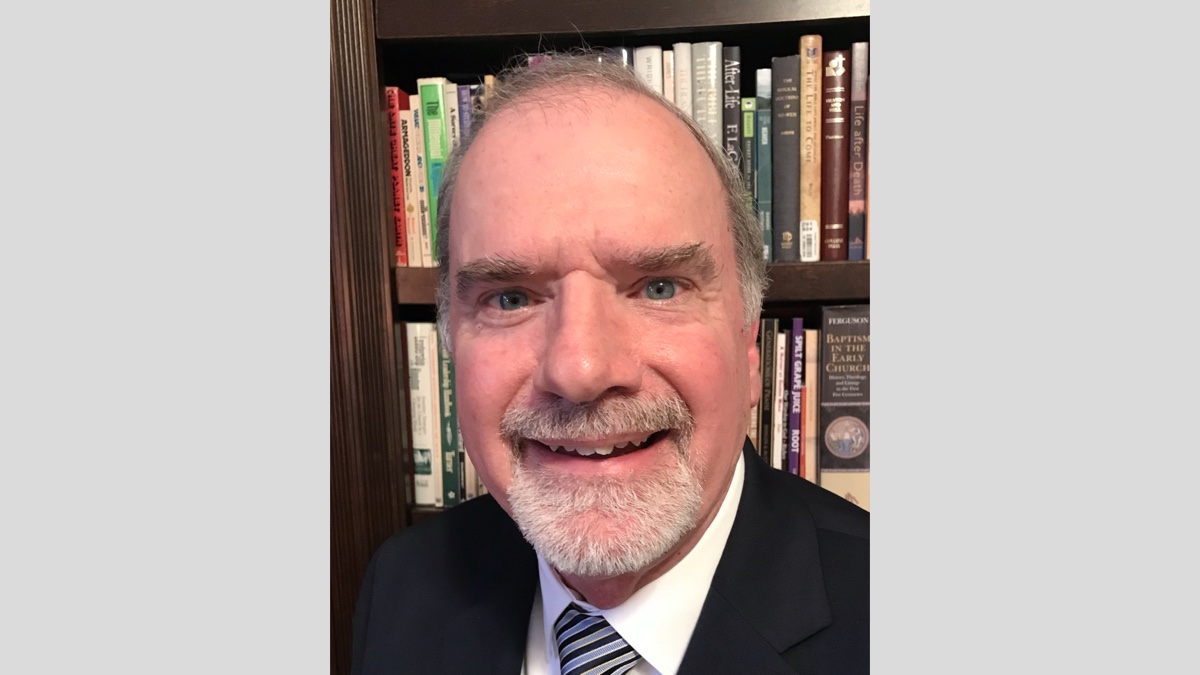




By Danny Linden
Synopsis: Philippians 4:1-9 shows us how a church that is already doing most things right can still improve and become more effective in its work for the Lord.
Philippians is a positive letter that, by and large, does not deal with the kinds of serious problems that Paul’s other letters are forced to address. The Philippian brethren stand as a light in Paul’s ministry and bring him joy to remember. However, they still needed to be encouraged and emboldened in their faith. Let’s examine Philippians 4:1-9 to see how Paul’s love for them led him to call on them to resolve their differences and be settled in their faith. In this way, Paul is working to make strong brethren even stronger.
Therefore, my brothers, whom I love and long for, my joy and crown, stand firm thus in the Lord, my beloved (Phil. 4:1).
Paul’s effusive love for the Philippians is obvious. His time in Philippi was difficult—he faced an unjust beating and imprisonment, both of which violated his rights as a Roman citizen. Paul was punished for simply preaching the gospel (Acts 16:16-24), but he did not look back on it bitterly. The brethren who were converted there were a source of great joy to him. Lydia and the jailer and their families represented the kind of people who submitted to the gospel in such a harsh environment.
In writing to his beloved brethren, Paul was in prison, facing an uncertain future (Phil. 1:7). Yet, he knew that his suffering was a benefit to the kingdom (Phil. 1:12-14) and that the Philippian brethren were partners with him in his work (Phil. 1:5).
Because of his great love for them, Paul urged the Philippians to remain firm in the Lord. Their previous work will be of no benefit if they lose heart now. They need to imitate the aged apostle and patiently await their exaltation in Christ in the resurrection (Phil. 3:17-21).
I entreat Euodia and I entreat Syntyche to agree in the Lord. Yes, I ask you also, true companion, help these women, who have labored side by side with me in the gospel together with Clement and the rest of my fellow workers, whose names are in the book of life (Phil. 4:2-3).
The inclusion of Euodia and Syntyche is sparse but instructive. What stood between these two women that prevented them from getting along? Paul doesn’t say, and we don’t have many clues. The exact cause of their disagreement is unknown. Yet, some reasonable conclusions can be drawn.
The dispute was not doctrinal. The evidence of their previous work is helpful here, but not conclusive. What is even more compelling is that Paul does not take a side. In other cases where individuals were teaching error, or when false doctrine had taken root in a congregation, Paul was quick to step in (cf. 1 Cor. 1:10-17; Gal. 1:6-10; 1 Tim. 6:20-21; 2 Tim. 4:14-18). He always defended the truth, rebuked false teachers, and urged churches to be united in truthful practice of the law of Christ. With Euodia and Syntyche, Paul does not take sides, but simply entreats them to agree in the Lord. It does not seem to matter if one or the other or both give way in the dispute, so long as it can be solved or set aside.
Euodia and Syntyche were not false disciples. They had previously worked together with Paul, Clement, and other Christians and were an important part of kingdom work. They were not rebellious troublemakers who had a habit of stirring up division. Nevertheless, their dispute had become disruptive. For Paul to know about it from a distance, it must have long since surpassed the level of a private quarrel. Where there is smoke, there is fire, and the Philippian church must have been choking on the smoke of this argument for Paul to become involved.
I suspect it was some personal dispute. Even when we agree on doctrine, personalities can clash, and personal slights can offend. Many righteous men and women have been weighed down by interpersonal conflicts that begin with the smallest of offenses. We can only speculate who initially wronged the other, but Paul places the responsibility of reconciliation squarely on both women.
Paul even goes a step further. He asks for his “true companion” to assist with the mediation between these two women. It is unclear to whom he is referring, but it apparently was self-evident to the Philippians [Note #1]. The resolution of this conflict was not optional, and they should do whatever it takes to resolve it. In truth, Paul has done more than bring one mediator into the matter. By including this in the letter that was read to the whole church, he has made it the mission of all the brethren to help these two women get along. As embarrassing as this seems for them, it goes to show how important it is to be united as brethren.
Rejoice in the Lord always; again I will say, rejoice. Let your reasonableness be known to everyone. The Lord is at hand; do not be anxious about anything, but in everything by prayer and supplication with thanksgiving let your requests be made known to God. And the peace of God, which surpasses all understanding, will guard your hearts and your minds in Christ Jesus (Phil. 4:4-7).
It seems that the Philippians were also afflicted with anxiety. Likely, the stress of wondering how Paul was doing in prison and enduring whatever opposition they faced in their community contributed to this. Paul reminds them that they have much over which to rejoice. The Lord has blessed them. He is near to hear their requests and to give them peace.
Two things are necessary considering their anxieties. First, their “reasonableness” (“gentle spirit,” NASB) must be manifest to all. Stress and persecution can harden us into combative, unreasonable people. Although the Philippians were going through a lot, they needed to maintain their gentle approach. Jesus rules within their hearts, and He is at hand to bring judgment against their enemies. Why give their opponents any legitimate reason to malign them? Second, they needed to rely on God. Turn it all over to God and tell Him what you need. He offers the only real and lasting peace.
Finally, brothers, whatever is true, whatever is honorable, whatever is just, whatever is pure, whatever is lovely, whatever is commendable, if there is any excellence, if there is anything worthy of praise, think about these things. What you have learned and received and heard and seen in me—practice these things, and the God of peace will be with you (Phil. 4:8-9).
These verses give further credence to the idea that the disciples at Philippi were distracted with anxieties and other unprofitable things. Paul’s goal is to settle them and recenter their thinking. Do not waste your time with fears, impurities, corruption, and distractions. Fill your mind with things that come from God. Meditate on things that would be praised if they were put on display for your brethren to see. This is part of how God answers our pleas for help. While we might be looking for a magic bullet to take away our problems, God, instead, gives us tools to deepen our faith and fill us with righteousness.
One mistake often made is reading verse 8 in isolation, limiting the instruction given to only include our thoughts. Actually, Paul immediately adds more to the picture in verse 9. The things that you learn, receive, hear, and see need to be practiced in your life. Mind and body must be joined together in the truth of Scripture. Our thoughts, words, and actions all reinforce each other, so live excellently in every way.
Paul loved his brethren so much that he wanted them to thrive spiritually. It is obvious to us that, above any concerns for their health, jobs, and safety, he most of all wanted them to remain faithful to Christ. This must be our goal as well. May we set aside our differences, overcome our anxieties, and demonstrate faithful service to God each day. Likewise, our constant prayer should be that God’s people around the world maintain their faith and glorify the Lord who saves us. May the weak be made strong, and may the strong become even stronger!
[Note #1] Another option is that the “companion” as translated by the ESV, actually is the Greek name Suzuge/Syzygus. If that is true, we still don’t know anything more about this mediator, but it may explain how the church was to know to whom Paul was referring.
Danny Linden has worked with the Hebron Lane church of Christ in Shepherdsville, KY, since March 2023. He and his wife, Lauren, have four children. The church website is here. He can be reached here.




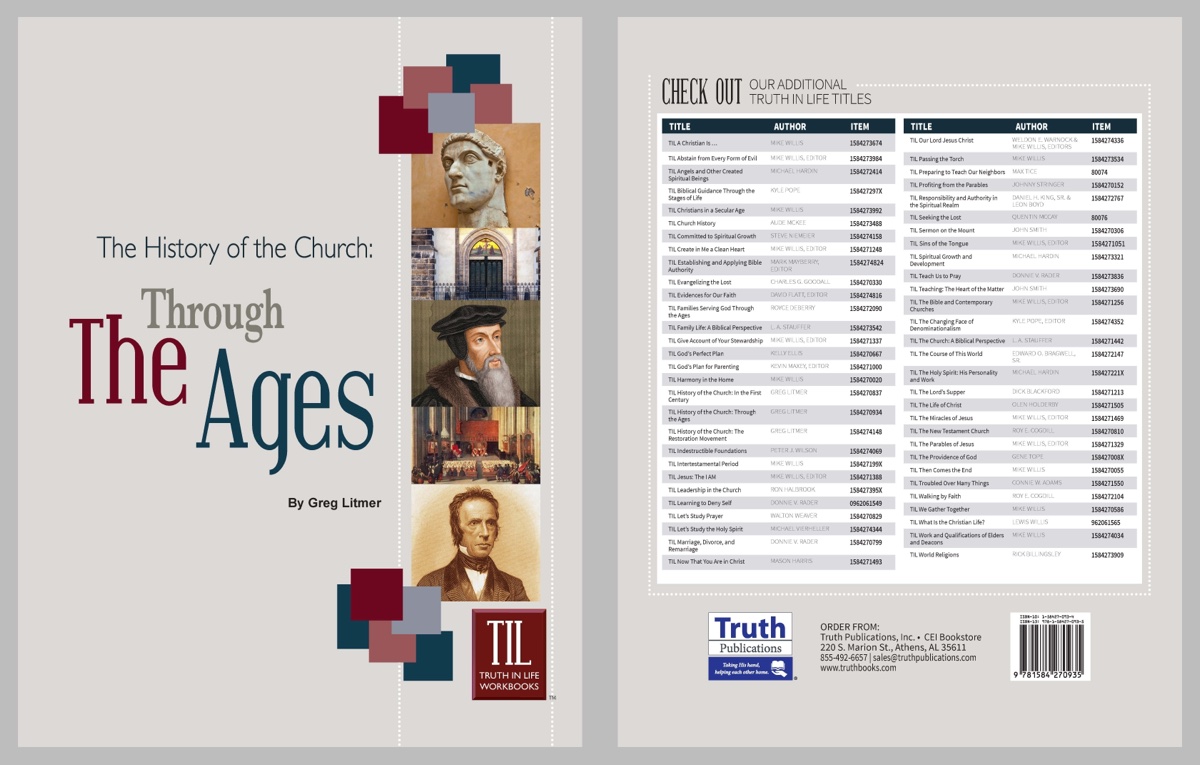
By Ryan Dalton
Synopsis: How should Christians respond when immorality becomes commonplace and sin is everywhere? God’s word provides the answer!
A person may come to a crossroads at different times in life. This represents a point where an individual faces a choice: How will he react to the reality of his personal situation? Consider the parable of the prodigal son, who, while feeding the swine, finally awoke to the reality of his situation. A crossroad forces us to choose the path our lives will take—either continuing to reject God, or choosing to serve Him. How will we react to the realities we face?
Now, it is no secret that there is much evil prevalent in the world today. Christians have to deal with such evils—which are constantly increasing in scale and effect. The militancy of the evil is skyrocketing. Evil does not like to be exposed. John 3:18-21 reminds us that evil individuals dislike having their deeds exposed. They hate the light that does so.
The situation in the world is unstable and rapidly changing—especially in America. Historically, America has been extremely blessed, with more innovation, safety, physical comforts, and spiritual receptiveness than ever in recorded history. Americans have allowed these blessings to be their downfall. Evil is not just present in America’s streets today, it is overwhelmingly pervasive.
Pornography is rampant, even among children. Sexual degeneracies of all kinds are justified, defended, and celebrated. Families are shattered or dysfunctional. People are indoctrinated to think of themselves as nothing more than animals and to reject any kind of absolute truth. Lying is commonplace. Laziness abounds. Suicide, depression and drug use are at high levels. Many have no purpose, no sense of individual identity, and no support. Many believe they are alone, that their existence is pointless, and they live like it! Lawlessness is observed everywhere, including in the government itself—which openly defends and supports immorality and sin. To put it plainly, our country is falling apart; sin has rotted the core of the government and of the people of this country. Pleasure, entertainment, and convenience are the common gods of this land!
Do I paint too dismal a picture? If we open our eyes, we will see that sin is all around us. Although what the result will be remains to be seen, no outcome looks pleasant in the short-term. A discussion of this topic could branch into many directions—culture, society, community, government, and so on. However, our focus is upon the church. Today is a “crossroads moment” for Christians.
In James.1:21-25, Christians are commanded to “put aside all filthiness and overflow of wickedness” and to “receive the implanted word.” James commands Christians to not be forgetful hearers but doers of the word—using the illustration of looking in a mirror and then not actually changing what’s wrong. If Christians are actual doers of the word, then they look into the “perfect law of liberty” and continue in it. In a world that denies the existence of any absolute standard, this statement is refreshing, isn’t it? However, Christians should not overlook the importance of actually conforming to the standard, and not simply agreeing that it is the standard. Christians must put the standard into practice in their lives. We need to cultivate an accurate self-image. We must examine ourselves closely and honestly. As we reflect on the current state of the world, are we willing to examine our part in it and what we should do?
Christianity is the true religion, and it colors and affects every single part of life. It is a way of living that affects every person’s roles in their families, in school, at work, in the community, in the government, anywhere and everywhere they have responsibilities. Do Christians shut themselves off from being “in the world but not of the world” because of the rampant evil around them? Do Christians—do I—recognize that so many people are desperately searching for a purpose in life? The fields are white for the harvest! Do we fall into writing off the immoral as too evil to be interested in the gospel?
Do we practice what we preach when it comes to grace? We preach (and rightfully so!) that God’s grace is extended to all, regardless of what sins they have committed. Do we put that into practice? I am not advocating that we ignore the struggles of our brethren. Nor should we put them in situations where Satan can gain the advantage. Do we treat our fellow Christians as pure upon immersion, or do we put them on spiritual probation until they can “prove” their righteousness to us? In such a corrupt world, we cannot expect new Christians to come from non-religious or weak religious backgrounds without some serious baggage.
Are we also careful about brethren that have grown up “in the church” as we say or are from otherwise strong religious backgrounds? For example, pornography is a scourge that has totally infiltrated all aspects of American life. It is my understanding that performing studies on the effects of pornography is difficult because it is so difficult to find men that haven’t been exposed to it. Do we understand the implications of this? It means that likely every (or almost every) Christian man below the age of, let’s say, thirty, has been exposed to (and struggled with) pornography—at least to some degree. Yet pornography is treated as a dark evil that should not be so much as mentioned. Brethren who struggle with this sin may not know where to go for help. They may need help from their brethren. Let’s be sure to support them in their struggles. With the confession of sins being so important, is it really healthy to create an environment where that is the hardest thing for a Christian to confront?
If we are not realistic about the world, America, or wherever the reader is, we will have a hard time behaving in a way that maximizes the powerful light of the gospel that is supposed to shine through us. Have we accepted the fact that, if there is any hope for this broken country and people, it is in the bold spreading of God’s word? Do we realize also that it is not just those on the outside, but everyone, including brethren, who are affected by it and are far too often afraid to get help? Do we really believe that when our sins are forgiven, we are truly pure? If anyone, from a new Christian to an elder in the church, confesses what we consider an especially “bad” sin, will we effectively shun them or treat them like their sins are truly forgiven? The process of growing in the “grace and knowledge of our Lord Jesus Christ” is a long and difficult struggle, and I have seen that even in my short time here on earth. Even growing up “in the church,” I have undergone struggles of which I am not proud. As we come to terms with the extreme corruption in the world—and that sometimes infiltrates the church—I hope that we are willing to look at ourselves in the mirror of God’s word, and face the growing storm instead of burying our heads and hoping it doesn’t affect us!
This is our crossroads! The world and our country is in a sorry state. Will we embrace the power of Christ and boldly confront evil with the light of God’s word, or hang desperately on to a false and dangerous sense of comfort and familiarity?
Ryan Dalton has been a member of Sutton Lane church of Christ in Mayfield, KY, since 2021. He is an employee at Consolidated Electrical Distributors. The church website is here. He can be reached here.






By Steve Wolfgang
Synopsis: I reached out to Wiley Deason for assistence in arranging the topics and selecting the writers for this special issue of Truth Magazine. His help is deeply appreciated. The concepts of Progressive “Christianity” are impacting members of the Lord’s church—especially the young. It is vitally important that brethren understand the danger posed by proponents of this movement, and be able to recognize and refute such corruptions of the biblical pattern—Mark Mayberry, Editor.
Churches which identify as “Churches of Christ” in the twenty-first century appear to be in a state of considerable disagreement and disarray [Note #1]. The Global History of “The Stone-Campbell Movement” observes that “While a broad middle remained in the 1990s, twenty-first century Churches of Christ reflected a clear bifurcation between conservatives and progressives” [Note #2]. Historian Douglas Foster spoke truth in describing “our diversity and fragmentation” created by “a constant barrage of contradictory messages from the increasingly different institutions” and centers of influence in various quarters [Note #3].
Progressives emphasized what they defined as “grace” over what they perceived as “legalism,” promoting changes in worship (including instrumental music) and in hermeneutics, the inclusion of women in worship and leadership, social ministries, racial justice, gender/sexuality issues, and fellowship with other denominations—all of which sharply contrasted with the “exclusivism” often seen in more “traditional” Churches of Christ [Note #4]. Even in the late-twentieth century, historian Ed Harrell described “the mainstream Churches of Christ” as being “in the midst of what some of their scholars are calling an ‘identity crisis,’ a time when they are seriously questioning the reasons for their own existence” [Note #5].
A recent summary of such changes is provided by Philip Sanders (the public face, “In Search of the Lord’s Way,” a multi-congregation “sponsoring church” television program of the church in Edmond, OK). Citing a “postmodern rejection of authority, the distrust of logic, the distaste for restoration hermeneutics, the denial of patterns in Scripture, and the questioning of inerrancy,” Sanders notes that “many preachers do not preach error but will not preach against error,” and describes the current situation as the twentieth century progressed into the next:
These leaders by rejecting biblical teaching have pointed churches to follow the mindset of our culture. They are pressing for instrumental music in worship, women in roles of leadership, the fellowshipping of adults who were only sprinkled as infants, worship teams [and] accepting same-sex activity. . . They no longer believe God set a pattern for how His church is to organize, to worship, or to come to salvation [Note #6].
Perhaps no one has been a more visible and vocal advocate of such progressive causes among twenty-first century Churches of Christ than John Mark Hicks. Educated at Freed-Hardeman, Western Kentucky University, and with a doctorate from Westminster Theological Seminary, Hicks recently retired from David Lipscomb University (having spent years prior to that teaching at Harding School of Theology in Memphis). Through teaching, in several recent books, and in a variety of digital/electronic forums, he has exerted significant influence on students, preachers, and Christians in the pews.
In one of his recent books, Searching for the Pattern, Hicks takes aim specifically at what he calls the “blueprint hermeneutic” of “non-institutional” churches. While he does so in the form of his own personal wrestling with how “restorationists” in Churches of Christ have read and understood the Bible, make no mistake: his recent works target those who see things as he once did. Hicks attempts to make a case that his newer-understanding and hermeneutical principles are correct and biblical, while rejecting the sort of what is often labelled “patternism” that he grew up with [Note #7].
There are those who see any review or critique, however respectful or polite, of a brother’s public teaching as somehow constituting a personal attack on the author. John Mark and I have long been acquainted and have worked together amicably on various projects and conferences, mostly about our shared interests in our intersecting histories, and the religious issues raised by our spiritual ancestry. John Mark references some of my published writings in Searching for the Pattern: A Study Guide. I consider him a friend and brother; he is a congenial person who writes with more respectful sensitivity than others have achieved regarding the concerns of those with whom he differs. He and I have no personal axes to grind with each other. I do, however, consider much of what he writes to be spiritually dangerous—just as he considers dangerous (“not safe”—his polite terminology) some things I believe and teach. We disagree significantly about things that we both consider important. His work challenges all to re-examine wisely and ponder anew what we believe, and why.
Searching for the Pattern provides significant insight into the shifting perspectives involved in a trek from “traditional” to more progressive/permissive positions. In a revealing passage recounting his rejection of a biblical argument regarding the recipients of congregational benevolent enterprises, Hicks acknowledges that “rigorous application” of principles of Bible study “warranted the conclusion” on a given practice involved in the controversy over church-supported human institutions. John Mark then argued,
On the other hand, that conclusion did not sit well with me. Something gnawed at me. It was as if I felt that can’t be right. And yet I knew that the heart is deceitful above all things, and I could not trust my feelings when it came to what the Bible taught. What the Bible said was true whether I liked it or not. Nevertheless, something seemed amiss [Note #8].
As the narrative continues, Hicks does exactly what he says he knows should not be done—privileging feelings over the often-challenging clarity of Scripture—all the while acknowledging the warnings and caveats about the dangers inherent in choosing that path. Following one’s “gut” (a term used multiple times in his narrative) and favoring sentimentality and emotionalism over what one acknowledges to be biblical teaching is a well-worn corridor leading to many permissive possibilities.
Perhaps as telling as what Searching for the Pattern includes is what is omitted from the selective narrative Hicks constructs regarding the dispute over whether churches are obligated to support human institutions financially. There is no hint that this controversy was precipitated by high-pressure demands for financial donations to nineteenth-century-style human institutions, including (at first) orphanages with their obvious emotional appeal [Note #9]. Later, colleges (including those where John Mark was educated and earned a living for decades) and a multitude of other sorts of para-church institutions all became dependent upon church donations for their livelihood. That controversy did not arise as some sort of sterile doctrinal quarrel precipitated as an overly complicated theological/intellectual exercise in logic-chopping about the minutiae of obscure texts. Historical context can be extremely valuable when analyzing doctrinal “positions.”
Nor does John Mark’s “Re-evaluation” (p. 90) end with a historical controversy from deep in the last century. The progressive program he and others advocate is nothing less than a broad scale attempt to reform (or “revision”) present-day “Churches of Christ,” aligning them more with denominational theologies on worship practices, the role of women, gender and sexuality issues, expansive views about the nature of Scripture and how divine revelation should be understood—and more. Rather than departing to join various denominations, as many progressive dissenters have felt necessary to do in the past, enough of a critical mass has been achieved that many feel comfortable (and nostalgic about their childhood traditions) to stay and be the proverbial “change agents” from within [Note #10].
Searching for the Pattern is not the end—it is but the first of John Mark’s proposed trilogy of works, demonstrating some of the logical consequences of the path he advocates. A companion volume, Women Serving God, is a significant example of the interpretive journey followed by some who are transitioning from gender-exclusive to gender-inclusive viewpoints. Providing a window into the hermeneutics of progressive Churches of Christ, Hicks guides his readers down a path of increasing dissatisfaction with traditional positions on biblical passages regarding the roles of women in worship gatherings, evolving from “limited” to “full” participation [Note #11].
God has gifted women with the authority to fully participate in the assembly. There are no timeless blueprint restrictions that exclude women from full participation. God has poured the Holy Spirit on all the children of God, both male and female. God has gifted women as well as men for ministry in the body of Christ. . . There is no indication that any of these gifts belong exclusively to men. One of these gifts is “shepherds” (pastors in Ephesians 4:11—synonymous with bishops and elders). Are women excluded from this role in the body of Christ? I hope to address that question in another book. It will serve as the third in a trilogy: (1) Searching for the Pattern about hermeneutics, (2) Women Serving God about the assembly, and (3) a book on church polity and leadership. Nothing in this book, however, excludes women from this function, and this book provides evidence that supports their inclusion.
One of John Mark’s concerns seems to be that the church is “scandalized” and “shame[d] in the eyes of contemporary culture.” He fears that “the church’s public witness” is harmed “as people are shocked to see only men lead the assembly.” Several times in his conclusion, he expresses concern that defying current cultural conventions by denying women a public role in worship “harms the congregation, scandalizes the public witness of the church, deeply wounds women, and dishonors God. May God have mercy.” In the words of another “progressive” analysis of twenty-first century Churches of Christ, “That we have become what we once despised is undeniable” [Note #12].
In many ways, these controversies are reminiscent of similar conflicts more than a century ago, when many women seeking to become preachers eventually departed for less constrained environs in the wider denominational world. A revealing article from that prior controversy provides some insight into the broader hermeneutical conflicts involved in the evolution of the modernistic mentalities which produced the Disciples of Christ denomination. While focusing on an enlarged public role for women in churches, the same expansive hermeneutical principles also allowed nineteenth century progressives to accommodate a wide range of controversial issues, from instrumental music to the so-called “higher criticism” of Scripture:
A principle may set aside an apostolic precept. It may brush aside an apostolic decree. We do that constantly. We follow the apostolic example whenever we like it; when we do not, we depart from it [Note #13].
The dangers of such thinking and behavior certainly are not limited to the writings of John Mark Hicks, but can afflict many on all sides of these controversies. May we take caution—and may God, indeed, have mercy!
[Note #1] Not only is this diversity broad and scattered enough to defy many generalizations, but some (including this author) are allergic to attempts to “number Israel” or count “the faithful”—as if any human could thereby create or identify the “universal church.” Even trying to identify who or what are “Churches of Christ” can present “issues.”
[Note #2] D. Newell Williams, Douglas A. Foster, and Paul M. Blowers, eds., The Stone-Campbell Movement: A Global History (St. Louis: Chalice Press, 2013), 230. This work highlights some of the diversity within Churches of Christ, including non-institutional, Black, one-cup, and non-class groups in various sections of the book.
[Note #3] Douglas A. Foster, Will the Cycle Be Unbroken?: Churches of Christ Face the Twenty-First Century (Abilene: ACU Press, 2007), 66. For my own perspective on the recent history of Churches of Christ, see Steve Wolfgang, “The Aftermath of the Institutional Controversy” and “The Post-Modernist Express into the Twenty-First Century,” appendices to L.A. Stauffer, The Restoration Movement: Speaking As the Oracles of God (2nd ed.; Waynesville, OH: SpiritBuilding Publishers), 2023, pp. 120-150.
[Note #4] See Gregory Alan Tidwell, “Ten Trends Revisited,” Gospel Advocate 161, no. 6 (June 2019): 24. As can be seen in this opening paragraph, labelling and buzzwords such as “legalism” and “grace” or “exclusivism” or “traditionalism” have been abundant—if not always accurate.
[Note #5] Ed Harrell, “How My Mind Has Changed,” Christianity Magazine, 8:10 (October 1991): 32. Indeed, some churches refuse any longer to be labelled or identified as “Churches of Christ” (many of which are dwindling and closing their doors). Many, including this author, have no desire to be identified as in agreement with what some “Churches of Christ” are practicing, endorsing, or imitating.
[Note #6] Philip Sanders, “The State of Churches of Christ in America,” Affirming the Faith Seminar, North MacArthur Church of Christ, 9300 N. MacArthur Boulevard, Oklahoma City, OK 73132, February 28, 2015. For a different, more “progressive” perspective on such events, see James L. Gorman’s revision of Richard Hughes’ Reviving the Ancient Faith: The Story of Churches of Christ in America (3rd ed.; Eerdmans, 2024), which devotes a detailed final chapter to the “Identity Crisis amid Decline in the Twenty-First Century” (pp. 305-347).
[Note #7] For an able analysis of patterns in Scripture (which considers some of John Mark Hicks’ approach) see Jeff Wilson, “Is There a Pattern?” in Christ and the Church: 2023 Truth Lectures, ed. Mark Mayberry and Kyle Pope (Athens, AL: Truth Publications, 2023), pp. 139-175.
[Note #8] John Mark Hicks, Searching for the Pattern: My Journey in Interpreting the Bible (John Mark Hicks, 2019), p. 62; see also pp. 88-89 (print edition).
[Note #9] For a discussion of some aspects of the emotionalism involved in the controversy, see Steve Wolfgang, “Ten Things To Know About Orphan-Hating Antis,” Truth Magazine 62, no. 1 (January 2018): 32-33.
[Note #10] These sentiments are explicit in several of the comments by the women preachers who comment in the appendices to Women Serving God, pp. 215ff.
[Note #11] John Mark Hicks, Women Serving God: My Journey in Understanding Their Story in the Bible (John Mark Hicks, 2020). Quotations that follow are from pp. 207, 210, Kindle edition.
[Note #12] Rob McRay, “The Last Will and Testament of the Churches of Christ,” in Leonard Allen and Lynn Anderson, eds., The Transforming of a Tradition: Churches of Christ in the New Millennium (Orange, CA: New Leaf Books, 2001), 44. The irony of the title will be evident to any student of “Restorationist” history.
[Note #13] George T. Smith, “No Man Wishes Women to Keep Silence in the Churches,” Christian Standard 29 (October 7, 1893): 798.
Steve Wolfgang has worked with the church in Downers Grove (located in suburban Chicago) since 2008. He and his wife, Bette, have two adult children and three grandchildren. The church website is here. He can be reached here.



By Bruce Reeves
Synopsis: Let us glory in God’s grace and cherish His mercy. May we never allow such to be reshaped and distorted so that we become indifferent concerning the Lord’s pattern for His people in their lives, worship, and work both individually and as a people.
The grace of God is powerful, beautiful, and transforming. It defines and reveals God’s glory, and it enlightens, instructs, and edifies the human heart through the gospel of Christ. Paul writes,
For the grace of God has appeared, bringing salvation to all men, instructing us to deny ungodliness and worldly desires and to live sensibly, righteously and godly in this present age, looking for the blessed hope and the appearing of the glory of our great God and Savior, Christ Jesus, who gave Himself for us to redeem us from every lawless deed, and to purify for Himself a people for His own possession, zealous for good deeds. These things speak and exhort and reprove with all authority. Let no one disregard you (Titus 2:11-15).
I have been blessed to have had two godly parents who raised me in the nurture and admonition of the Lord. God’s tender mercy and love were shown to me daily. The worship of the Lord and study of His divine word were held in high regard. At a young age, I saw God’s divine love and life-changing grace in the lives of His followers. I am certain that many would join with me in their memories of the same experiences. It is sad that such a glorious biblical theme is often found in the firestorm of doctrinal controversy, but this is not new.
Those who propose fundamental changes to the teachings of Christ frequently distort, redefine, and misapply the grace of God. Yet, it must be remembered that this same challenge to the truth in the name of “grace” occurred in New Testament times.
What shall we say then? Are we to continue in sin so that grace may increase? May it never be! How shall we who died to sin still live in it. . . For sin shall not be master over you, for you are not under law, but under grace. What then? Shall we sin because we are not under law, but under grace? May it never be! (Rom. 6:1-2, 14-15).
Beloved, while I was making every effort to write you about our common salvation, I felt the necessity to write to you appealing that you contend earnestly for the faith which was once handed down to the saints. For certain persons have crept in unnoticed, those who were long beforehand marked out for this condemnation, ungodly persons who turn the grace of our God into licentiousness and deny our only Master and Lord, Jesus Christ (Jude 3-4).
Proponents of error often attempt to hide under the cover of ambiguity and diversion. They maintain ambiguity by becoming indignant regarding phrases that expose their teachings, by using biblical terms unbiblically, and by employing prejudicial and biased language against those who have questioned them. Historically, this has been apparent in the views of grace advanced among some of our brethren and it seems to have come to the surface once again.
To undermine an appeal to the biblical pattern for our lives, worship, or work in local congregations in the name of “grace” should be recognized as an early warning sign in these types of discussions. Such teachings appeal to the “unsuspecting,” “naïve,” “untaught” and “unstable” (Rom. 16:17; 2 Pet. 3:17). The only solution is to teach God’s word so that our hearers may be “equipped for the work of service” and will “no longer be children tossed here and there by waves and carried about by every wind of doctrine, by the trickery of men, by craftiness in deceitful scheming; but speaking the truth in love” (Eph. 4:12-16). Teachers dissatisfied with the scriptural pattern often ground their newfound ideas in false views of grace. In contrast, Peter encourages us to “stand firm” in the “true grace of God” (1 Pet. 5:13).
It is easy to make broad generalizations based on our own personal experiences, although those conclusions may not be true in every congregation. Too many are quick to speak authoritatively and judgmentally of brethren who have gone before us when their assertions and assumptions are not true. Ironically, those who are prone to do this sort of thing reveal that in their haste to burn down heritage and history, they would have done well to read more thoroughly.
It is not a matter of using the term “grace” in every other sentence. We are grace-centered when we have a healthy understanding of Christ, His gospel, will, pattern, and purpose (1 Tim. 6:3; 2 Tim. 1:13; 4:2-4). The word “grace” is found only four times in the gospel accounts, and it is not found at all in Peter’s sermon on the day of Pentecost in Acts 2. Paul used the word more than any other writer of Scripture. Yet, there should be no mistake that all the New Testament declares the grace of God! The truth is that merely using the word “grace” does not mean that we are preaching the gospel of grace. We proclaim God’s grace when we preach the fullness of the context of Scripture. The abuse of grace begins gradually in small steps, but ends tragically in spiritual disaster.
The one who controls the narrative controls in many ways the perceptions of those who hear him if discernment is not exercised. There has been much said and written that is guilty of the “either/or” fallacy. This fallacy occurs when someone claims there are only two possible options when there are actually more.
The logical conclusions of some are that we either stress grace or obedience, the love of God or the authority of Christ, mercy or pattern. It has never been an “either/or” issue, but it is “both/and.” The authority of Christ is grounded in who He is as our loving, righteous, just, sovereign, and wise Lord. Appealing to logic in our study of the Scriptures is not undermining the gospel, rather, it is following the example of Jesus and His apostles as they reasoned with their hearers according to the truth (Matt. 19:1-9; 22:23-46; Acts 15:1-22; 17:2-4; 18:4, 19, 27-28; 19:9).
We see a biased narrative through prejudicial language in sermons and articles by those who have agendas to radically change churches. For instance, we will hear phrases like “perfectionism” rather than “true obedience,” “truth protectors” instead of “contending for the faith,” “legalism” instead of “surrender to God’s word,” “Pharisaical” instead of any emphasis on “obedience from the heart,” or “wooden literalists” instead of those devoted to “context of Scripture.”
Note the writings of John Mark Hicks in his book “Searching for the Pattern:”
I recommend we let go of perfectionism, whether it is perfect families, perfect hearts, or perfect churches. We will always need the mercy of God because we will never measure up to God’s standard. Whatever our patternism or however we seek the pattern, if grace does not ground us and secure us, then we will forever search for perfection for the sake of our assurance. In that case, we will either live in perpetual doubt and despair about our salvation, or we will live in perpetual self-righteousness as we think we have sufficiently and precisely obeyed. The self-righteous, unfortunately, will demand others practice it the way they do or else there will be no fellowship between them (Hicks, 130-131).
Notice the language and the “either/or” fallacy. Can we not follow God’s pattern and trust in God’s grace for our assurance? If we conscientiously read God’s word and follow it, are we “self-righteous”? If obedience is necessary, will we be destined to live without assurance? Yet, David said, “And you, Solomon my son, know the God of your Father and serve Him with a whole heart and with a willing mind, for the Lord searches all hearts and understands every plan and thought. If you seek Him, He will be found by you, but if you forsake Him, He will cast you off forever” (1 Chron. 28:9). John writes, “By this we know that we have come to know Him, if we keep His commandments” (1 John 2:3) The notion that God has called us to do what we cannot do serves as the underpinning of many false teachings. Obedience to God is not merely formalism, it is submission from the heart (Rom. 16:17). There is a difference in perfectionism and faithfulness. When we begin to hear of human inability to follow God’s pattern, we can know that the foundation is being laid for a departure from the Lord. All Christians should understand that we are dependent on God’s mercy and grace for our salvation, but such does not deny the transformation of God’s grace and the need to follow His pattern (Rom. 12:1-2; 2 Cor. 3:17-18; 2 Pet. 1:4). We now hear voices that are questioning the convictions of faithful brethren with phrases like, “You just believe this because you were raised with pattern theology” or “I am on a hermeneutical journey.” We believe in the grace of a God, but He is a God that has revealed His pattern to us. Unfortunately, it is often the case that when brethren go on a “hermeneutical journey” they land squarely in error.
Hicks mischaracterizes obedience when he writes, “Are commands fundamentally legal tests of loyalty or are they modes of transformation?” (Hicks, 135). Again, it is both/and, not either/or. Is obedience a question of loyalty to Christ? Absolutely! Is it also a means of God transforming His people? Yes! Hicks’s work, Searching for the Pattern, is saturated with the notion that obedience is either about community, fellowship, and relationship or is a test of loyalty. It is both brethren! We have heard much about how we cannot know the Lord’s pattern and therefore we must interpret “grace” in a way that covers us when we do not do so. This is all based on the assumption that we cannot know the will of the Lord, when the Bible teaches that we can (Eph. 5:17). If such is the case, either we indict God as Creator or as Revealer. When we begin to judge matters based on what “sits well with our gut,” we are destined for apostasy (Hicks, 69).
The God whom we serve is a God of patterns. We see them in the creation of man, the formation of marriage, Israel’s covenant relationship with God, the erection of the tabernacle and temple, the work of Christ in the incarnation, the establishment of the church and her mission, work, worship, and purpose, as well as in our very hope of being in the presence of God. Our Creator’s pattern is an expression of love and authority, grace and sovereignty, glorious purpose and blueprint, new creation and revelation. It is not a matter of a faulty hermeneutic, it is a matter of spiritual rebellion and a postmodern perspective.
Some have taken quite a bit of umbrage at the phrase “Neo-Calvinism.” Yet, even Classic Calvinists understand there are shades of their theology, thus, there are “hard Calvinists” and then there are “moderate/soft Calvinists.” Those who think that one is only teaching Calvinistic views if they accept every point of the TULIP theory (Total Inability, Unconditional Election, Limited Atonement, Irresistible Grace, Perseverance of the Saints) are not only misinformed but ill-equipped to recognize dangerous errors regarding grace and fellowship.
When we begin to hear that “sound doctrine” does not include the work and worship of the church, when we hear strong gospel/doctrine distinctions, the imputation (transfer) of the perfect righteous life of Jesus to the believer, continuous cleansing, and human inability that is Neo-Calvinism. It is the foundation of uncertain sounds we have heard in the past, and are hearing today. When people begin to say, “I have not heard about the grace of God,” it may be that the term “grace” is being used as a code for a false grace.
We must not be guilty of having a thin view of grace and faith in the Scripture. God’s grace is not license; rather, it is transformation. Yes, we have been saved by grace, but we are also instructed by God’s grace. Faith should not be identified as a “non-doing trust” but allegiance and loyalty to Jesus as our Lord (Rom. 1:5; 16:26; Gal. 2:20; Phil. 2:9-11). When we begin to define the “works of the Law” as “anything we do in response to God,” we are missing the real point of God’s grace and the teaching of the New Testament. We are saved by the law of faith, but it is a faith that fully surrenders to our King (Rom. 3:27; Jas. 2:14-26). We are called to walk in the steps of our father Abraham. His faith reflects the comprehensive nature of what it means to have faith in Jesus (Rom. 4:12). Let us glory in God’s grace and cherish His mercy. May we never allow our concept of these qualities to be reshaped and distorted so that we become indifferent to the Lord’s pattern for His people in their lives, worship, and work—both individually and as a people.
Bruce Reeves has labored with the Highway 65 church of Christ in Conway, AR, since 2000. He and his wife, Rachel, have one child. The church website is here. He can be reached here.


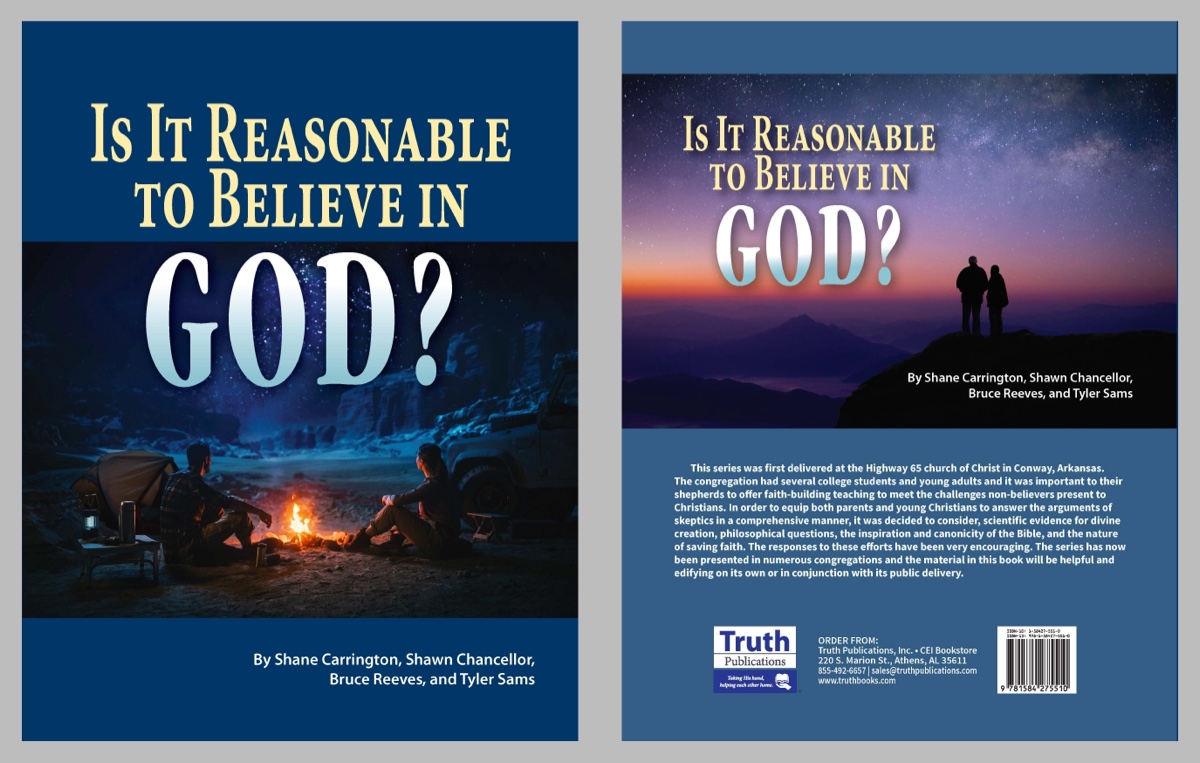
By Mark Roberts
Synopsis: John Mark Hicks’ book, Searching for the Pattern, follows the template that progressives always use to undermine the authority of Scripture.
There is an old story about a nighttime encounter between a battleship and an oncoming ship. The battleship’s captain demands the other ship move so he can pass, yet it replies to all his messages with, “You must alter your course.” Furious at this, the captain messages, “I’m a battleship, and I order you to alter course.” The reply? “I’m a lighthouse. It’s your choice.”
The joke works because the oncoming ship is actually an immovable lighthouse. It never moves or changes, like God’s word. Yet it seems someone always wants to alter what God has said. In effect, they want to “move the lighthouse.” This is the kind of effort made by those wishing to justify homosexuality, change women’s roles in the assembly, or modify the nature and work of the church. No matter the specific aim or goal, such attempts often follow a predictable pattern. John Mark Hicks’ book Searching for the Pattern (SFTP) provides a clear view of the progressive’s plan to modify and move God’s word.
First, be dissatisfied with the Bible’s teaching. Rather than humbly submitting to the word, the Bible is judged by the progressive. “It’s out of date,” “People don’t think like this anymore,” and “This doesn’t work in our time” are the sorts of complaints repeatedly made about being limited by the Bible’s teaching. Hicks provides a stunning illustration of this in SFTP. He admits the New Testament pattern limits congregational benevolence to needy saints but then says, “That conclusion did not sit well with me. Something gnawed at me. It was as if I felt that can’t be right.” He adds to this later, saying, “The conclusion that the church may only help Christians did not sit well with my gut.” Here is the jumping-off point for the progressive. This is what the Bible says, but I don’t like it, so I will find some way around it. It is nothing short of outrageous arrogance and dooms the progressive case from the start because it begins with a human judgment of God’s will. We must not judge God’s word; it judges us (John 12:47-48)!
Secondly, attack the old way of thinking. SFTP begins with a condescending tone as it repeatedly slams those who believe there is a pattern for the church. The format is “I used to think like that, but now I know better,” and it demeans anyone who isn’t progressive. For example, Hicks repeatedly labels the churches he grew up in as “simple folk.” The sarcasm drips off the page when he writes, “The most important question, I learned, was this: ‘What does God require of us?’” Here Hicks mixes a disdain for the old ways with his disgust for careful obedience. He assures his readers he has moved well past such simplistic thinking! SFTP assaults “patternism” by asserting that finding a pattern is far too difficult. Further, he alleges that “patternists” ignore the Gospels and rely solely on Acts and the Epistles. Then Hicks deals patternism its death blow: seeking a pattern causes division.
The progressive case is blatantly false and misleading. For example, what of the charge that finding a pattern is too complicated? Paul doesn’t think so when he tells Timothy, “Follow the pattern of the sound words that you have heard from me” (2 Tim. 1:13). Ironically, SFTP contains three detailed appendices featuring more than thirty questions and several “case studies” all dedicated to helping anyone who wants to figure out how to use Hick’s new hermeneutic. The appendices and their complex questions are anything but simple. What happened to complicated being so awful? Further, he can pretend that brethren have ignored the Gospels, but Jesus’s teachings form the core of any genuine quest for Bible authority. From Jesus’s teaching on marriage to the Lord’s Supper to even church discipline, the Gospels contribute heavily to the pattern of Scripture. What of Hicks’ charge that patternism leads to division? Certainly, division is not God’s will, but the Bible plainly teaches we may expect a split between those who are determined to adhere to truth and those who will not. In 1 John 2:19, John says such people “went out from us, but they were not of us; for if they had been of us, they would have continued with us.” As an extra note, if causing division is a charge against pattern thinking, wouldn’t it be fair to observe that SFTP has contributed materially to divisions among several local churches?
Thirdly, make grace and love oppose truth and obedience. Hicks can’t stop doing this in SFTP. Everyone who wants to follow Scripture closely is trying to earn their salvation. Hicks admits this was his approach, saying, “The pattern became essential to my assurance of God’s love.” What progressives can’t do is point to any place in Scripture where obedience is condemned. Instead, the Scriptures urge the very opposite approach: “If you will not obey the voice of the Lord your God or be careful to do all His commandments and His statutes that I command you today, then all these curses shall come upon you and overtake you” (Deut. 28:15). Even the Pharisees, the very people progressives love to pillory, weren’t denounced for careful obedience but for neglecting obedience in critical areas (see Matt. 23:1-3, 23).
While progressives love putting grace and obedience in opposition, such an approach is fundamentally flawed. Grace, when properly understood, motivates complete and thorough obedience. Grace causes the recipient to say, “I am profoundly grateful for what God has done for me, and so I want to honor Him.” While believing our response to God’s amazing grace somehow earns or merits our salvation is wrong, it is just as mistaken to believe that God’s amazing grace means we don’t respond in obedience.
Sadly, Hicks even tries to hoist his readers onto the horns of a false dilemma. He says, “I had rather go before God realizing my weakness and liability to sin, trusting Him for mercy and pardon, than to go relying upon my good understanding and obedience to the perfect will of God.” Yet, why does it have to be one or the other? Can’t we go before God with confidence because we tried to understand and do His will out of love and gratitude while still realizing that we are sinful, and so we trust in His grace for mercy and pardon?
Finally, announce a new, more enlightened way, couched in pseudo-sophisticated terminology. Hicks writes his new “theological hermeneutic” is superior to patternism because “The Acts and the Epistles do not constitute patterns (a specified, detailed blueprint for the true church) for the church but rather explanations, interpretations, and applications of the mystery of Christ for living out the pattern exhibited in the ministry of Jesus.” Just what is this “mystery of Christ?” If that is confusing, try this: “We thought conforming to past patterns was the way to faithfully implement God’s intent for the present. . . This is true in some sense but only if we also immerse ourselves in the future God imagines for the creation.” What does immersing ourselves in “the future God imagines” even mean?
SFTP declares, “The gospel is not a pattern of prescribed forms for the church. The pattern is Jesus,” which may sound enticing, but Hicks is woefully short on specifics. No one opposes Jesus as the pattern, but how does that work practically? Jesus was very accepting, so does that mean the church should accept homosexuals? Jesus treated women far better than the rabbis of His time. Can women today preach and be elders? What exactly does “the pattern of Jesus” entail? SFTP avoids specifics. Hicks can’t (or won’t) give straight answers on whether a Christian has to attend worship or if baptism is essential to salvation. One can only wonder how far the next generation will take such progressive ideas. Where is the stopping point to something so utterly subjective?
In conclusion, long ago, the wise man didn’t write of moving a lighthouse, but he did say, “Do not move the ancient landmark that your fathers have set” (Prov. 22:28). The word of God is our standard. It is fixed and unmovable. Instead of trying to find a way around it, we must submit to it and obey it. The Scriptures will not change. Will we alter our course or decide to progress beyond God’s word? It’s your choice!
Mark Roberts has worked with the Westside congregation in Irving, Texas, for over thirty years. He and his wife, Dena, have two children and six grandchildren. Mark is a huge fan of coffee, Jeeps, and Teddy Roosevelt. You can follow his work and writings by going here, and listen to his sermons, Bible classes, and podcast via the Westside website.



By Tommy Peeler
The Bible covers many years, events, and thousands of characters, but there is a center point, a focus of the biblical account. The death and resurrection of Christ occupies center stage in the Bible story. The cross and resurrection are the focus even of the Old Testament. While that is a remarkable claim, examine Luke 24:25-27. In this passage, Jesus was explaining to those who were slow to believe that the Christ would suffer and enter His glory. Where could they find this truth? It was “in all that the prophets have spoken.” The same emphasis is found in Luke 24:44; Acts 3:18, 21, 24; 17:2-3; and 26:22-23. Interestingly, when Paul was speaking to Agrippa, and arguing the reality of Jesus’s resurrection, he inquired of the king: “Do you believe the prophets?” (Acts 26:27). The Old Testament must be interpreted first during its time, but we also see that it points beyond the immediate events it describes to the central events of all human history, the death and resurrection of Christ (1 Pet. 1:10-12).
The cross and resurrection are at the center of the gospel accounts. This is seen clearly in the disproportionate space devoted to the death and resurrection in each of the four gospels and is also demonstrated in some of the vocabulary words used in the description of certain miracles. The feeding of the five thousand is the only miracle besides the resurrection recorded in all four gospels (Matt. 14:13-21; Mark 6:30-44; Luke 9:10-17; John 6:1-14). Notice how Jesus took the loaves and blessed them and broke them and was giving them to the disciples. Compare the use of many of these key terms in Luke 22:19 and Luke 24:30. The feeding of the 5,000 is presented as a foreshadowing of the central events of the Bible story—the death and resurrection of Jesus.
The death, burial, and resurrection of Jesus were at the heart of apostolic preaching in the book of Acts. Peter preached the death and especially the resurrection of Jesus on the great day of Pentecost (Acts 2:22-36). The same emphasis is found throughout the sermons of Peter in the early portions of Acts (3:13-15; 4:10-12; 10:36-43) and Paul in the later portions of the book (Acts 13:26-40; 17:2-3; 26:22-23).
Even acts that we do in obedience to God call to mind what God has done for us in the death, burial, and resurrection of Jesus. Baptism is a reminder and, to some degree—an imitation—of the death, burial, and resurrection. Romans 6 uses the term “death” as a noun in verses 3, 4, 5, 9 and as a verb in verses 2, 7, 8, 9, 10, and 11. In verse 4, we are said to be “buried with Him through baptism into death.” The verb “raised” is used in regard to Christ being raised from the dead in verses 4 and 9. In verse 5, the term “resurrection” is used as a noun, and in baptism we are united with Christ in His death and resurrection. Colossians 2:12-13 also links baptism with the death, burial, and resurrection of Jesus. When we properly teach baptism, we are not diminishing the importance of Jesus’s death, burial, and resurrection; rather, we are highlighting their importance.
With all of this emphasis, should it surprise us that the death, burial, and resurrection of Jesus are central to our worship? The activities that early Christians engaged in their assemblies were not arbitrary, but they reflected what is central to following Christ. 1 Corinthians 11, clearly in the context of public worship, discusses when the Corinthians “come together” (1 Cor. 11:17, 18, 20, 33, 34). A central feature of their coming together in worship was the partaking of the Lord’s Supper. Paul rebukes them because “when you meet together, it is not to eat the Lord’s Supper” (1 Cor. 11:20). His rebuke of the Corinthians is along the lines of a teacher telling an unresponsive student, “You did not come to school to study.” The rebuke of the student states the purpose for which the student should come to school. Paul’s rebuke indicates that the partaking of the Lord’s Supper is central to the reason for which they came together. While the context speaks of eating and drinking in their homes, in verses 22 and 34, apparently the Lord’s Supper was done only in the assembly. The New Testament (Acts 20:7) and evidence outside the New Testament (Everett Ferguson, Early Christians Speak, 1987, p. 93-105) offer examples of early Christians meeting on the first day of the week to partake of the Lord’s Supper. This central part of the biblical story was central to the public worship of early Christians.
The wording of 1 Corinthians 11:23-26 is very similar to the wording of Matthew 26:26-30; Mark 14:22-25; and Luke 22:19-20, especially Luke’s account. In giving the Lord’s Supper, Jesus took the bread and said, “This is My body, which is for you; do this is remembrance of Me” (1 Cor. 11:24). In the same way, He took the cup and said, “The cup is the new covenant in My blood; do this as often as you drink it, in remembrance of Me” (1 Cor. 11:25). The text speaks of us eating the bread and drinking the cup (1 Cor. 11:26-27). In partaking of the Passover, it was considered that each Israelite became a participant in that event. Mishnah Pesachim 10.5 says, “In each and every generation a person must view himself as though he personally left Egypt” [Note #1]. In a very real sense, in the Lord’s Supper, Jesus Christ is “publicly portrayed as crucified” (Gal. 3:1).
In partaking of the Lord’s Supper, we publicly proclaim the centrality of the death of Christ (1 Cor. 11:26). The word rendered “proclaim” is elsewhere used for the public preaching of the gospel in Acts 3:24; 4:2; 13:5; 15:36; 17:3, 13, 23; 26:23; Romans 1:8; 1 Corinthians 2:1; 9:14; Philippians 1:17-18; and Colossians 1:28. In partaking of the LORD’s Supper, we publicly proclaim that there is no other way of salvation besides Him and His death. “What can wash away my sins? Nothing but the blood of Jesus. What can make me whole again? Nothing but the blood of Jesus.”
God’s people partake of the Lord’s Supper “until He comes” (1 Cor. 11:26). Nothing prepares us better for eternity than assembling with God’s people and partaking of the Lord’s Supper together. One picture of salvation given in Scripture is a banquet of God with all His people. This picture appears in the Old Testament (Isa. 25:6-9) and the New (Matt. 8:11-12; Luke 13:28-29; Rev. 19:7-9). The Lord’s Supper points us back to Christ’s death in the past and it points us forward to His coming again and the banquet with all the redeemed of all ages.
Throughout history, great and powerful kings set up magnificent monuments to themselves. These memorials were the product of much time and wealth. No doubt, many of these monuments have been completely destroyed or buried, never to resurface again. Some have been uncovered by archaeologists, after many years, to be placed in museums [Note #2]. In contrast to these memorials is the one that Jesus left for us to observe. Jesus left the memorial of the unleavened bread that portrays His body and the fruit of the vine that remembers His blood. Certainly, Jesus’s memorial is simple by comparison and yet few could argue that it has been less effective. All over the world on every Sunday, people partake of the bread and cup in memory of Him and what He did and anticipating His coming again.
Are we content to observe Christ’s memorial in the way that He said? Over the years, I have heard people suggest various “improvements” to the Lord’s Supper. Maybe we could take a greater portion of the bread and cup. Maybe we could observe it at a baptism or wedding. Maybe it would be more meaningful as part of a common meal. The Lord’s Supper is full of meaning as we see in the biblical account. Who knows better how to honor His death than He does? Who knows better how to draw us near to Himself than He does? Who can improve on what Jesus has said? If the Lord’s Supper has lost its meaning to us then maybe, just maybe, the problem is with us and not with Him or what He said. Are we content to remember Him and His death in the way that He said?
Ferguson, Everett. Early Christians Speak. Austin, TX: Sweet Publishing Co. 1971, 1987 Online.
[Note #1] Mishnah Pesachim 10.5 is a section of the Jewish oral law that deals with the laws and customs of the Passover seder. It describes the order and meaning of the four cups of wine, the questions of the son, and the explanations of the symbols of the Passover lamb, the matza, and the bitter herbs.
[Note #2] Norene McDonald, in reviewing this, reminded me of the poem Ozymandias by Percy Bysshe Shelley Online.
I met a traveller from an antique land,
Who said—Two vast and trunkless legs of stone
Stand in the desert. . . Near them, on the sand,
Half sunk a shattered visage lies, whose frown,
And wrinkled lip, and sneer of cold command,
Tell that its sculptor well those passions read
Which yet survive, stamped on these lifeless things,
The hand that mocked them, and the heart that fed;
And on the pedestal, these words appear:
My name is Ozymandias, King of Kings;
Look on my Works, ye Mighty, and despair!
Nothing beside remains. Round the decay
Of that colossal Wreck, boundless and bare
The lone and level sands stretch far away.
Tommy Peeler preaches for the Avon Heights church of Christ in Avon, IN. The church website is here. He can be reached here.



By Mark Mayberry
Synopsis: This article focuses on the progressive concept of the Lord’s Supper—with an emphasis on John Mark Hicks’ argumentation in Come To The Table.
We should recognize the danger of being deceived by faulty logic and reasoning. In advancing a false dichotomy, a speaker presents his audience with an “either-or” choice, and pressures them to choose between one or the other. In demagogic fashion, he says, “You’ve gotta make a choice between two positions” (even though there may be other alternatives not offered for consideration), and “You’ve got to accept my characterization of the two options” (even though it may be biased and inaccurate). False teaching is often propagated by such methods: truth is mis-characterized, while error is presented in a way that makes it seem appealing and reasonable.
When presenting a persuasive argument, especially in the realms of politics and religion, some folks are rather devious in how they present their case—leading to a prejudicial presentation. Examples of fallacious “either-or” reasoning are common:
In a courtroom setting, if a prosecuting attorney is trying to discredit a witness, he might ask this kind of question: “I’m going to ask a simple question. Please answer with ‘Yes’ or ‘No.’ Have you quit beating your wife?”
In discussing household pets, folks sometimes say, “You’re either a dog or a cat lover.” Well, personally, I favor geckos. Dozens live in our backyard. Except for a soft-clicking sound, they don’t make noise, mind their own business, and don’t require any effort.
A pushy salesman might approach as you are looking at the recliners in the furniture showroom, and say, “Will you be paying cash or card?” Perhaps you are just browsing, but he’s trying to close a sale quickly.
A spoiled child might say, “If you don’t buy me that new comic book, then you don’t believe reading is important!” Another might respond to specific parental restrictions by saying, “Mom and Dad never let me do anything!”
Have you ever faced those kinds of statements? Have you ever asked those kinds of questions? They are false arguments and fallacious ways of reasoning. In the aforementioned courtroom example of a “loaded question,” the defense attorney would certainly object, and the judge would disallow the question because it presupposes an assumption of guilt. Let us be perceptive enough to recognize that some questions are biased and designed to discredit a person (or position) without honestly and openly assessing the actual issues that are under consideration.
So a false dilemma is a fallacy of argument based on an “either-or” assumption that does not accurately depict the available options: (1) only two choices are presented when other alternatives might exist; (2) the manner in which the choices are presented may be biased. A false dichotomy erroneously limits or inaccurately depicts or defines potential alternatives.
As an illustration of how this kind of faulty reasoning is employed in the spiritual realm, consider Satan’s temptation of Eve. In Genesis 3:1-6, the serpent approaches Eve, presenting her with two logical fallacies. Notice how he characterizes the restriction under which she functioned: “Indeed, has God said, ‘You shall not eat from any tree of the garden’?” The devil distorts the divine prohibition, implying that it is universal. In other words, “God doesn’t let you enjoy any variety. In fact, He wants you to starve!”
Satan begins by planting a seed of doubt in the mind of Eve. He attempts to recast the restrictions as an “all-or-nothing proposition.” He seeks to confuse Eve by suggesting that she was permitted to eat from all the trees or none of the trees. Note the “either-or” fallacy.
By reading Genesis 2:15-17, we clearly understand the Edenic prohibition that God had put in place. In her response to Satan, Eve understood it (Gen. 3:2-3). Satan’s attempt to cast it in another light was an unfair and inaccurate representation of reality.
Satan’s second distortion involved a denial of divinely revealed truth:
The serpent said to the woman, “You surely will not die! For God knows that in the day you eat from it your eyes will be opened, and you will be like God, knowing good and evil” (Gen. 3:4-5).
Satan (the father of lies) slanderously accuses God. In essence, he says, “You are not going to die! God is lying. He is trying to keep you back from something you desire and deserve. God is depriving you of pleasure and wisdom.”
For clarification, there is a dramatic difference between innocence and stupidity. Before the fall, Adam and Eve were in a state of innocence, but not total ignorance. They did not know sin, or the sorrow associated with disobedience, but they weren’t mindless amoebas. As beings who were created in God’s image, they possessed an eternal spirit and intellectual intelligence. God placed man in a position of dominion over all of creation. He assigned them various responsibilities and established a clearly understandable restriction. Adam and Eve were intelligent beings who could receive instruction and respond to directives. They shared an interactive relationship with each other and their Creator.
In the temptation of Eve, Satan’s arguments echo that of militant feminists railing against chauvinistic thinking: “God wants you to be ignorant, barefoot, and pregnant. After all, your name is ‘Eve,’ i.e., ‘the mother of all the living.’ He just wants you to be a baby factory. Don’t you have a mind of your own? Exercise some independence, woman!”
Although Satan’s enticements were a form of false argumentation, the results were effective—Eve yielded to temptation (Gen. 3:6-7). Adam and Eve became intimately familiar with pain, suffering, and death (Rom. 5:12; Jas. 1:15).
The scribes and Pharisees were similarly devious in seeking to entrap Jesus. After a particularly hostile encounter, in which our Lord repeatedly pronounced judgment upon their hypocritical inconsistencies, “The scribes and the Pharisees began to be very hostile and to question Him closely on many subjects, plotting against Him to catch Him in something He might say” (Luke 11:53-54). Later, the scribes and chief priests sent spies who pretended to be righteous to catch Jesus in some statement, in order to deliver Him over to Pilate. In asking a “Yes” or “No” question (“Is it lawful for us to pay taxes to Caesar, or not?”), they sought to catch Jesus on the proverbial horns of a false dichotomy. Detecting their trickery, the Master Teacher said,
“Show Me a denarius. Whose likeness and inscription does it have?” They said, “Caesar’s.” And He said to them, “Then render to Caesar the things that are Caesar’s, and to God the things that are God’s.” And they were unable to catch Him in a saying in the presence of the people; and being amazed at His answer, they became silent (Luke 20:24-26).
In his book, Come to the Table: Revisioning the Lord’s Supper, John Mark Hicks (JMH) sets forth a twelve-point program for revisioning the Lord’s Supper. Note the specific verb that Hicks repeatedly employs: “The church should revision the supper as. . .” So, what does it mean to revision something? Webster defines “revision” as “(1) an act of revising, a result of revising: alteration; or, (2) a revised version.”
In contrast with those who are genuinely committed to a restoration of the ancient order, Hicks seeks to revise the observance of the Lord’s Supper. His model is the contemporary evangelical practice. It is essential that we recognize that JMH’s intent is to “revision” the Lord’s Supper, i.e., to alter and change traditional practices commonly observed among churches of Christ that he deems unacceptable.
Accordingly, his twelve-point program affirms: (1) The church should revision the supper as a table rather than an altar. (2) The church should revision the supper as a meal rather than simply bread and wine. (3) The church should revision the supper as an experience of spiritual communion with the Triune God. (4) The church should revision the supper as an experience of interactive communion with the people of God. (5) The church should revision the supper as an experience of grace. (6) The church should revision the supper as an experience of joy and hope. (7) The church should revision the supper as a socio-ethical witness through shared food. (8) The church should revision the supper as an ethical commitment to the Lordship of Christ. (9) The church should revision the supper as the visible, concrete display of the unity of the body of Christ. (10) The church should revision the supper as a moment of inclusiveness that transcends all cultural, ethnic and gender boundaries. (11) The church should revision the supper as the participation of all except the rebellious. (12) The church should revision the supper as a family event, including children (cf. Hicks, Come to the Table, “Chapter 13: Conclusion: Revisioning the Lord’s Supper,” pp. 185-195).
It’s somewhat humorous that progressives who rail against the simplistic mentality of conservative-minded brethren are so long-winded and circuitous in their presentation of a “new and improved approach.” Those who would establish biblical authority by relying upon commands, examples, and necessary inferences (CENI) are dismissed as simplistic, but the proposed solutions are an open border invitation to endless innovation. Those who recognize the acts of initial obedience include hearing, believing, repenting, confessing, and being baptized are oft derided as “five-steppers,” but it takes brother Hicks “Twelve Steps” to innumerate the alterations that he says are necessary for believers to observe the Lord’s Supper properly. The unstated but none-too-subtle suggestion is that members of the Lord’s church are “addicted” to the intoxicant of traditionalism, and need a twelve-step program (similar to Alcoholics Anonymous) to break free from their ritualistic mentality.
Hicks begins by suggesting that the church should revision the Lord’s Supper “as a table rather than an altar” (#1). Have you ever heard a faithful Christian refer to the observance of the Lord’s Supper as being connected with an altar? Do faithful gospel preachers employ such language? Of course, in the Old Testament, one reads of animal sacrifices being offered upon an altar. Yes, Christ—Our Passover—has been sacrificed for us (cf. 1 Cor. 5:7-8). However, Jesus died on Cavalry’s cross (1 Pet. 2:24)—an accursed tree (Gal. 3:13-14; cf. Deut. 21:22-23).
Yes, among Roman Catholicism’s many innovations is an altar used for celebrating the Sacrifice of the Mass. Yes, protestant denominations have their “altar call.” However, their use of the word is inconsistent—a pulpit is not an altar; it’s simply a table for sermon notes and Bibles; neither is the front of a church building properly identified as an altar or sacred place.
Hicks’ contrast between an altar and a table is forced and falsely superimposed upon the practice of faithful churches of Christ. Such language is not reflective of those who adhere to the restoration ideal. He not only creates a false dichotomy, but uses prejudicial terminology for the sake of pursuing a personal agenda. Readers are called to choose between an obviously unappealing altar concept (which JMH presents in a distorted manner for the sake of effect) or we will accept the obviously appealing idea of a table (which JMH “revisions” to accommodate the alterations that he deems necessary). It’s nice how that works, isn’t it?
In pressing the altar versus the table contrast, Hicks argues that the altar was a place of silence and solemnity, sorrow and sadness, remorse and regret, individual contemplation and introspection, penance and death. In contrast with such dark and doleful themes, a table is interactive, celebrative, communal, and joyful. It is also expressive, involves commitment, and focuses on the resurrection.
Once again, he presents a false dichotomy. Instead of rejecting the negative themes that Hicks associates with the altar and embracing the positive themes he connects with the table, why not adopt the biblical approach that emphasizes both? The Lord’s Supper is an occasion of sober reflection, sorrow and sadness—as we meditate upon the price that Christ paid for our pardon. However, it is also joyous—celebrating the hope of the resurrection and the promise of His return. After upbraiding the Corinthians for having corrupted this memorial feast, Paul (in essence) says, “Let’s get back to basics!”
For I received from the Lord that which I also delivered to you, that the Lord Jesus in the night in which He was betrayed took bread; and when He had given thanks, He broke it and said, “This is My body, which is for you; do this in remembrance of Me.” In the same way, He took the cup also after supper, saying, “This cup is the new covenant in My blood; do this, as often as you drink it, in remembrance of Me.” For as often as you eat this bread and drink the cup, you proclaim the Lord’s death until He comes (1 Cor. 11:23-26).
The Lord’s Supper looks backward: Jesus said, “Do this in remembrance of me.” Unleavened bread represents His body that was offered on the cross as a sacrifice for our sins. The fruit of the vine reminds us of His shed blood, which represents the promise of forgiveness (without the shedding of blood there is no remission), but also accomplished the institution of a new and better covenant. Jesus’s death is highly significant—its importance must never be minimized.
The Lord’s Supper looks forward—and is thus joyfully anticipatory: In eating of the bread and drinking of the cup, we “proclaim the Lord’s death until He comes” (1 Cor. 11:26).
The Lord’s Supper looks inward—and is thus highly introspective: “A man must examine himself, and in so doing he is to eat of the bread and drink of the cup. For he who eats and drinks, eats and drinks judgment to himself if he does not judge the body rightly” (1 Cor. 11:28-29).
The Lord’s Supper looks outward—it is a public proclamation to saints and sinners alike: In eating of the bread and drinking of the cup, we “proclaim the Lord’s death. . .” (1 Cor. 11:26). Just as we speak to one another (teaching and admonishing our brethren) through psalms, hymns and spiritual songs (Eph. 5:17; Col. 3:16), saints also proclaim the gospel message (the death, burial and resurrection, ascension, and promised return of the Lord Jesus) through observing the Lord’s Supper.
So the notion that the Lord’s Supper is sad or happy, and that we must choose one or the other, is a false dilemma. It is both.
Hicks suggests that we revision (i.e., alter our understanding of) the Lord’s Supper from a memorial observance to a table celebration, much like a traditional Thanksgiving meal. He counsels Christians to expand the menu to include other foodstuff normally consumed at a table: “The church should revision the supper as a meal rather than simply bread and wine” (#2).
To achieve this end, he combines texts that describe the observance of the Lord’s Supper (Acts 2:42) with those that refer to a common meal (Acts 2:46)—when the context clearly distinguishes between the spiritual emphasis of the former and the social emphasis of the latter. Particular note should be given to Paul’s visit to Troas, occurring at the end of his third missionary journey:
Despite hastening to reach Jerusalem, Paul waited an entire week at Troas in order to assembly with the saints and observe the Lord’s Supper on the first day of the week. He then preached until midnight. A young man named Eutychus was sitting on a window sill and fell asleep while Paul was preaching. Tumbling from the third floor, he was taken up dead. Paul went down, embraced him, and said, “Do not be troubled, for his life is in him.” Eutychus was restored to life. Afterwards, Paul went back up, broke bread, ate, and talked with them until daybreak before leaving (Acts 20:6-12).
Now the Jews, of course, measure a day from sundown to sundown. Asia Minor, however, was not Jewish territory. In the Greco-Roman world, a day was measured from midnight to midnight. So, Paul assembled with the saints at Troas on the first day of the week to break bread. After the intervening events, he shared a meal with the brethren the next morning. Contextually, two meals occurred: the saints observed a spiritual memorial on Sunday, the first day of the week, but shared a common meal the following Monday.
This dual usage is also reflected in 1 Corinthians 11. Paul gives instruction for observing the Lord’s Supper in the assembly of the saints, but then—distinguishing between this memorial and a common meal, says, “What! Do you not have houses in which to eat and drink?” (1 Cor. 11:22). Social activities should be distinguished from spiritual activities.
Hicks says we should revision the supper as an experience of spiritual communion with a triune God (#3). Don’t we already do that in observing the Lord’s Supper? Besides communing with saints locally, are we not also sharing together with Christians around the world who are doing the same thing on the same day? Are we not also participating with the Father, Son, and Holy Spirit? Far from being a long-forgotten but newly re-discovered concept, we’ve actually been doing this all along.
Next, he affirms that the church should revision the Lord’s Supper as “an experience of interactive communion with the people of God” (#4). Instead of silent contemplation, we should talk to each other during the memorial. Everyone should talk (simultaneously??) to their surrounding neighbors. Thoughtful contemplation is old-school, but everyone talking at the same time—Now that’s the ticket to deeper spirituality! Such a “Yammer fest” sounds suspiciously like the state of confused chaos that provoked Paul’s rebuke in 1 Corinthians 14:26-40. I don’t know about you, but silent contemplation helps in maintaining focus, while a noisy environment is frequently distracting. There is a time for casual concurrent conversations that approach a state of cacophony—and that’s before or after the assembly! “The LORD is in His holy temple. Let all the earth be silent before Him” (Habbak. 2:20).
Continuing through Hicks’ twelve-step program, he says, “The church should revision the supper as an experience of grace. . . joy and hope” (#5 & 6). But wait. . . What? Who said it wasn’t? His point here is astonishingly arrogant, but typically characteristic of false teachers: (1) Jettison the preaching and practice of faithful brethren who have been following the biblical pattern for generations; (2) Recast their approach in the most negative manner possible; (3) Present your unauthorized unscriptural innovations as the only path to spiritual blessing. For example, Hicks says:
Too often, the church has experienced the supper as a burden as some have created the expectation of near perfection in order to sit at the table. The emphasis on introspection in the history of the church has created a climate of guilt which hinders many from coming to the table (CTTT, 188).
While JMH may classify introspection as an undesirable, guilt-inducing activity negatively associated with his altar imagery, Paul urged the Corinthians to engage in honest self-examination (1 Cor. 11:27-32). Nevertheless, the inspired apostolic injunction that we be careful and cautious in our approach to worship does not mean that grace is absent. That the Lord’s Supper is an occasion of serious introspection doesn’t negate the concept of mercy; rather, it is a celebration of God’s love (John 3:16; 1 Cor. 10:16-18).
Continuing through Hicks’ 12-step program, we are told, “The church should revision the supper as a socio-ethical witness through shared food” (#7). That’s a mouthful of highfalutin language and it basically means we treat the Lord’s Supper as a social celebratory event that includes everybody. Once again, Hicks ignores the distinction (and blurs the lines) between spiritual and social activities of shared association. He implies that we need to do what we have, in fact, always done. Don’t we already include people from every cultural, ethnic, economic, and racial background? If you’re a Christian, you are welcome to take part in observing the Lord’s Supper—young or old, rich or poor, Anglo or Hispanic, Black or White, American or otherwise.
Next, Hicks says the church should revision the supper as “an ethical commitment to the Lord Jesus Christ” (#8). Since faithful brethren emphasize the need for respecting Christ’s authority (Matt. 28:18-20; Col. 3:17), is this not already a part of properly observing the Lord’s Supper? In honest self-examination, we think about how we are living. I may have struggled with a particular problem during the past week, but through remembering Christ’s sacrifice, hope inspires me to try harder—I make a renewed commitment to overcome weakness and live victoriously.
Again, Hicks says, “The church should revision the supper as the visible, concrete display of the unity of the body of Christ” (#9). Well, it already is a display of unity. We observe this memorial when we come together.
Next, Hicks says, “The church should revision the supper as a moment of inclusiveness that transcends all cultural, ethnic and gender boundaries” (# 10). On one level, perceptive readers ask, “What is the point?” Faithful brethren already encourage all baptized believers to take part in this memorial observance. However, please remember that “inclusiveness” is a watchword of the progressive movement that is now ravaging every institution in contemporary culture. Elsewhere, this same author argues that women should have roles of leadership in the church, including serving as evangelist, elders, and deacons. So, if JMH believes that women can fully participate in offices of instruction and oversight, he would have no problem with them serving around the Lord’s table.
Again, Hicks says, “The church should revision the supper as the participation of all except the rebellious” (#11). In explaining this point, it becomes clear that anyone who attends should be encouraged to participate, including Christians and non-Christians, saints and sinners—all except one like the incestuous brother of 1 Corinthians 5. Similarly, Hicks extends the privilege of participation to children (#12). Yet, both proposals fall flat when we recall Jesus’s statement when He instituted the Lord’s Supper: “But I say to you, I will not drink of this fruit of the vine from now on until that day when I drink it new with you in My Father’s kingdom” (Matt. 26:29).
Who are citizens in the kingdom? Baptized believers (Col. 1:13; Phil. 3:20). Certainly, children can be taught to bow their heads and reflect upon Christ’s sacrifice and read relevant passages. However, this spiritual celebration is an act of shared fellowship within the kingdom of God. When one obeys the gospel and becomes a citizen of the kingdom, then he has the right and the responsibility of partaking.
Instead of revisioning the Lord’s Supper in modern terms, opening the door to endless innovation, let us determine to observe this memorial as Christ directed.
It doesn’t take an advanced degree to figure this out. Sometimes, the higher education gets us into trouble. By adopting the progressive mentality that pervades academia, we move away from the simple gospel of Christ, and become affected by the thinking of the broader world. Contemporary culture becomes our standard rather than the will of God. Like the saints at Corinth, we must beware, lest Satan lead us astray from the simplicity and purity of devotion to Christ:
I wish that you would bear with me in a little foolishness; but indeed you are bearing with me. For I am jealous for you with a godly jealousy; for I betrothed you to one husband, so that to Christ I might present you as a pure virgin. But I am afraid that, as the serpent deceived Eve by his craftiness, your minds will be led astray from the simplicity and purity of devotion to Christ (2 Cor. 11:1-3).
In reflecting upon the Old Testament observance of Passover, and Christ’s institution of the Lord’s Supper, one observes the specific detailed requirements associated with each. Judgment fell upon Israel and condemnation was incurred by Christians when they ignored these respective details. A deep respect for “Thus saith the Lord. . .” means that we cannot revision the Lord’s Supper so that it conforms to our personal preferences or the endlessly flexible forms of contemporary Christendom.
Remember, in observing the Lord’s Supper, it’s not an “either-or” proposition: It’s sad, but also joyous. It’s contemplative, but also celebratory. The songs, hymns and spiritual songs that we sing express a rich variety of emotions—recalling Christ’s suffering in the garden of Gethsemane and on Mt. Calvary, recount His death, and rejoice at His resurrection. May this study help us better appreciate this memorial that we have received, long practiced, and continue to observe.
Hicks, John Mark. Come to the Table: Revisioning the Lord’s Supper (CTTT). Abilene, TX: Leafwood Publishers, 2002.
Merriam-Webster’s Collegiate Dictionary. Springfield, MA: Merriam-Webster, 1996.
Mark Mayberry has labored with the Adoue Street church of Christ in Alvin, TX, since 1998, where he serves as the evangelist and an elder. The church website is here. His website is here. He can be reached here.



By Joshua Welch
Synopsis: This article is a brief summary and response to common evangelical feminist arguments circulating among progressives today as they advocate for female preachers and elders.
In his recently published book, Women Serving God, John Mark Hicks, the recently retired Lipscomb University Professor of Theology, argues for the “full participation of women in the assembly” (Hicks, 199), including women serving as elders in the local church. He concludes by affirming such: “One of these gifts is shepherds (pastors in Ephesians 4:11—synonymous with bishops and elders). . . Nothing in this book. . . excludes women from this function, and this book provides evidence that supports their inclusion” (Hicks, 207-208).
While statements like these have circulated in denominational circles for decades, they are now also multiplying in the writings and books of modern-day influencers. Indeed, faculty members from various universities often associated with “churches of Christ” (Abilene Christian, Pepperdine, and Lipscomb) have given their commendation to this treatise which will be used as a textbook evangelical feminist primer for those seeking soothsaying apologists for justifications among mainstream churches of Christ.
While the book Hicks wrote endorses women in preaching roles in the public assembly, Christians should ask whether the Book written by inspired men of God offers the same endorsement? In the Sermon on the Mount, Jesus contrasted what “had been said” by others with what He, as the Son of God, authoritatively taught (Matt. 5:21, 27, 33, 38, 43). We ought to do the same when dissenting voices begin to teach contradictory doctrines. The voice of Jesus must speak louder than the deceptive and cunning philosophies of those trying to preach a different Jesus who meshes with our contemporary culture (Col. 2:8; 2 Cor. 11:3-4).
As we approach any controversial topic, the issue will not be decided by popular or professional opinion, personal preferences, or current trends. Without a doubt, there is a movement that is working to create a more accommodative stance on the role of women that is more palatable to a culture nauseated by the realization Christianity often swims upstream on many cultural issues. Many will favor the ear-tickling myths of teachers who accommodate the culture rather than countering it. The progressive teachers of evangelical feminism have bent God’s will to fit theirs, instead of bending their will to conform to His will.
The purpose of this article is not to review exhaustively each and every argument proposed by Hicks and other like-minded progressives. Nevertheless, let us briefly examine some of the principal arguments. By so doing, may we realize that the tolerance of some does not mean the approval of God.
On a positive note, we ought to emphasize that God expects faithful Christian women to teach. We ought to be careful not to swing the pendulum so far that we neglect the kingdom roles God has given to women. A summary of several Bible directives and examples makes this point clear. Women are to be taught so they can teach others (2 Tim. 2:2). The Greek anthropos, translated “men” in this passage, is defined as “a human being, whether male or female” (Thayer, 46). The Greek is gender neutral as the word “men” is used. Women are also expected to defend their faith to unbelievers who may “ask for a reason of the hope that is in you” (1 Pet. 3:15). Older women must teach younger women (Titus 2:3-5). These mentoring relationships were vital to reversing the culture-creep in Crete. Women should also teach their own children (Eph. 6:1). Children obeying their “parents” includes both the mother and father. Women may privately teach men, just as Aquila and Priscilla were both involved in the private correction of eloquent Apollos (Acts 18:24-26). Women may teach by singing to “one another” in the assembly (Eph. 5:19; Col. 3:16). Additionally, women, such as Philip’s four daughters, used the gift of prophecy (distributed among men and women alike during the age of miracles) to “edify the church” (Acts 2:17; 21:8-9).
Based on these passages, a woman may teach anything, anywhere, unless a biblical passage or principle forbids it.
Two key texts in the New Testament do place a limitation upon the woman’s teaching role. 1 Corinthians 14:34-35 states, “Let your women keep silent in the churches, for they are not permitted to speak; but they are to be submissive, as the law also says. And if they want to learn something, let them ask their own husbands at home; for it is shameful for women to speak in church” (NKJV).
Contextually, this command was to be in force when “the whole church comes together in one place. . .” (1 Cor. 14:23). A key to understanding 1 Corinthians 14 is the recognition that Paul seeks to correct the disorganized public assemblies in Corinth.
To restore order, Paul demands there be no more than three tongue-speakers or prophets addressing the assembly per service, one at a time, and only with an interpreter (vv. 27-31). Note that this also places a limitation on men in the public assembly (the word “silent” in vv. 28 & 30 is the same as is found in v. 34). Capable men are often silent through an entire assembly, too! Yet, the apostle Paul also forbids women to speak in this portion of the public assembly (vv. 34-35). This command is not an outright ban of any word from women or else it would ban singing and confession of faith. This Greek word translated “silent” is used in other contexts, often referring to the idea of being quiet situationally to defer to others who are speaking or leading (see Acts 12:17; 15:12, 13; 1 Cor. 14:28, 30, 34). When the whole church was assembled, Paul asked the women to defer to the men who would speak.
While many who advocate for teaching rights of women in the public assembly would try to relegate this command to a personal and private opinion of Paul, the inspired apostle clarifies saying, “If anyone thinks himself to be a prophet or spiritual, let him acknowledge that the things which I write to you are the commandments of the Lord” (1 Cor. 14:37, NKJV). While some would argue this is merely situational and only applies to the church in Corinth, Paul begins this section stating, “For God is not the author of confusion but of peace, as in all the churches of the saints” (1 Cor. 14:33, NKJV), suggesting the universal nature of this command.
The second text placing a limitation upon the woman’s authoritative teaching role is found in Paul’s letter to Timothy while working in Ephesus. 1 Timothy 2:11-12, “Let a woman learn in silence with all submission. And I do not permit a woman to teach or to have authority over a man, but to be in silence. For Adam was formed first, then Eve. And Adam was not deceived, but the woman being deceived, fell into transgression” (NKJV). In his book, Hicks admits this text is at “the crux” of the issue and dedicates forty pages to it as he argues, “Paul is addressing a local situation with a temporary prohibition for a specific problem” (Hicks, 165). Therefore, Hicks reasons, since our churches today are not in the same “local situation” then the “temporary prohibition” is lifted. This, essentially, relativizes this text and makes it irrelevant for twenty-first century Christians.
While many will latch on to this argument, does the context truly support it? In response to reasoning like this from 1 Timothy 2, Douglas Moo writes of the restrictions in verse 12,
. . .while these local or cultural issues may have provided the context of the issue, they do not provide the reason for his advice. His reason for the prohibitions of verse 12 is the created role relationship of man and woman, and we may justly conclude that these prohibitions are applicable as long as this remains true (Piper & Grudem, 248).
Moo goes on to point out two reasons why this is not just a cultural issue in his analysis of 1 Timothy 2, citing: “(1) the lack of any reference in this context to a concern for cultural accommodation, and (2) the appeal to the order of creation—a manifestly trans-cultural consideration—as the explicit basis for the behavior” (Piper & Grudem, 249). While such cultural arguments form the foundation of Hicks’ argumentation, their presumptive nature ignores the plain meaning of the text.
Yet, Hicks persistently and creatively tries to dismantle this text because he feels as though it is contradictory to passages like Galatians 3:28, which states, “There is neither male nor female; for you are all one in Christ Jesus” (NKJV). This is clearly an over-extension of the contextual meaning of Paul’s declaration. The emphasis, in Galatians 3, is not on woman’s roles so much as it is on access to salvation through Jesus Christ. When we recognize that Paul is affirming the universality of God’s grace, then there is no need to seek to reconcile (or reinterpret) the passages in 1 Corinthians 14 and 1 Timothy 2 regarding the roles of women.
In addition to 1 Corinthians 14:34-35 and 1 Timothy 2, Hicks employs many of the typical arguments we hear from evangelical progressives today. Nearly any time a woman is found in Scripture (such as Deborah, Huldah, Miriam, Esther, Anna, Mary, Phoebe, Junia, Acts 2, et al.), there is an attempt to equate their work to those doing evangelistic or prophetic work in the New Testament church’s public assembly. Yet, none of these women mentioned as examples is ever clearly proved to be defying the inspired apostolic limitations placed upon the public assemblies of 1 Corinthians 14 and 1 Timothy 2. Furthermore, so we might not place the entire argument upon Paul, it is worth observing that Jesus never appointed a single woman as an apostle. In fact, even when Judas was replaced, post-crucifixion, one qualification for apostleship was gender (see Acts 1:21). Until we can find a clear exception to these limitations, then the evangelical feminist proof texts will not negate the inspired limitations placed upon women in the assembly. May God bless men and women who fill their God-ordained roles and perform their God-prescribed work.
Hicks, John Mark. Women Serving God: My Journey in Understanding Their Story in the Bible. Self-Published, 2020.
Moo, Douglas. “What Does It Mean Not to Teach or Have Authority Over Men?” Recovering Biblical Manhood and Womanhood: A Response to Evangelical Feminism. Edited by John Piper and Wayne Grudem. Weaton, IL: Crossway, 1991, 2021.
Thayer, Joseph Henry. A Greek-English Lexicon of the New Testament. New York: Harper & Brothers., 1889.
Joshua Welch has worked with the Anderson church of Christ in Anderson, Indiana since April of 2021. He and his wife, Johnna, have three children. The church’s website is here. He can be reached here.



By Wiley Deason
Synopsis: “Progressive Christianity” is all about the influence. This influence is not about seeing our good works and glorifying God (Matt. 5:16). It is all about pomp, pretense, and post-modernism. Yet, as Jesus reminds us, “You will know them by their fruits” (Matt. 7:16).
Progressive movements among Christians are nothing new. Every generation has faced some type of progressive movement. The words of Solomon, in Ecclesiastes 1:9, ring true: “There is nothing new under the sun.” History has a way of repeating itself. It seems like, for the past thirty years or so, Christians have continued to fight various progressive movements. The influence of such movements cannot be understated and should never be underestimated. Modern progressive movements have been detrimental to the Lord’s church, affecting individual disciples, church leaders, and entire local congregations. The most challenging aspect of such movements is the fact that they appeal to some inside the Lord’s church. Today’s progressive movement has been highly influential in leading many Christians astray. Social media, podcasts, live streaming, and blogs have provided this movement with convenient vehicles through which to travel all over the world. Therefore, the modern progressive movement is a threat to every disciple of Jesus.
“Progressive Christianity” is all about change. There is a growing tendency among a certain segment of the brotherhood to reject “traditionalism.” To be fair, many of the things that are done in the local church are matters of tradition. For example, the Bible offers no specific structure for the perfect worship service. Therefore, how many songs we sing and prayers we offer, among other things, are matters of human judgment authorized when God communicates His will to us generally. Nevertheless, “Progressive Christianity” is not really about rejecting “traditionalism,” as many claim—it is about introducing unauthorized teaching and practices that are not in accordance with sound doctrine. Additionally, “Progressive Christianity” seeks to change the image of the Lord’s church. Progressives assert that we have been too legalistic in the past—too Pharisaical. However, they fail to understand that the Pharisees were never rejected by Jesus for “perfect Law-keeping” as they often claim. According to Matthew 23:23, Jesus rebuked the Pharisees for not keeping the Law perfectly enough. Yet, progressives are quick to label those who believe in strict obedience as “Bible fundamentalists.”
“Progressive Christianity” is all about inclusion. As one progressive minded individual put it, “We need to be more inclusive of churches of Christ that are not in our clique.” The implication in statements like this is very clear—we need to be more accepting of churches of Christ who teach and practice things that are contrary to sound doctrine. The claim that is being made is that we need to be more inclusive of the teachings and practices of institutionalism, instrumental music in worship, church-sponsored “love feasts,” women preachers, women leaders in the church, etc. While we may not personally agree with what is being taught and practiced, we are told that we cannot say that such teachings and practices are wrong, or even identify it as sinful. In an effort to include all people and ideas, such individuals have managed to alienate those who definitively stand for the truth.
“Progressive Christianity” is all about the emotion. The message is more appealing to those who have essentially adopted the concept of “salvation by grace only,” or the idea that it’s hard to be lost eternally. They accuse preachers from past generations of avoiding subjects like grace, mercy, and love, and only focusing on the need for Bible authority and obedience. Such individuals clearly fail to understand that the concept of grace actually teaches obedience. In Titus 2:11-12, Paul says, “For the grace of God has appeared, bringing salvation to all men, instructing us to deny ungodliness and worldly desires and to live sensibly, righteously and godly in the present age. . .” Grace instructs. It teaches us to obey—a point that is often overlooked in progressive teaching. Yet, the appeal of “Progressive Christianity” is to the emotions of people. It is about empty feelings and experiences that provide brief moments of excitement—which are often attributed to a miraculous working of the Holy Spirit. While I agree that our faith should be filled with emotion, such emotion must be accompanied by the truth of God’s word. In Romans 10:1-3, Paul rebukes certain Jews who had “zeal for God, but not in accordance with knowledge.” So, what did they do? “For not knowing about God’s righteousness and seeking to establish their own, they did not subject themselves to the righteousness of God.” They had the zeal—emotion—but it was not in accordance with the truth. They did their own thing. Emotion without truth leads to a complete disregard for sound doctrine.
“Progressive Christianity” is all about the impact. It’s very post-modern. In John Mark Hick’s Searching For The Pattern, the subtitle of the book reads, “My Journey in Interpreting the Bible.” In his book, Women Serving God, the subtitle reads, “My Journey in Understanding Their Story in the Bible.” These subtitles encapsulate a post-modernist mentality. The focus is on “my journey” because my journey, my story, and my truth have an impact on others. It’s about my experience and your experience, my truth and your truth. Why not emphasize the truth—the absolute truth? “Progressive Christianity” is all about feelings, experiences, and ultimately, it is all about the following. The movement is focused on how I can impact people so they stay invested in my material and my podcasts, thus keeping my following.
So, how has “Progressive Christianity” influenced Christians and sound churches today?
There have been many attempts made to justify the acceptance of unauthorized practices and unsound doctrines. Progressives often claim that “Bible fundamentalists” make too big of a deal about doctrines and practices, biblical patterns, God’s methods of communication, and the silence of Scripture. They argue that we should follow Romans 14—agree to disagree, accept one another, and overlook all our differences. Such arguments are often taught in college towns, and appeal to younger Christians who are transitioning from adolescence to adulthood. Some progressives have taught, or at least strongly suggested, that the only reason we choose to avoid the practice of instrumental music in worship, or church-sponsored “love feasts,” is because it might offend the conscience of another Christian. There’s a big problem with this argument. The reason we don’t engage in these practices has absolutely nothing to do with offending somebody’s conscience. Rather, it is the fact that these practices are not authorized in the New Testament.
Romans 14 is not a chapter that allows us to agree to disagree on just any subject. Romans 14 is not talking about matters of the faith. It is talking about matters of personal faith and individual judgment. It is talking about our opinions. It is talking about things that are authorized, but not demanded—things that are allowed, but not required. This passage must be talking about these things. A good example of a “Romans 14 issue” would be how you choose to school your children. Some choose to send their children to public school. Others choose to send their children to private school. Still others choose to homeschool their children. Romans 14 is a beautiful section of Scripture that instructs Christians to get along even when we might do certain things a little differently—things that are matters of personal judgment. This chapter was written at a time when Jews and Gentiles were being united in Jesus Christ. Can you imagine how many differing personal opinions and judgments there were between first century Jews and Gentiles? Yet, Jewish and Gentile Christians needed to learn to work together in perfect harmony and get along, even when they disagreed on matters of personal opinion.
In the New Testament, the faith is an objective standard that must be obeyed and kept (Acts 6:7; 2 Tim. 4:7). It is something in which we continue (Acts 14:22; 2 Cor. 13:5). It is something for which we contend and fight (2 Tim. 4:7; Jude 3). There is only one faith (Eph. 4:4-6). The faith in the New Testament is something that is absolute and objective. It is not a subjective matter about which we can disagree. It is what Paul had in mind in 1 Corinthians 1:10 when he said, “Now I exhort you, brethren, by the name of our Lord Jesus Christ, that you all agree and that there be no divisions among you, but that you be made complete in the same mind and in the same judgment.” Romans 14 is discussing things about which we can disagree. Therefore, Romans 14 is not an umbrella under which we place any and every disagreement that we may have with another person, regardless of what the Bible actually says about it. To use Romans 14 that way is to misuse Romans 14.
“The Progressive Movement” among churches of Christ is a dangerous movement promoted by dangerous advocates who make dangerous arguments. It is reminiscent of what Peter said about Paul’s warnings in regard to the “untaught and unstable” who distort the Scriptures (2 Pet. 3:16). In mentioning this, Peter warns Christians by saying, “You therefore, beloved, be on your guard so that you are not carried away by the error of unprincipled men and fall from your own steadfastness” (2 Pet. 3:17). May God help us all to be alert, understand the dangers associated with this movement, and be steadfast in our fight against its influence.
Wiley Deason has worked with the Helton Drive church of Christ in Florence, AL, since August 2017. He and his wife, Mallory, have three children. His sermons can be downloaded from here. He can be reached here.




Note: Please send additions, corrections and updates here.
Updated: 2/1/2024
17312 Jones Rd, Athens, AL 35613
Sun. Bible Study 9:30 am | Sun. Worship: 10:20 am & 5:00 pm | Wed. Bible Study 7:00 pm
Evangelist: Jonathan Reeder | jonesroadchurch.org | 256-233-3160
514 W Market St, Athens, AL 35611
Sun. Bible Class 9:45 am | Sunday Worship 10:30 am & 5:00 pm | Wed. Bible Study 6:30 pm
Evangelist: David A. Cox | 256-232-1525 | marketstreet-church.com
24190 Wooley Springs Rd, Athens, AL 35613
Sun. Worship 9:30 am & 5:15 pm | Wed. Bible Class 7:00 pm
Evangelists: Bob Watson & Matt Taylor | mtzionchurchofchrist.org
3955 Pine Lane, Bessemer, AL 35022
Sun. Bible Study 9:10 am | Sun. Worship 10:00 am & 5:00 pm | Wed. Bible Class 7:00 pm
Evangelist: David Deason | 256-497-8127 205-425-2352 | Email | Website
2325 Old Columbiana Rd. (near I-65 & Hwy. 31)
Sun. Bible Study 9:00 am | Worship 10:00 am & 5:00 pm | Wed. Bible Study 7:00 pm
Evangelists: Zack Lee | 205-822-0018
19965 Sandlin Rd. Elkmont, AL 35620
Sun. Worship 9:30 am & 3:00 pm | Bible Classes: 10:45 am | Wed. Bible Study 7:00 pm
Evangelist: Lance R. Taylor | 256-777-0990 | sandlinroadchurch.com
851 N. Pine St. (Located next to University campus)
Sun. Bible Study 9:30 am | Worship 10:15 am & 5:00 pm | Wed. Bible Study 7:00 pm
Evangelist: Kenny Moorer | 256-766-0403
601 Pineywood Road, Gardendale, AL, 35071 (Located 10 miles N of Birmingham)
Sun. Bible Study 9:30 am | Worship: 10:25 am & 5:00 pm | Wed. Bible Study: 7:00 pm
Evangelists: Andrew Smith & Jason Shackleford | 205-631-2131 | gardendalechurchofchrist.com
129 Hillcrest Rd, Mobile, AL 36608
Sun. Worship 9-9:30 am | Bible Study 9:30-10:30 am | Worship 10:30-11:30 am | Wed. Bible Study 7:00 pm
Evangelist: Ken Sils | 765-307-8048 | 251-342-4144 or 342-2041 | westmobilechurch.com
271 Highway 65 N, Conway, AR 72032
Sun. Bible Study 9:00 am | Worship 10:00 am & 5:00 pm | Wed. Bible Study 7:00 pm
Evangelist: Bruce Reeves | Bldg: 501-336-0052 | hwy65churchofchrist.org
2655 Prince St., Conway, AR 72034
Sun. Worship 9:00 pm | Bible class 9:50 am | Worship & Lord’s Supper: 10:40 am | Wed. Bible Class 7:00 pm
501-450-8640
2323 South 46th St.
Sun. Bible Study 9:45 am | Worship 10:30 am | Wed. Bible Study 7:00 pm
churchofchristfortsmith.com
407 Bella Vista Dr.
Sun. Bible Study 9:30 am | Worship 10:15 am & 5:00 pm | Wed. Bible Study 7:00 pm
Evangelist: Norman E. Sewell | 870-741-9104 or 870-741-5151 | cappsroad.org
514 Airport Rd.
Sun. Bible Study 10:00 am | Worship 11:00 pm & 6:00 pm | Wed. Bible Study 7:00 pm
Evangelist: Dick Blackford | 870-933-9134
145 N. Country Club Rd.
Sun. Bible Study 9:00 am | Worship 10:00 am & 6:00 pm | Wed. Bible Study 7:00 pm
Evangelist: Brenden Ashby | 520-326-3634 | churchofchristtucson.org
17903 Ibbetson Ave.
Sun. Bible Study 9:45 am | Worship 10:50 am & 6:00 pm | Wed. Bible Study 7:30 pm
562-866-5615 | roseavenue.org
3433 Studebaker Rd.
Sun. Bible Study 9:50 am | Worship 10:45 am & 5:30 pm | Wed. Bible Study 7:00 pm
JP Flores | 562-420-2363 or Mark Reeves | 562-377-1674 | justchristians.org
449 W. Allen Ave., Suite 120, San Dimas, CA 91773
Sun. Bible study 10:00 am | Worship 11:00 pm & 4:00 pm | Wed. Bible Study 7:30 pm
909-788-9978 | sandimaschurchofchrist.com
126 West Harvard St. | Suite 6
Sun. Bible Study 9:30 am | Worship 10:30 am
Evangelist: Richie Thetford | poudrevalleychurchofchrist.org
1414 Hawk Parkway, Unit C
Sun. Worship 11:00 pm | Bible Study 2 pm & 1:30 pm
970-249-8116 | sanjuanchurchofchrist.org
64 Casting Lake Rd.
Sun. Bible Study 9:00 am | Worship 10:00 am & 6:00 pm | Wed. Bible Study 7:00 pm
850-622-3817 | southwaltonchurchofchrist.com | Location change coming in 2022: 497 Church St Santa Rosa Beach, FL 32459
196 Ave C, Geneva, FL 32732
Sun. Bible Study 10:00 am | Worship 10:45 am
(689) 229-9888 | ChurchofChristatGeneva.com
6 Lane Dr., Mary Esther, FL 32569
Sun. Bible Study 9:30 am | Worship 10:30 am & 5:00 pm | Wed. Bible Study 7:00 pm
850-244-9222 | mecoc.org | Evangelist: Chris Simmons | chrissimmons6ten@gmail.com
3940 S. Bumby Ave.
Sun. Communion: 9:30 am | Bible Study 10:00 am | Praise & Preaching: 10:55 am (No pm Service) | Wed 7:00 pm
Evangelist: Ken Chapman
Office: 407-851-8031 | bumby.org | Note: Please call for current worship and Bible study times.
621 E. Wheeler Rd.
Sun. Bible Study 10:00 am | Worship 10:50 am & 6:00 pm | Wed. Bible Study 7:30 pm
Evangelist: Bobby Witherington | 813-684-1297 | seffnercoc.org
Route 116 (near Callaway Gardens)
Sun. Bible Study 10:00 am | Worship 11:00 pm & 6:00 pm | Wed. Bible Study 7:30 pm
Evangelist: Tommy W. Thomas | 706-628-5117 or 628-5229 | pmvchurch.com
370 N. Shilling | P.O. Box 158-83221
Sun. Bible Study 10:00 am | Worship 11:00 pm | Wed. Bible Study 7:30 pm
208-785-6168 or 681-1552
1310 NE 54th Ave, Des Moines, IA 50313
Sun. Bible Study 9:45 am | Worship 10:40 am | Wed. Bible Study 7:00 pm
515-262-6799 | www.dsmcoc.com
1236 63rd St. (Dir: 1.5 miles E of I355)
Sun. Bible Study 9:00 am | Worship 9:55 am & 6:00 pm | Wed. Bible Study 7:30 pm
Evangelist: Steve Wolfgang | 630-968-0760 | dgcoc.org
796 Prairie Ave.
Glen Ellyn, IL 60137
Sun. Bible Study 9:30 am | Sun. Worship 10:30 am & 5:00 pm
Evangelist: Keith E. Brown | 630-858-2290 & 630-377-3990
1100 S. 17th St.
Sun. Bible Study 9:30 am | Worship 10:30 am & 6:00 pm | Wed. Bible Study 7:00 pm
217-234-3702
16224 S Vincennes Ave.
Sun. Bible Study 9:00 am | Worship 10:00 am & 4 pm | Wed. Bible Study 7:00 pm
Evangelist: Donald Hawkins | 708-339-1008 | southeastchurchofchrist.com
Meeting @ Sleep Inn Suites and Motel | 1101 North Cummings Lane, Washington, IL 61571
Sun. Worship: 11:30 am | Bible Study: 12:30 pm | Wed. Bible Study 6:30 pm @ home of Tim Sundlie, call for address
Evangelist: Tim Sundlie | 608-796-9028 | sunbeads1@gmail.com | tazewellcococ.org
407 W Lewis and Clark Parkway, Clarksville, IN 47129
Sun. Bible Study 9:30 am | Worship 10:30 am & 6:00 pm | Wed. Bible Study 7:30 pm
Elders: Allen L. Morris (812) 989-5838 and Stephen W. Nale (502) 727-7559 or (812) 944-2305 | clarksvillechurchofchrist.org
Sun. Bible Study 9:30 am | Worship 10:30 am | Wed. 7:00 pm
765-676-6404 | jamestowncoc.com
15530 Herriman Blvd, 46060
Sun. Bible Study 10:00 am | Worship 11:00 am | Wed. Bible Study 7:00 pm
Evangelist: John Smith | preacherjohn54@att.net | 317-501-8035 or 317-501-0249 or 317-701-1204
400 Lafayette Ave. | P.O. Box 34
Sun. Bible Study 9:45 am | Worship 10:30 am & 6:00 pm | Wed. 7:00 pm
812-279-4332
(First St. & Karnes Ct.)
Sun. Bible Study 9:45 am | Worship 10:30 am & 5:00 pm | Wed. Bible Study 7:00 pm
Evangelist: Jeremy Goen | 812-967-3437 or 967-3520 | pekinchurchofchrist.com
302 S. Fourth Ave., Mulvane KS 67110 | Mail: PO Box 11
Sun. Bible Classes: 10:00 am | Worship 11:00 am | Wed. Bible Study 7:00 pm
Evangelist: Jay Horsley | 316-644-8503 | mulvanechurch.com | mulvanechurch@gmail.com
5600 SW 17th St, Topeka, KS 66604
Sun. Bible Study 9:15 am | Sun. Worship 10:30 am | Wed. Bible Study 7:00 pm
785-235-8687 or 785-273-7977 | 17thstreetchurchofchrist.org
1235 Williams St.
Sun. Worship 10:00 am | Bible Study After am Worship & 6:00 pm | Wed. Bible Study 7:00 pm
Evangelist: Jerid Gunter | 270-274-4451
8081 US Hwy 68-East, Benton, KY 42025
Sun. Bible Study 9:00 am | Worship 10:00 am | Wed. Bible Study 6:00 pm
270-354-9451 | fairdealingmarc@gmail.com | churchofchristatfairdealing.com | Conveniently located near Kenlake State Resort Park on the western shore of Kentucky Lake.
612 Broadway
Sun. Bible Study 9:45 am | Worship 10:30 am & 5:00 pm | Wed. Bible Study 6:30 pm
Evangelist: Charles J. White | 270-422-3878
107 Sunny Hill Dr.
Worship 9:30 am & 11:30 am | Bible Study 10:30 am | Wed. Bible Study 7:00 pm
Evangelist: Steve Lee | 270-789-1651 | sunnyhillcoc.com
103 N. Main St. | P.O. Box 233
Sun. Bible Study 10:00 am | Worship 10:45 am & 5:00 pm | Wed. Bible Study 7:00 pm
Evangelist: Jarrod Jacobs | 270-589-4167 or 270-274-3065
385 E. Lexington Ave.
Sun. Worship 10:00 am | Bible Study 11:15 am & 5:00 pm | Wed. Bible Study 7:00 pm
Evangelist: B.J. Sipe | 859-236-4204
18 Scott Drive, Florence, KY 41042
Sun. Worship 9:30 am & 5:30 pm | Sun. Bible Study 10:30 am | Wed. Bible Study 7:00 pm
859-371-2095 | nkcofc.com
1733 Bowling Green Rd.
Sun. Bible Study 9:00 am | Worship 10:00 am & 6:00 pm | Wed. Bible Study 7:00 pm
Evangelist: Steve Monts | 270-776-9393 | 31wchurchofchrist.com
733 Mill St. Leitchfield, KY 42754
Sun. Bible Study 9:30 am | Worship 10:00 am Communion 10:55 am | Wed. Bible Study 6:00 pm
270-230-6144 | millstreetchurchofchrist.org
1803 Dixie Garden Dr.
Sun. Bible Study 9:30 am | Worship 10:30 am & 6:00 pm | Wed. Bible Study 7:00 pm
Evangelist: Michael Hardin | michaelhardin1123@att.net | 502-937 2822
3221 East Hebron Lane
Sun. Bible Study 9:00 am | Worship 10:00 am & 5 pm | Wed. Bible Study 7:30 pm
Evangelist: Danny Linden & Ron Halbrook | 502-957-5115 or 502-955-1748 | hebronlanechurchofchrist.com
405 Orice Roth Rd. | 70737 (Baton Rouge area)
Sun. Bible Class 9:30 am | Worship 10:30 am & 6:00 pm | Wed. Bible Study 7:00 pm
Evangelist: R.J. Evans | rjevans@eatel.net | 225-622-4587
856 Brighton Ave. (Breakwater School) | Leave Maine Turnpike at Exit 48
Sun. Bible Study 10:00 am | Worship 11:00 pm w/ second service immediately following am worship | Mid-week Bible Study (please call for times & places)
207-839-3075 or 839-8409
3084 Creek Drive SE, #1-C, Kentwood, MI 49512 | P.O. Box 8446, Kentwood, Mich. 49508 (Grand Rapids area)
Sun. Worship 11:00 am | Sun. Bible Study 12:30 pm | Wed. Bible Study 7:00 pm
Evangelist: Joseph Gladwell | cedarsprings98@gmail.com
414 South Main Street
Sun. Bible Study 10:00 am | Worship 11:00 am | Wed. Bible Study 6:00 pm
Evangelist: Ryan Thomas | 810-837-1302 or 989-389-3226 | northernmichiganchurchofchrist.com
2914 7th St.
Sun. Bible Study 9:00 am | Worship 10:00 am
2820 Grandview Ave.
Sun. Bible Study 10:00 am | Sun. Worship 11:00 pm | Wed. 6:30 pm
Ron Cooper: 601-934-3675 | roncooper@bellsouth.net
Ricky Ethridge: 601-737-5778 | rickymarsha@bellsouth.net
2110 E State Line Rd. (Exit I-55) (Memphis area)
Sun. Bible Study 9:30 am | Worship 10:30 am | Wed. Bible Study 7:00 pm
Evangelist: James A. Brown | Bldg: 662-342-1132
805 Meadow Rd, Severn, MD 21144
Sun. Bible Study 10:00 am | Sun. Worship 11:00 pm & 6:00 pm | Wed. Bible Study 7:30 pm
Evangelist: Brandon Trout | 410-969-1420 or 410-551-6549 | swcofchrist.com
422 N Linton St., Blodgett, MO 63824
Sun. Worship 10:00 am | Wed. Bible Study 7:00 pm
Evangelist: Russell Rice | 573-475-0417
4000 SW Christiansen
Sun. Worship 9:00 pm | Bible Study 10:00 am | Worship 11:00 pm | Wed. Bible Study 7:00 pm
Evangelist: Brett Hogland | 816-228-9262
432 Eagle Rock Rd, Branson, MO 65616
Sun. Worship 9:30 am | Bible Study 10:30 am | Sun. Evening Worship 5:00 pm | Wed. Bible Study 6:00 pm
Evangelist: Philip North | 417-239-1036 | primrosenor@suddenink.net | eaglerockroadchurchofchrist.org
2912 Bloomfield Rd
Sun. Bible Study 9:15 am | Worship 10:00 am | Wed. Bible Study 7:00 pm
Seth McDonald & Jerry Lee Westbrook | 573-837-1001 | capecountycoc@gmail.com | capecountycoc.com
217 N. Orchard Blvd.
Sun. Bible Study 9:00 am & 10:00 am | Worship 11:00 pm | Wed. Bible Study 7:00 pm
Evangelist: Walter Myers | 417-830-8972 or 417-736-2663
703 Harrison St.
Sun. Bible Study 10:00 am | Worship 11:00 pm & 6:00 pm | Wed. Bible Study 7:00 pm
Evangelist: Nolan Glover | 870-650-1648 | westsidechurchofchrist.us
685 Sidney St.
Sun. Bible Study 9:30 am | Worship 10:15 am & 5:00 pm | Wed. Bible Study 7:00 pm
Evangelist: Lynn Huggins | 573-265-8628
2727 County Line Rd.
Sun. Bible Study 9:00 am | Worship 9:50 am | Wed. Bible Study 7:00 pm
816-279-4737 | countylinechurchofchrist.com
Bell St & S 7th St. Beatrice, NE 68310
Sun. Bible Study 9:00 am | Worship 10:00 am & 6:30 pm
402-233-4102 or 402-228-3827 | churchofchrist7bell.org
5327 S. Tryon Street, Charlotte, NC 28217
Sun. Bible Study 9:30 am | Sun. Worship 10:30 am | Wed. Bible Study 7:30 pm
704-525-5655 | charlottechurchofchrist.org
3781 East Highway 27, Iron Station, NC 28080
Sun. Bible Study: 10:00 am | Sun. Worship 11:00 am & 6:00 pm | Wed. Bible Study 7:00 pm
Evangelist: Stan Adams | 704-748-9777 (Bldg) & 704-748-3747 (Jerry) | lincolnncchurch@gmail.com | lincolncoc.com
1031 Welford Dr, Beavercreek, OH 45434 (located a few miles E of Dayton)
Sun. Short Worship: 9:30 am | Bible Study 10:05 am | Sun. Worship 11:00 am | Wed. Bible Study Adults: 1:00 pm & All ages: 7:00 pm
Evangelist: Heath Rogers | 937-426-1422 | knollwoodchurch.org
28 W. Main St., Dayton, OH 45449
Sun. Worship 9:00 pm | Bible Study 9:30 am | Worship 10:25 am | Wed. Bible Study 7:00 pm
Evangelists: Michael Grushon 937-866-5162 or Alan Beck 937-469-3311 | wc-coc.org
6417 Franklin-Lebanon Rd. Franklin, OH 45005
Sun. Bible Study 10:00 am | Worship 10:45 am | Tues. Bible Study 6:30 pm
Evangelist: Josh Lee | 937-789-8055 or 937-746-1249 | franklin-church.org
687 Mansfield-Lucas Rd. Mansfield, OH 44907
Sun. Bible Study 10:00 am | Worship 10:45 am | Wed. Bible Study 4:30 pm
James Bond: 419-564-3878 | Mr. Kim Walton: 419-651-3488 | Bldg: 419-522-8982 | northsidecofc.us
1973 W Main St. New Lebanon, OH 45345
Sun. Bible Study 9:30 am | Worship 10:30 am, & 5:00 pm | Wed. Bible Study 7:00 pm
Evangelist: Bruce Hastings | 937-687-7150 or 937-478-0367
80 Sandhill Rd. Reno, OH 45773
Sun. Bible Study 9:30 am | Worship 10:30 am & 6:30 pm | Wed. Bible Study 7:00 pm
Evangelist: Mark Childers | 304-615-1091 | 740-374-9827 | mariettarenochurchofchrist.org
4110 Frey Rd., Northwood, OH 43619 (Toledo Area)
Sun. Worship 11:00 pm
Evangelist: Donald Jarabek | 419-893-3566 & 567-331-2269
33226 Children’s Home Rd., Pomeroy, OH 45769
Sun Worship 10:00 am & 5 pm | Bible Study 11:00 am | Wed. Bible Study 6:00 pm
Jack Hunt | wmhunt55@gmail.com | 740-645-4612 | Find us on Facebook!
2120 No. A St.
Sun. Bible Study 9:45 am | Worship 10:45 am & 5:30 pm | Wed. Bible Study 7:00 pm
Evangelist: Rob Lungstrum | 918-931-1362 or 918-423-3445
4110 NE 122nd Ave #101, Portland, OR 97230
Sun. Bible Study 10:00 am | Worship 11:00 am | Thur. Bible Study 7:00 pm
Evangelist: Samuel A. Matthews | 971-331-2838 | Bldg: 503-432-8697 | samatm@comcast.net | libertynwchurchofchrist.org
3702 E. Long St.
Sun. Bible Study 9:30 am | Worship 10:30 pm & 5:30 pm | Wed. Bible Study 7:30 pm
Bldg: 541-367-1599 | http://www.sweethomechurch.com | churchsweethome@yahoo.com
7222 Germantown Ave, Philadelphia, PA 19119
Sun. Bible Study 10:15 am | Sun. Worship: 11:15 am | Tues. Bible Study: 7:00 pm
Evangelist: James H. Baker, Jr. | 215-248-2026 | mtairychurchofchrist.org
3370 Broad St. Extension
Sun. Bible Study 9:30 am | Worship 10:30 am & 5:30 pm | Wed. Bible Study 7:00 pm
Evangelist: A.A. Granke, Jr. | 803-499-6023
4013 Edmund Hwy. (Hwy. 302), West Columbia, SC 29170
Sun. Bible Study 9:30 am | Sun. Worship 10:30 am & 5:00 pm | Wed. Bible Study 7:00 pm
Evangelist: Jerry Cleek | 219-313-1108 | Website
417 Mooresville Pike | (Located .8 mi. N. of Hwy. 50/Jas. Campbell)
Sun. Bible Study 9:30 am | Worship 10:30 am & 3:30 pm | Wed. Bible Study 7:00 pm
931-388-5828 or 931-381-7898 | mooresvillepikecoc.com
4894 Hooper Hwy. | 37722 | (Located 15 mi. E. of Gatlinburg on Hwy. 321)
Sun. Bible Study 10am | Worship 11:00 pm & 5:00 pm | Wed. Bible Study 6:00 pm
Evangelist: Olie Williamson | 423-487-5540 or 423-748-0844
350 N Main St. Kingston Springs, TN 37082
Sun. Bible Study 9:00 am | Worship 10:00 am & 5:00 pm | Wed. Bible Study 7:00 pm
kscoc.com
108 Locust St.
Sun. Bible Study 9:30 am | Worship 10:30 am & 5:00 pm | Wed. Bible Study 7:00 pm
Evangelist: Daniel H. King, Sr. | 931-379-3704 or 931-964-3924 | lscoc.com
1110 Cason Lane
Sun. Bible Study 9:00 am | Worship 10:00 am & 5:00 pm | Wed. Bible Study 7:00 pm
Bldg: 615-896-0090 | casonlanechurch.org
2091 Pitts Ln, Murfreesboro, TN 37130 (located at the corner of Northfield Blvd and Pitts Lane)
Sun. Bible Study 9:30 am | Sun. Worship 10:30 am & 6:00 pm | Wed. Bible Study 7:00 pm
Evangelist: David Bunting | 615-893-1200 | GodsRedeemed.org
7471 Charlotte Pike
Sun. Bible Study 9:00 am | Worship 10:00 am & 5:00 pm | Wed. Bible Study 7:00 pm
Evangelist: Lee Wildman | 615-952-5458 or 615-356-7318
423 Donelson Pike
Sun. Bible Study 9:00 am | Worship 9:55 am & 5:00 pm | Wed. Bible Study 7:00 pm
Evangelist: Johnny Felker | 615-883-3118 | perryheights.faithweb.com
1414 W. Exchange Pkwy
Sun. Bible Study 9:00 am | Worship 10:00 am & 5:00 pm | Wed. Bible Study 7:00 pm
Evangelist: Jerry King 214-504-0443 or 972-727-5355 | twincreekscoc.com
E. Service Rd. off I-35, N. of Alvarado
Sun. Bible Study 10:00 am | Worship 11:00 pm & 6:00 pm | Wed. Bible Study 7:00 pm
817-295-7277 or 790-7253
605 E. Adoue St., Alvin, TX 77511
Sun. Bible Study 9:30 am | Worship 10:30 am & 5:00 pm | Wed. Bible Study 7:30 pm
Evangelist: Mark Mayberry | mark@ascoc.org | ascoc.org
701 North Pruett St.
Sun. Bible Study 9:45 am | Worship 10:40 am & 6:30 pm | Wed. Bible Study 7:00 pm
Bldg: 281-422-5926 | Weldon: 713-818-1321 | biblework.com
2919 Main St/FM 517 E., Dickinson, TX 77539
Sun. Bible Study 10:00 am | Sunday Worship 11:00 am & 6:00 pm | Wed. Bible Study 7:00 pm
713-298-6673
301 Robison St.
Sun. Bible Study 9:30 am | Worship 10:30 am & 6:00 pm | Wed. Bible Study 7:00 pm
Evangelist: Phillip Stuckey | 361-782-5506 or 361-782-2844 | ednachurchofchrist.org
3277 Pendleton Rd.
Sun. Bible Study 9:30 am | Worship 10:30 am & 5:00 pm | Wed. Bible Study 7:00 pm
915-855-1524
4303 18th St, Bacliff, TX 77518
Sun. Bible Study 9:00 am | Sun. Worship 10:00 am & 6:00 pm | Wed. Bible Study 7:00 pm
Evangelist: Richard Lay | bacliffchurchofchrist.org
6110 White Settlement Rd. 76114
Sun. Bible Study 9:30 am | Worship 10:30 am & 6:00 pm | Wed. Bible Study 7:30 pm
817-738-7269
Old Granbury Rd Church of Christ
4313 Old Granbury Rd, Granbury, TX 76049
Sun. Bible Study 9:30 am | Sun. Worship 10:30 am | Wed. Bible Study 7:00 pm
Evangelist: Chip Foster | 817-913-4209 or 817-279-3351 | oldgranburyrdchurch.org
2510 Fry Rd, Houston, TX 77084
Sun. Bible Study 9:45 am | Worship 10:30 am & 6:00 pm | Wed. Bible Study 7:00 pm
Evangelist: David Flatt | fryroad.org | church@fryroad.org
2320 Imperial Dr. (Located close to DFW Airport)
Sun. Bible Study 9:00 am | Worship 9:50 am & 6:00 pm | Wed. Bible Study 7:30 pm
Evangelist: Mark Roberts | 972-986-9131 | justchristians.com
6111 Indiana Ave, Lubbock, TX 79413
Sun. Bible Study 10:00 am | Sun. Worship 9:00 am & 11:00 am | Wed. Bible Study 7:00 pm
806-795-3377 | lubbockchurch.com
1820 Mansfield Webb Rd, Mansfield, TX 76063
Sun. Bible Study 9:30 am | Sun. Worship: 10:20 am & 5:00 pm | Wed. Bible Study 5:30 pm.
Evangelist: Tom Roberts | 817-996-3926 | northsidecofc.us
612 S Shawnee St, Nacogdoches, TX 75961
Sun. Bible Study 9:45 am | Worship 10:30 am & 6:00 | Wed. Bible Study 6:00 pm
Minister: Van Dennis | 936-615-2950
3831 N.E. Stallings Dr.
Sun. Bible Study 9:30 am | Worship 10:20 am & 6:00 pm | Wed. Bible Study 7:00 pm
Evangelists: Randy Harshbarger & Jay Taylor
268 Utopia Ave. (Dir: I-37 S.E. Exit Pecan Valley)
Sun. Bible Study 9:30 am | Worship 10:30 am & 5:00 pm | Wed. Bible Study 7:00 pm
Evangelist: Jesse Garcia | 210-660 0409 | pecanvalleychurchofchrist.org
314 N. Tolbert
Sun. Bible Study 9:30 am | Worship 10:30 am & 5:00 pm | Wed. Bible Study 7:00 pm
Evangelist: Ronald Stringer
4404 Twin City Blvd.
Sun. Bible Study 9:30 am | Worship 10:30 am & 6:00 pm | Wed. Bible Study 7:30 pm
Evangelist: Jason Garcia (yourfriendjgar@gmail.com) or (leonvalleychurch@gmail.com) | 254-939-0682 | leonvalleychurch.org
2301 Franklin Dr., Texarkana, AR 71854
Sun. Bible Study 9:30 am | Worship 10:15 am | Wed. Bible Study 7:00 pm
870-772-0746 | txkchurch.com
340 E Warren St. (in Hewitt, a suburb of Waco)
Sun. Bible Class 9:30 am | Worship 10:30 am & 5:00 pm | Wed. Bible Study 7:00 pm
Evangelist: Marc Smith | 254-292-2482 or 652-7698
4500 Kell West Blvd, Wichita Falls, TX 76309
Sun. Bible Class 9:30 am | Worship 10:30 am & 3:30 pm | Wed. Bible Study 6:30 pm
Evangelist: Dennis L. Scroggins | 512-626- 5702 | dennis.scroggins@gmail.com | floralheightschurchofchrist.org
Please mail all correspondence to 1504 Hayes St, Wichita Falls, TX 76309
Meeting in the Capital City Grange Hall, 6612 Route 12 Berlin, VT 05602
Sun. Bible Study 9:00 am | Worship 10 am | Tues. Evening in Homes
Evangelist: Open | montpelierchurchofchrist.com | P.O. Box 70, Williamstown, VT 05679 | For questions or directions: Wade Holt 802-485-4311
217 Taxus St., Chesapeake, VA 23320
Sun. Bible Study 10:00 am | Worship 11:00 am & 5:00 pm | Wed. Bible Study 7:00 pm
Evangelist: Steven Matthews | 757-436-6900 | tidewaterchurchofchrist.com
8330 Doublecreek Court, Chesterfield, VA 23832 (Located in teh Metro Area; Courthouse Rd. at Double Creek Ct. 2.2 miles S of Rt. 288)
Sun. Bible Study 9:30 am | Worship 10:30 am & 5:00 pm | Wed. Bible Study 7:00 pm
Evangalist: Nathan L. Morrison | 804-778-4717 | courthousechurchofchrist.com
1208 W. 41st St.
Sun. Bible Study 10:00 am | Worship 11:00 pm & 6:00 pm | Wed. Bible Study 7:00 pm
Evangelist: Jack Bise, Jr.
2970 Old Leaksville Rd.
Sun. Bible Study 10:00 am | Worship 11:00 pm & 5:30 pm | Wed. Bible Study 7:00 pm
276-956-6049 | churchofchristatridgeway.com
929 Indiana Ave. NE (5 min. from Roanoke Convention Center)
Sun. 1st Lesson 9:15 am | Bible Study 10:00 am | Worship 11:00 pm | Wed. Bible Study 7:30 pm
Evangelist: Brent Paschall | 540-344-2755 | blueridgecoc.org
5652 Haden Rd.
Sun. Bible Study 10:00 am | Worship 11:00 pm
Robert Mallard | 757-464-4574
1860 Mt Baker Hwy, Bellingham, WA 98226,
Sun. Bible Study 9:30 am | Worship 10:30 am & 6:00 pm | Wed. Bible Study 7:00 pm
Evangelist: Steven J. Wallace | 360-752-2692 or 806-787-5088 | mtbakercoc.com & revelationandcreation.com
Meeting at Gray Middle School, 6229 S. Tyler St., Tacoma, WA 98409
Note: Please see webpage for updated meeting location and times.
Sun. Bible Study 10:00 am | Worship 11:00 pm | Wed. Bible Study 7:00 pm (Online)
253-242-3098 | tacomachurch@gmail.com | tacomachurch.com
7 Old Davisson Run Rd, Clarksburg, WV 26301
Sun. Bible Study 9:30 am | Worship 10:20 am
304-622-5433 | wsccoc.com | info@wsccoc.com
1929 Morgantown Ave.
Sun. Bible Study 10:00 am | Worship 10:45 am & 6:00 pm | Wed. Bible Study 7:00 pm
304-363-8696 or 304-844-2437
210 Cedar Ave, Moundsville, WV 26041
Sun. Bible Study 9:30 am | Sun. Worship 10:30 am & 6:00 pm | Wed. Bible Study 7:00 pm
Evangelist: Tony Huntsman | 304-845-4940 | cedarsower.com
803 20A Ave NE, Calgary AB T2E 1S1
Sun. Bible Study 10:00 am | Sun. Worship 11:00 am & 6:00 pm | Wed. Bible Study 7:00 pm
Evangelist: Eric Castillo | +1-403-619-1249 | churchofchristcalgary.com

